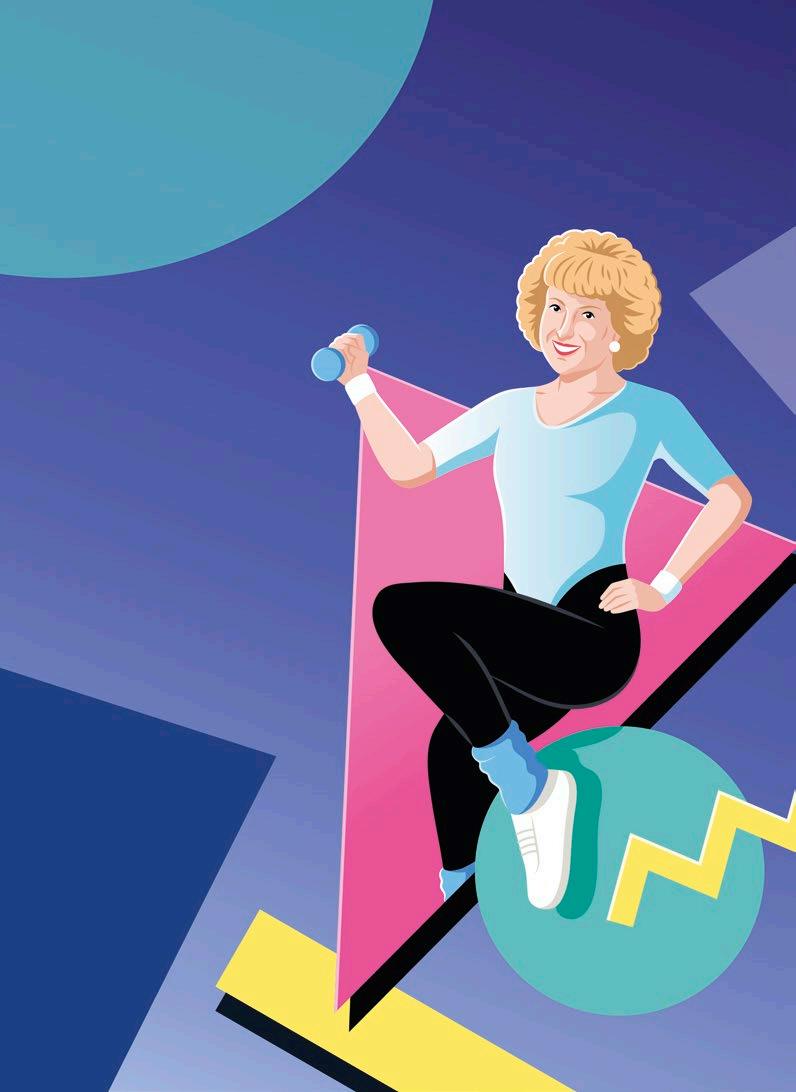
JANUARY 2023 JANUARY 2023 £3.99 readersdigest.co.uk HEALTH • MONEY • TRAVEL • RECIPES • CULTURE • REAL STORIES WIN! 7 BIG PRIZES FOR THE NEW YEAR On Becoming The Queen Of Fitness ROSEMARY CONLEY ROD STEWART The Riotous Rock Star Lets It All Hang Out 7 ImmunityBoosting Tips For Winter


daylightcompany.com Better light improves your life. Enjoy what you love, without straining your eyes.
Electra
FLOOR LAMP
The
The
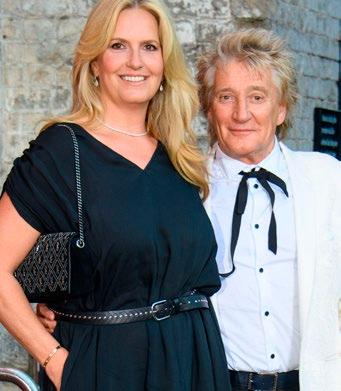

IN ANTIGUA
Unearthing the local wildlife (and nightlife) helps one traveller to reset in the Caribbean
Contents JANUARY 2023 JANUARY 2023 • 1 14 IT’S A MANN’S WORLD
Mann
new enemy— local planning applications ENTERTAINMENT 18 INTERVIEW: ROD STEWART
Olly
faces a
riotous
singing
77 26 “I REMEMBER”: ROSEMARY CONLEY
rock star on football fandom, menopause and
"Hot Legs" at
diet
club and Dancing on Ice HEALTH 34 BOOST YOUR IMMUNITY Stop catching constant bugs with these diet and lifestyle tweaks 42 HOARDING DISORDER Why the rising cost-of-living is triggering hoarders 60 BETWEEN LIFE AND DEATH What is it like to be in a coma? INSPIRE 80 NO MORE FAKE NEWS Journalism network Bellingcat on fighting disinformation Features 86 BUILDING RESILIENCE
how well
cope
hardship
how long you will live? TRAVEL 96 PUPPETS OF PALERMO
traditional
evolving
102 UNPLUGGING
guru on her first weight loss
Could
you
with
really predict
Sicily's
puppeteers reflect on the
art form
cover illustration by Eliot Wyatt p102 p18









HOW TO PLAY: readersdigestdreamcar.com Win a brand new car, take the cash prize alternative, or win Dream Car competition credit in the Reader’s Digest and BOTB Dream Car competition. There are over 150 new car prizes to choose from and the closest person in the skilled spot the ball game wins the car or a life-changing amount of cash! Full terms can be viewed at readersdigestdreamcar.com We have partnered with BOTB to launch our Dream Car competition o ering you the chance to win a brand new car of your dreams for only a fraction of the cost, whether you fancy driving around in a Ford Focus RS or see yourself as James Bond in an Aston Martin, the choice is yours! If you don’t want to take the car you will be o ered a cash prize alternative. Select your tickets from over 150 cars, with tickets starting at 80p Play our skilled Spot the Ball game Get closest position to our panel of judges to win a car or a life-changing amount of cash Other entrants will win runners-up prizes and credits Play today at readersdigestdreamcar.com WIN! A BRAND NEW CAR

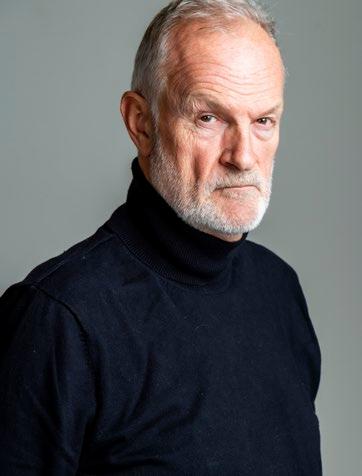
JANUARY 2023 • 3 5 Editor's Letter 6 Over to You 10 See the World Differently HEALTH 50 Advice: Susannah Hickling 54 Column: Dr Max Pemberton 58 Memory: Jonathan Hancock DATING & RELATIONSHIPS 64 Column: Monica Karpinski INSPIRE 68 If I Ruled the World: Clive Mantle TRAVEL & ADVENTURE 72 My Britain: Cheddar Gorge 112 My Great Escape 114 Hidden Gems: Chioggia MONEY 118 Column: Andy Webb PETS 124 Cutting back on pet care costs HOME 126 All you need to know about doormat care FOOD & DRINK 130 How to boil water (the right way) ENTERTAINMENT 134 January's Cultural Highlights BOOKS 138 January Fiction: James Walton’s Recommended Reads 143 Books That Changed My Life: C K McDonnell TECHNOLOGY 144 Column: James O’Malley FUN & GAMES 146 You Couldn’t Make It Up 149 Word Power 152 Brain Teasers 156 Laugh! 159 Beat the Cartoonist 160 Good News In every issue p68 Contents JANUARY 2023
EDITOR-IN-CHIEF Eva Mackevic
EDITORIAL ASSISTANT Becca Inglis
JUNIOR EDITOR Alice Gawthrop
ART DIRECTOR Richard Cooke
HEAD OF FINANCE Santwana Singh
FINANCE MANAGER Irving Efren
PRINT ADVERTISING Keir McCumiskey
INSERTS & DIGITAL ADVERTISING Jigs Pankhania
COMMERCIAL PARTNERSHIPS Beth Bayliss
MANAGING DIRECTOR Julie Leach
CHAIRMAN Steve Wilkie
TRUSTED MEDIA BRANDS INC (USA)
President and Chief Executive Officer
Bonnie Kintzer
Editor-in-Chief, International Magazines
Bonnie Munday
WRITE TO US! SEND US YOUR STORIES, JOKES AND LETTERS OR VISIT OUR WEBSITE
For all subscriber enquiries, please use the customer services number below
WE PAY...
£50 for the star letter and £30 for regular letters. Email readersletters@readers digest.co.uk or go to readers digest.co.uk/contact-us
WE ALSO PAY...
£30 for the true stories, anecdotes, jokes in Laugh! and You Couldn’t Make It Up…, and contributions to end-ofarticle fillers and My Great Escape Email excerpts@readersdigest.co.uk or go to readersdigest.co.uk/contact-us
SORRY!
We cannot acknowledge or return unpublished items or unsolicited article-length manuscripts. Do not send SAEs. Article-length stories, poetry and cartoons are not requested.

CUSTOMER SERVICES
Contact Customer Services for renewals, gifts, address changes, payments, account information and all other enquiries. Call 0330 333 2220* or email customer_service@readersdigest.co.uk
TALKING MAGAZINES
Reader’s Digest is also available in audio and accessible etext editions from RNIB Newsagent, for blind and partially sighted readers. Call the RNIB Helpline on 0303 123 9999 or visit rnib.org.uk/newsagent
SUBSCRIPTIONS
Annual subscriptions are available to be delivered monthly direct to your door. For our latest offers please visit readersdigest.co.uk/subscribe Or telephone us today on 01778 392461. Gift subscriptions also available. UK rates may vary. Overseas rates: Republic of Ireland £45, Europe £50 and Rest of the World £60 for 12 month subscription.
SMALL PRINT: Ensure submissions are not previously published. Include your name, email, address and daytime phone number with all correspondence. We may edit letters and use them in all print and electronic media. Contributions used become world copyright of Vivat Direct Ltd (t/a Reader’s Digest). Reader’s Digest is a member of the Independent Press Standards Organisation (which regulates the UK’s magazine and newspaper industry). We abide by the Editors’ Code of Practice and are committed to upholding the highest standards of journalism. If you think that we have not met those standards, please contact 0203 795 8886. If we are unable to resolve your complaint, or if you would like more information about IPSO or the Editors’ Code, contact IPSO on 0300 123 2220 or visit ipso.co.uk
PAPER FROM SUSTAINABLE FORESTS. PLEASE RECYCLE © 2017 Vivat Direct Ltd (t/a Reader’s Digest). British Reader’s Digest is published by Vivat Direct Ltd. All rights reserved throughout the world. Reproduction in any manner, in whole or part, in English or other languages, is prohibited. Reader’s Digest is a trademark owned and under license from Trusted Media Brands, Inc, and is registered with the United States Patent and Trademark Office. All rights reserved. Printed by Warners Midlands PLC. Newstrade distribution by Seymour Distribution Limited.
than
national rate
number
free
minutes
type
line
mobile, BT
other fixed line
*Calls to 03 numbers cost no more
a
call to an 01 or 02
and will be
if you have inclusive
from any
of
including
or
Good Time TakeThings
For many of us, the beginning of a new year comes with the ubiquitous pressure to “start afresh” and draw up a list of life-changing resolutions. Fuelled by perceived shortcomings of last year, we decide to learn a new language, work out seven times a week, read 100 pages every day and never eat carbs again. It’s no wonder that when we fail to keep these resolutions, we end up feeling worse than when we started. And after a year of uncertainty and commotion, it’s the last thing we need. Good things take time. In this issue, we invite you to start small, practise gratitude and focus on attainable goals. Why not address something that’s right in front of you? On p126, we explain how to revive that long-neglected doormat of yours, while on p130 Tamar Adler brings us back to basics with a guide to… boiling water (trust us, it’s an art form). On p34, we break down the small steps to boosting your immune system, and Dr Max reminds us of the healing powers of something as simple as human touch on p54. Life truly is in the details.
eva mackevic Editor-in-Chief


Follow Us

JANUARY 2023 • 5 Eva EDITOR’S LETTER
You can also sign up to our newsletter at readersdigest.co.uk Reader’sDigestis published in 23 editions in 10 languages facebook.com/readersdigestuk twitter.com/readersdigestuk @readersdigest_uk
Over To You
LETTERS ON THE November ISSUE
We pay £50 for Letter of the Month and £30 for all others
LETTER OF THE MONTH
ALL ABOARD!
offering to bring us fresh croissants in the morning.

Chris Moore’s article on nude cruising brought back fond memories of our honeymoon at a naturist resort in the south of France. We were both naturism newbies, but any initial nerves evaporated on arrival. A naked receptionist welcomed us to our “non-textile” holiday. “No clothes,” she elaborated and beamed. We smiled back, feeling a very different sort of overdressed.
Our delightful cabin had its own patio with barbecue. We stripped off and unpacked (mainly towels and gallons of suntan lotion). A knock at the door sent me scurrying for a bath towel. My husband instinctively hid behind the door as he opened it and peered gingerly outside. There stood a completely starkers delivery man

After our giggles subsided, we explored the resort on bikes with well-padded saddles. Naked cycling— another unexpected box ticked. In the on-site supermarket, we browsed the aisles au naturel for baguettes, pâté and wine, making a quick dash through the frozen food section.
In the evening, we dined al fresco with our naturist neighbours from Scarborough, both of whom wore T-shirts and nothing else. It’s known as the “Donald Duck” look, they told us.
By day we strolled on the beach, lounged in a huge outdoor jacuzzi and power-walked against jets of water in a zigzagging exercise pool. Our naturist break was a truly liberating experience where all stresses and worries were abandoned along with our clothes.
Mary Ross, Essex
6 • JANUARY 2023 Send letters to readersletters@readersdigest.co.uk Include your full name, address, email and daytime phone number. We may edit letters and use them in all print and electronic media WE WANT TO HEAR FROM YOU! INSPIRE Why naturist sailing is the most stressfree holiday you will ever experience Royal Clipper Sailing into Kotor,
Rocking The Boat
Magnetic Hobbies
It was a joy to read the article “That’s My Lot” by Olly Mann. It inspired and sparked my interest in fridge magnets. Come to think of it, they are quite underrated yet play an important part for many of us. Just like a bookshelf, they reveal a little story about their owner. I love that!
Although it led me to one question: how did the fridge magnet phenomenon start? To quench my curiosity I turned to Google for answers and learned that fridge magnets actually began as guides / instructions for the fridges when they were first invented. Great beer quiz trivia knowledge, I suppose. My fridge is currently adorned with binder clip magnets— I use them to hang up post cards and rotate my decor with seasonal trinkets (Jack-o’-lantern-shaped bells for Halloween)!
When I read “That’s My Lot”, it made me smile. From rare coins and autographs to vintage comic books and valuable documents, these are the things people collect, and collectors carefully acquire and catalogue a wide variety of items.
Hobbyists often see collecting as an enjoyable way to spend their free time. I know I do. Some, however, may be motivated by the investment value. I know I’m not. Others do it for the sheer love—or obsession—for the items that they collect.

I collect Thelwell Horses. I have 44 and I’m still looking for more and feel joy when I find one! My mother collects “owl” ornaments. My aunt “elephant” ones. My nephew, rare coins. My foster daughter, pebbles from beaches she has visited in the past.
Apparently, Freudian psychologists believe that collecting is a way of imposed order in the world. Those who collect may have suffered abandonment issues when they were children, or feel that they lack control over their own lives. By gathering and curating objects, they can reverse that feeling somewhat. This may be the case for some, but for others, it’s just a hobby. There’s absolutely nothing wrong with that. And Olly should know I have 68 magnets on my fridge, beating his total of 57!
Caroline Strannhage, Fife
This was a lovely read. Thank you.
Geraldine Burton, Clwyd
JANUARY 2023 • 7 READER’S DIGEST
A Lean Christmas
“Can You Afford This Christmas?” was a thought-provoking feature and it made a lot of sense.
Walking into stores in midSeptember you are confronted with Christmas displays. You only go in for groceries and then you are faced with Christmas trees, snowmen, lights, wrapping paper, cards. It's stomachchurning. All you can think of is why they’re ramming Christmas down your throat at this time of the year.
Last year we tried a minimalist Christmas. We drew names out of a hat and bought a gift worth £25—we worried about ruining Christmas, but it went ahead. It was tough where the grandchildren were concerned as everybody wanted to spend more on them but they still got a present each.
This year, however, family members have been backing out one by one so it obviously didn't go as well as we thought it had. However, I've noted all your good advice and feel if we stick to it, we will not go over the top as so many families do and then regret it when they see January's bank statement. Thanks to you I'll be prioritising, planning, refraining from borrowing and giving what I can afford.
Against The Odds
As the parent of a disabled child, Abby Alten Schwartz’s article on her daughter’s cystic fibrosis dredged up a whole host of emotions for me. I think anyone caring for a child who has profound life-limiting challenges will agree that we find immense joy in the everyday milestones that many parents take for granted. While other parents are proudly boasting about their child’s dance awards or swimming badges (and rightly so!) parents like myself and Abby have much more humble hopes for their child’s future.

 Amie Yardley, Cambridgeshire
Amie Yardley, Cambridgeshire
My son has faced numerous challenges throughout his life after a traumatic birth and his speech, sensory perception and both gross and fine motor skills have been affected. He has worked incredibly hard on his speech and is now confident enough in his abilities to volunteer to narrate the school nativity play this year. It could be scientific developments, new approaches to therapy or sheer determination and hard work that make the difference to a disabled young person’s life and help them reach their full potential, but what makes it special for parents is seeing their child’s strength and knowing that each achievement conquered is a win against the challenges they have faced. Sharon Milligan
OVER TO YOU For years, feared for my child’s life. Then science did something amazing for people with cystic fibrosis Abby Alten Schwartz I Can Just Be Her Mum Jim Wright HEALTH
IT'S ROBIN CALLING

Here I am standing in the rain, getting quite wet through. And I hear you say, “Well, if it isn't him again.”
The window opens and raisins appear, it's about time I say, and let's make this very clear.
I always sing your favourite song not just at breakfast time, but nearly all day long.
So when I'm standing all alone, can you try and be quick? I need to see the missus back home!
Your raisins are delicious, I want more. And remember I have a family to feed, that's something I can't ignore.
Now here's Mr Black looking for a treat. If he comes near my raisins, I'll peck his big brown feet!
Anne Palmer,
Derby
Jacket Potato
Jacket potato with butter and cheese—
It doesn’t take much to keep me pleased.
A smile on my face and one in my belly,
As I sip on my tea watching the telly.
These are the things that make me smile,
As I sit in and watch the world transpire.
Where will change happen? What will this mean?
I try to make sense of the things I’ve seen.
Today I’m living— living the dream
It consists of jacket potato with butter and cheese.
Kelly Dunford
Want to see your poem published in Reader’s Digest?
Whether you’re a seasoned poet or just getting started, we’d love to see your work! Email us at readersletters@readersdigest.co.uk. Include your full name, address and the title of the poem. We’ll pay £30 for every published piece
JANUARY 2023 • 9
READER’S DIGEST

PHoto: © AFP vi A Getty i m AG es/ mi CHA e L 10
turn the page


SEE THE WORLD...

Foto: © AFP vi A Getty i m AG es
…DIFFERENTLY
In Appenzell, Switzerland, people celebrate the turn of the year twice. Once according to the Gregorian calendar on December 31, and a second time according to the Julian calendar on January 13. During the so-called Silvesterchlausen, people go from house to house on both dates in the villages and small towns of the Swiss canton of Appenzell Ausserrhoden, wishing the inhabitants a happy new year. The “schöne Chläus” wear elaboratelydecorated homemade headdresses depicting scenes from rural life.

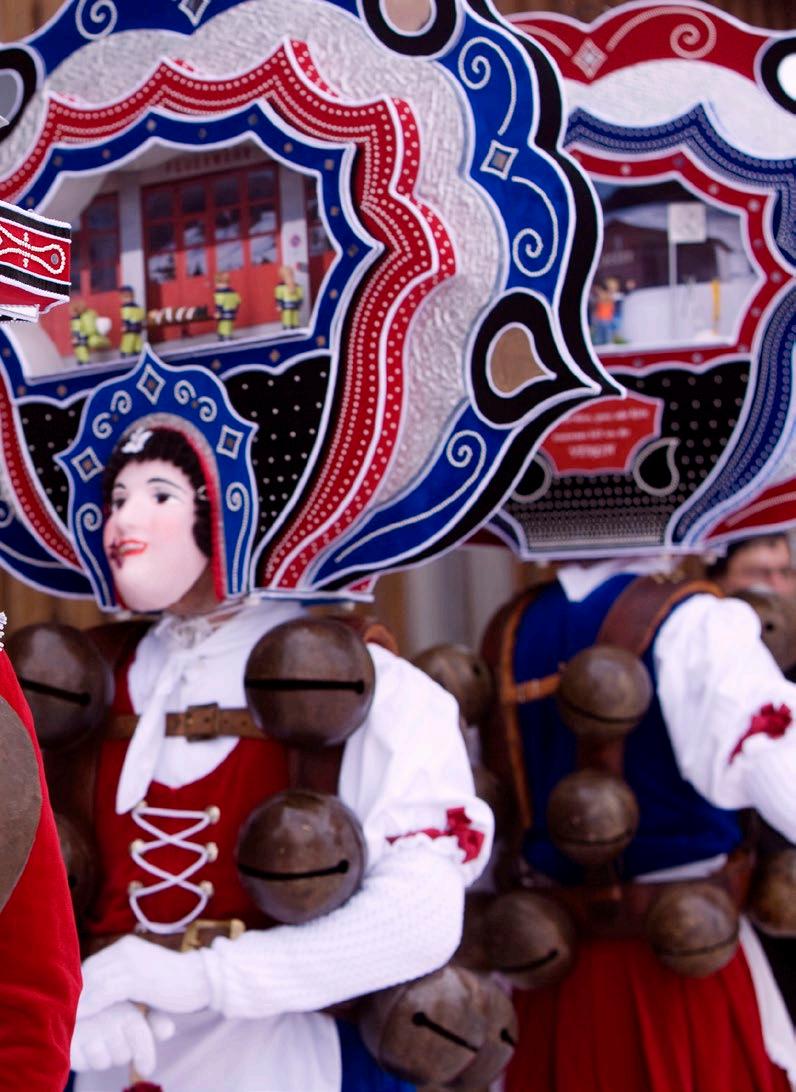
13

My Back Yard Not In
Olly Mann squares up to a new enemy—planning applications in his neighbourhood

Olly Mann presents Four Thought for BBC Radio 4, and the podcasts The Modern Mann, The Week Unwrapped and The Retrospectors
Ithink I might be a NIMBY. This is rather hard for me to accept, because that acronym (Not In My Back Yard) is typically used as a slur; a pejorative label deployed to smear someone as selfish and two-faced. I even recall when I first heard the word—in a school geography class, some 30 years ago.
The way my teacher explained, it was that UK property developers are frequently frustrated by hypocritical homeowners, who claim to be in favour of progress (new housing, wind farms, whatever), but then vociferously object when actual proposals emerge to develop such things in their postcodes. How parsimonious, I thought! How self-centred!
As a young adult I lived in London, so never had cause to revise my opinion. Planning disputes were something I encountered only as a sidebar in the Evening Standard: a rock star wanting to build a swimming pool in their cellar, or a corporation applying to erect
illustration by Dom McKenzie JANUARY 2023 • 15
an even taller skyscraper than the one across the street. Nothing that affected me, nor gave me cause for soul-searching.
But then I moved to the green belt. Our three-bed semi—the first house I bought, and the one I intend to still call home when I die—is surrounded by fields and situated in the first Hertfordshire village you come to as you head out of London up the A1.
THE FACT THAT IT
endless tedious suburbs of Greater London and hit upon this oasis of green and calm and charm—and it felt like magic. Thanks to protective planning regulations devised decades ago, here was a place where an authentic rural identity had been kept alive: the quiet beauty of the shrubs, the horses, the hay bales, the spinney. We were seduced.
We could, of course, have headed perhaps 40 minutes further north,
MIGHT ONE DAY BE DEMOLISHED AND TURNED TO CONCRETE IS WHAT MAKES IT MOST SPECIAL
It is, in some ways, an undesirable place to live. It is poorly served by public transport, the school is clearly cash-strapped and the community spirit is less enthusiastic than in the satellite towns and cities, which (perhaps due to being an inch further away from London) seem more confident in their identities.
But, as I say, we are surrounded by fields. Look out the front of my gaff and there is green space as far as the eye can see—well, until your gaze hits the blurry buzz of the M25, humming away in the far distance. Look out the back, and you see nothing man-made at all, unless the farmer is taking out his combine harvester.
The view was the reason we bought here. It is the only reason we bought here. We drove through the
and settled upon another similarlooking village with less existential threat of being swallowed up by the metropolis. But then, that wouldn’t be the same at all, would it? Our village’s proximity to London is the precise thing that elevates it above and beyond its aesthetically attractive qualities; the fact that it might one day be demolished and turned to concrete is what makes it most special. It’s not just a place you live in. It’s a place you feel an urge to protect.
Back in the mid-20th century, there were two large mental hospitals bookending the village, located here to offer refuge and respite to troubled Londoners, who could come and breathe country air while remaining near their
16 • JANUARY 2023 IT’S A MANN’S WORLD
relatives. This land has since been developed into housing estates, but I (romantically) reckon their environs still offer mental support to people who feel oppressed by life in the capital’s sprawl. Travel just five miles out of the ‘burbs, and you can traverse our pretty footpaths and be among the sheep, the woodland and the chestnut trees. Green belt countryside isn’t just for those of us who live in it and the animals who depend on it; it makes an ongoing health contribution to citydwellers too.
Yet the planning applications come thick and fast. On a seemingly weekly basis, some leaflet drops through my door from local campaigners protesting 177 houses here, 231 houses there, a new "garden village" in our nexus, a "residential community" on the meadow, each application abandoning prior commitments to preservation or biodiversity. I always sigh, put these "NIMBY" flyers on
our kitchen table, and attempt to appraise them properly, rather than just write a knee-jerk complaint to the council. After all, new houses need to be built somewhere, right? Perhaps this next proposal… isn’t too bad?
And if we didn’t live where we do, these plans wouldn’t upset me. It’s because of their intention to build so close to my property—In My Back Yard—that I’m so acutely aware of the irreversible changes that such developments would bring with them. So, I inevitably add my signature to the protests.
It’s because it’s In My Back Yard that I understand what the exact impact would be of hundreds more cars, more unaffordable homes and increased pressure on local services.
It’s because it’s In My Back Yard that I fight to maintain the appeal of the home we bought; not solely for us, but so that its future occupants might feel as happy as we do.
What’s so ignoble about that? n
The Great British Curry
There are more curry houses in London than in India's most populous city, Mumbai
An average Brit spends £30,000 on curry in one lifetime
Chicken tikka masala was invented in Britain (in a Glaswegian restaurant)
Source: curryculture.co.uk, britishheritage.com
JANUARY 2023 • 17 READER’S DIGEST
Sir Rod Stewart
“Why
I Don’t Feel Awkward Singing About Sex”
By Jonathan Dean
The singer, 77, is campaigning about menopause, helping Ukrainians, and has turned down a fat cheque to play in Qatar—but he hasn’t lost his cheeky sense of humour
Rod Stewart is at home in his Essex mansion, beaming in a cardigan and a Celtic FC necklace. His spiky hair is as you would expect and takes just moments to perfect. Apply product, dry upside down, add wax. I spot some model trains and ask if they are part of his famous replica of a 1940s US city.
“Oh, that’s over yonder,” he says in full rasp, pointing to another part of his home. I call it a train set, and he interrupts. “I get offended if you call it a train set. It’s a scale model railroad, if you please.” But it started as a train set? “Yes,” he says, smiling. He began collecting as a boy in Highgate in the 1950s. “I wanted a
station,” he says. “But Dad bought me a guitar.” And here we are. You can catch him on tour in the UK until late December 2022. He plays all the hits you would want from his years with Faces and his epic solo career. Are there any old songs that make him feel… “Awkward?” Exactly. “No. I went through a brief period of thinking I’m not going to sing ‘Hot Legs’, because it is a sex song, but what do I finish with? ‘Hot Legs’. And people love it. There is nothing I feel uncomfortable singing.”
I believe him—although few 77-year-olds would dare to sing about cavorting with a schoolgirl
ENTERTAINMENT DAVID FISHER/SHUTTERSTOCK 18 • JANUARY 2023

19

and, maybe, her mother. His latest album even has the line “The sex was immense”. But this is who Stewart is: an entertainer who is as open and authentic as his voice is distinctive. His charm is a superpower that means, unlike some of his peers, if you google “Rod Stewart cancelled” it is simply a list of gigs postponed due to COVID.
Have his tours calmed down since the days when he lost count of how many women he had slept with?
“They’re not as wild as they were,” he says. “In the old days, it was all sleeping around and drinking, but you can’t carry on like that. I haven’t joined the pipe-and-slippers club yet, but I have to look after my voice.” How
does he keep fit enough to perform?
“I work out three times a week. I do underwater swimming to improve my breath control. You know who told me about that? Frank Sinatra.” It’s a far cry from, as he confessed in an autobiography, taking cocaine anally to protect his voice.
There is not a generation that does not love Stewart. I am 42 and his music soundtracked my childhood car journeys. His first single came out when my mum was 11. I ask if his audiences have got any younger.
“We just did three months out in the US and it was younger than I’ve ever seen,” he says. “Unless the promoter pushed all the young girls down the front to keep me happy.” And, given
20 • JANUARY 2023
ZUMA PRESS, INC. / ALAMY STOCK PHOTO
Rod Stewart performs at Ruoff Music Centre in Noblesville, Indiana
Rod in 1964

“I DON’T KNOW WHY WE WENT INTO BREXIT— NOBODY THOUGHT OF MUSIC WHEN WE DID THAT”
his wealth, he must really want to tour—surely he has no need to? “Well, I’ve got eight children.”
The man is a blast. Irreverence from a bygone age mixed with a shot of empathy. For someone worth £300 million, he knows how hard it is for other people now. “Nobody’s got the money,” he says with a sigh. “Usually my tours are sold out, but one in Aberdeen has nearly 1,000 tickets for sale. I shouldn’t admit it, but I’ve no ego.” It is all part of a touring system broken by Brexit, he says, that
is making life very hard for young artists in particular. “I don’t know why we went into Brexit,” he says. “I thought we were OK. Nobody ever thought of music when we did that.” Is he optimistic about the industry’s future? “I find it very difficult. Kids just can’t break through.” Suddenly his eyes light up. He grabs his phone. “I’ve heard the best f***ing soul singer!” He presses play. A voice comes on crooning “A Change Is Gonna Come”. Stewart bursts out laughing at how good it is.
JANUARY 2023 • 21
READER’S DIGEST
PICTORIAL PRESS LTD / ALAMY STOCK PHOTO

“THEY GIVE YOU A KNIGHTHOOD BECAUSE OF WHAT YOU HAVE DONE, BUT I DON’T WANT TO REST”
“They’re called the Vintage Explosion,” he says. “Listen to that!” He’s talking about a little-known seven-piece Scottish R’n’B covers band. Eventually he turns it off, still staggered by how good the singer is. “Will you give them a mention? That’s how we help small bands. He’s probably got the best whitesoul voice I have heard since Frankie Miller.” Does the band know about his love for them? “No, I only heard it an hour ago,” (later I break the news of this celebrity endorsement to the Vintage Explosion. “I am absolutely
flabbergasted,” says the lead singer, Will, 42. “Flabbergasted times 1,000”).
Stewart is joined on tour by Johnny Mac & The Faithful, a folk and rock band fronted by one of his best friends, John McLoughlin, 55. They share a love of Celtic and pubs—and Stewart sings on the track “Me Oh My” on Johnny Mac & The Faithful’s new album, Midnight Glasgow Rodeo. McLoughlin regales me with glorious stories of Stewart in the wild, like the time in Rome when the singer hoisted his jacket up a flagpole outside an upmarket
22 • JANUARY 2023
INTERVIEW: ROD STEWART PA IMAGES / ALAMY STOCK PHOTO

hotel. Mainly, though, their bond is football. If Celtic are playing, McLoughlin stands in the wings to update Stewart on the score. Despite being born in London, the singer enlisted in the Tartan Army because of his parents. Who will Stewart support at the World Cup, given Scotland’s failure to qualify? England? “No, Brazil!” he says, cackling. “I’m the Cockney Scotsman.” Given all the politics surrounding the hosts, Qatar, perhaps this is a good World Cup to miss? “Tell you what, supporters have got to watch out, haven’t they?” I say he could have played “The Killing of Georgie”, about the murder of a gay friend in the 1970s, at the opening
ceremony as a protest. “That would have been good,” he replies. “I was actually offered a lot of money, over $1 million, to play there 15 months ago. I turned it down.” Why? “It’s not right to go.”
This is not his only activism. Often, Stewart comes across as a family man—he talks sweetly about his kids being into The Temptations— with a lot of time on his hands, who wants to put that time to good use. First there were the potholes. In March, he spent a couple of hours filling holes in the road near his house in Harlow that made it hard for his Ferrari to pass. He also saw an ambulance stuck. “So I bought
JANUARY 2023 • 23
(Left) Stewart during a Scottish Premiership match at Celtic Park
England v Scotland
SCOTIA26 / ALAMY STOCK PHOTO
Media Charity Football match, 1999
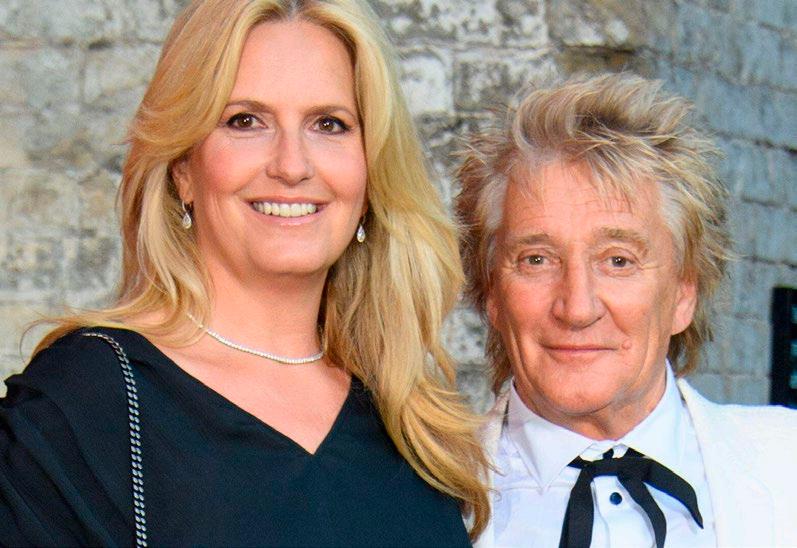
the sand,” he says. “Did it myself.” It got the press he wanted—the road is now retarmacked.
Then he rented a home for a family of seven refugee Ukrainians and gave two of them jobs. A lot of his charity work goes under the radar, but sometimes he wants to lead by example. “I’m a knight,” he explains. Sir Rod arose in 2016. “They give you a knighthood because of what you have done, but I don’t just want to rest. I thought if I make this public, other people might do the same thing. Mick Jagger maybe,” he adds with a mischievous smile.
Third in the list of how to grow old gracefully is Stewart’s interest in HRT. His wife of 15 years, Penny Lancaster,
51, was struggling with menopause, so he found out more about it and, in April, backed her Menopause Mandate campaign to raise awareness. “I hadn’t seen [the menopause] before because my marriages didn’t last that long [Alana Stewart was 39 and Rachel Hunter 37 when they and Stewart divorced], so Penny was the first. She would get into blinding fits of rage. One night she threw utensils, so me and the boys gave her a hug and since then she’s worked to let people know what it is. Men have to understand and not just go down the pub.”
Stewart remains a man visibly excited by life, even though times can be hard. His brother Don
24 • JANUARY 2023
MATT CROSSICK / ALAMY STOCK PHOTO
With wife Penny Lancaster at the Sun’s Who Cares Wins Awards, 2021
Queen Elizabeth II greets Penny Lancaster and Rod Stewart during a reception for the Royal National Institute for the Blind, 2013

“I HAVE NO SKELETONS IN THE CLOSET, AS FAR AS I KNOW”
died in September, aged 94, a few days before the Queen, who the singer met many times (“she liked ‘Sailing’”). After appearing on a reality show, his wife Penny joined the City of London Police as a volunteer special constable and was on duty during the monarch’s funeral. “She burst into tears,” Stewart says. “She was within touching distance of the coffin.” Stewart is never more animated than when enthusing about his wife’s new job—he worries when she is out on the beat and she texts him when she is running late. “Darling, go to bed,” she says.
Stewart’s inevitable biopic will be a riot. “I keep getting offers,” he complains. “But I’ll be the last to do it—even Robbie Williams has one now.” Will he let all the sex, drugs and rock ’n’ roll hang out? “Yeah, I have no skeletons in the closet, as far as I know. I just wish someone would make one before I kick the bucket.” What will he call it? They tend to name it after a song—so how about Some Guys Have All the Luck ? “That would be lovely.” n
Jonathan Dean / The Sunday Times / The Interview People
JANUARY 2023 • 25 READER’S DIGEST
Xxxx
PA IMAGES / ALAMY STOCK PHOTO

ITV/SHUTTERSTOCK
Rosemary Conley I REMEMBER…
ENTERTAINMENT
Rosemary on DancingOnIce in 2012
Rosemary, aged 20, being photographed for her first modelling job in Leicester

Rosemary Conley, 76, is one of Britain’s most celebrated diet and health experts with a career spanning half a century. Her 1988 book The Hip and Thigh Diet has sold over 2 million copies to date and she continues to write about nutrition, immunity and fitness
27

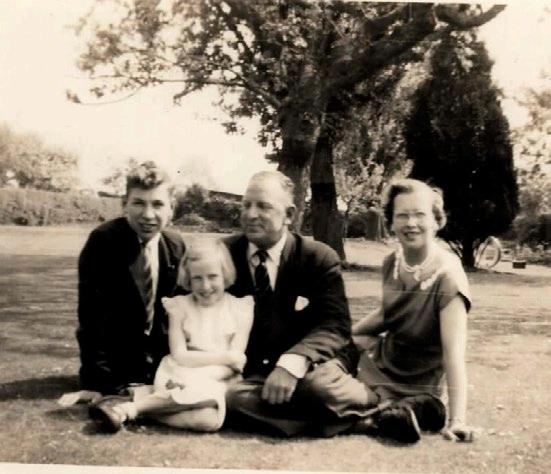
ANIMALS WERE A HUGE PART OF MY CHILDHOOD. I had very severe asthma when I was little and I couldn’t run around with the energy that the other children at my school had. My best friend was a Sheltie dog called Sue. I would put her in my pram and find things in the shed which I would train her to jump over like a showjumper! I’ve had dogs in my life ever since.

WHEN I WAS ABOUT 22 I KNEW I HAD TO DO SOMETHING ABOUT MY WEIGHT. I’d done a Cordon Bleu cookery course and I couldn’t stop eating all the delicious dishes I was making. Then I was eating whole tubs of ice cream too, and even cooking chocolate—which tastes horrible by itself! I had a very dear friend who told me, “You would look so lovely if you lost a few pounds.”
(Clockwise from top left) Rosemary in the garden of her family home in Countesthorpe, Leicestershire, aged two; Rosemary with her brother Robert, and her parents in the garden in Countesthorpe; Pictured with Sheba the dog; Rosemary, aged 18, attending the Good Grooming course at night school with Tutor Kathy Parker in 1964; Rosemary with her daughter Dawn, just a week old, in 1975; Dawn aged 18 months with Beauty the dog
28


Since then I’ve had people on social media claim that I was fat-shamed, but I can assure you I wasn’t. What she told me was said with immense love and kindness. Having someone tell me they could see beyond my weight and compliment me was a hugely motivational thing which I’ve never forgotten.
MY VERY FIRST CLUB, which I called “Slimming and Good Grooming” started in 1972 in Thurnby in Leicestershire. I put up 30 posters and got 29 women who came to my class which I held in the village hall. It was all very DIY and I remember weighing the women on bathroom scales. I focused on the fact that you could lose weight while still eating 1,400 calories a day, which was more than Weight
Watchers were advising at the time. One member lost 11 pounds in a week, so to see the results happen so quickly was such a validation. It was then that I quit my job as a secretary and began to make my clubs and classes my full-time living.
I BECAME PREGNANT WITH MY DAUGHTER DAWN WITH MY FIRST HUSBAND PHIL IN 1975.
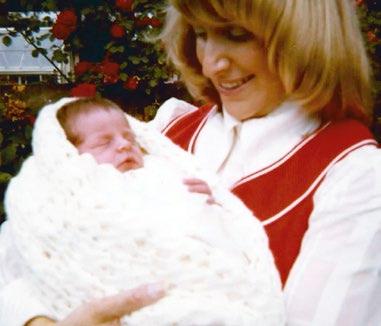

(Above) Mike and Rosemary on Bondi Beach during Rosemary’s Australian book tour in 1988; Mike and Rosemary’s first home together—the Old Parsonage in Mountsorrel, Leicestershire, in 1983; German Shepherd Nik and one of her pups, Sheba; The sequel to Rosemary’s original HipandThighDiet book. This follow-up book went on to sell 2 million copies worldwide
I remember so clearly not having the slightest idea I was pregnant at all. I just thought I didn’t feel well. When I went to the doctor and he ran some tests he told me that they “came back positive’.” I had to ask him what on earth positive even meant!
I REMEMBER SO CLEARLY MEETING MY NOW-HUSBAND MIKE while I was on a pony trekking holiday in the Brecon Beacons in

May 1983. What struck me immediately wasn’t just how good looking he was, it was that he told me he had never ridden a pony before in his life! I adore horse riding but I simply had never seen someone who was such a complete natural in the saddle. I couldn’t help but be impressed by this man and we went on our first date just a few days after the trek.
I OFTEN TELL PEOPLE THAT MY STORY WAS AN OVERNIGHT SUCCESS THAT TOOK 17 YEARS! My breakthrough was writing The Hip and Thigh Diet in 1988 and then the follow up The Complete Hip And Thigh Diet . The second book sold 460,000 copies in the first six weeks and it triggered an absolute whirlwind of travel; on one tour I
30 • JANUARY 2023


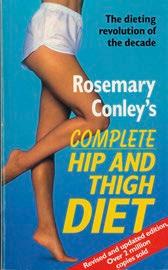
THE MOST EXCITING THING I’VE EVER DONE IN MY LIFE WAS APPEARING ON DANCING ON ICE
.
, think I took 18 flights and stayed in nine different hotels. Not everyone was thrilled though; I remember having one really irate dairy farmer shouting at me on a radio phone during a show in Australia who was furious that I was telling listeners not to eat butter. The DJ backed me up but these days I don’t think I would advise dieters to cut out butter completely.
The best part about it was having Mark Hanretty as my dance partner. The first time I saw this gorgeous, 20-something man, there was this
immense chemistry. I think you have to have that connection with your dance partner or it will be a disaster on the ice. The combination of my perseverance and his patience got us far further in the show than we ever thought we could. I’ll never forget him lifting me up on the ice and telling me, “You’re so light.” I think that’s a phrase that every woman in the world wants to hear!
I EMBRACED CHRISTIANITY IN 1986 when I was waiting to have an operation to remove gallstones. I was having a bit of a rotten time then as Mike and I were having a break from each other and my business was going through a difficult period. I
JANUARY 2023 • 31
Rosemary receiving her CBE at Buckingham Palace in 2004, accompanied by daughter Dawn, husband Mike and mother-in-law Jeanne

remember reading a book called Power for Living while waiting for my appointment. It was the first time that I really felt I was reading about God in a way that made sense to me. That night I prayed to let the Lord into my life. There were no claps of thunder but I went to sleep and woke up feeling utterly cleansed and like a new person. God then told me that, despite Mike and I being on a break, we should get married so I actually proposed to him over dinner a few nights later. I now call God “the Chairman” of my life.
STEPS IS A SMALL CHARITY
WHICH I’M THE PATRON AND TRUSTEE OF IN LEICESTERSHIRE. It works with children from birth to the age of five who have motor
disorders like cerebral palsy. Turning a former school into the centre for Steps in 2007 was definitely the most rewarding thing I’ve ever done. It was a real “Challenge Anneka” makeover where we had the cameras from Central TV in the Midlands following us as we got 130 different companies to chip in and help. I was cooking for the troops and set up “Rosie’s Larder”to feed everyone working on the job. The centre is still there today and we still rely entirely on donations. We need around £250,000 a year to keep going but people’s generosity is amazing; we received £20,000 just yesterday from someone who had left us in their will.
GETTING A CBE AT BUCKINGHAM PALACE WAS AN INCREDIBLE MOMENT but it was almost a
32 • JANUARY 2023
Rosemary enjoying a workout with a crowd of women

disaster as I fell down the stairs after going to the bathroom moments before receiving the honour! Not only that, but the etiquette demands that, once you have received the award, you have to walk backwards for a couple of paces before turning and leaving the room. I always wear high heels, so I’ll never forget how hard I had to concentrate on making sure I
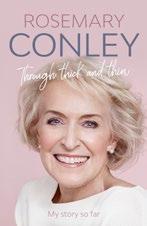

did the small walk backwards away from Prince Charles without toppling over!” n
As told to Rob Crossan Between Thick And Thin: My Story So Far by Rosemary Conley is published by SPCK Publishing (£19.99) All proceeds from the book will go to Steps, the charity for which Rosemary is patron. To donate and find out more go to stepscentre.org.uk
Getting Lippy
The first lip paint was worn around 3500 BCE by Queen Schub-ad of Ur, an ancient Mesopotamian city. It was made with white lead and crushed gemstones
source: daily.jstor.org
JANUARY 2023 • 33

HEALTH
IMMUNE SYSTEM BOOST
photo-illo-credit-gutter SEVEN SCIENCE-BACKED SOLUTIONS TO HELP YOU FEEL YOUR BEST by Lisa Bendall with additional research from Lorraine Shah illustrations by Ryan
Snook
photo (woman) by chris robinson JANUARY 2023 • 35
YOUR

Sachin Oza always seemed to catch whatever cold and flu germs were flying around. Despite being only in his mid-thirties, he felt out of shape and out of sorts. He realised that if he didn’t make some changes, his immune function would continue worsening with age. “I have a family background of diabetes, high cholesterol, and heart disease,” says Oza. “I had to take action.”
But Oza’s lifestyle stood in the way. He clocked long days working in finance in London, with little opportunity to be active or focus on his wellbeing. His commute from his home in Orpington, Kent, to the office was stressful and time-consuming, and he was spending far too many hours stuck behind his desk.
Oza’s increasingly sedentary lifestyle had repercussions. In addition to
catching bugs easily, he didn’t sleep well, his body ached, and he felt lethargic. “My immune system was really weak,” recalls Oza. “I knew that I shouldn’t be feeling this way before even hitting 40.”
So began a 15-year journey to overhaul his health. He implemented some changes to his diet, introducing more raw fruits and vegetables and cutting down on junk food. He started going for runs and began interval training, resistance training, and stretching. He also became interested in mindfulness, practising deepbreathing and meditation.
Now 49, Oza feels like a new man. “I catch colds far less frequently than before,” he says. His aches and pains have eased, his stress levels are lower, and he sleeps soundly. “I no longer wake up in the early hours, which has made a huge difference in how I feel.”
There are many fac TO r S affecting the immune system that we can’t control—ageing weakens our immune function, for example, and we have individual genetic differences that affect how we deal with disease. Malnutrition (from a dwindling appetite or a disorder like coeliac disease) or physical immobility (due to bedrest or a temporary injury) also impair our immunity.
In addition, sometimes a weak immune system is a red flag for more serious medical conditions or other problems that should be looked into
36 • JANUARY 2023 BOOST YOUR IMMUNE SYSTEM
by a doctor. They can include recurring digestive issues, getting unusual illnesses that those close to you don’t catch, having slow-healing scrapes and cuts, and catching new illnesses before you’ve recovered from the previous ones.
Still, Oza has reason to be hopeful that he’ll combat diseases better as he begins his sixth decade. As scientists are discovering, certain lifestyle changes can improve the body’s ability to fight illness and infection.
Our immune function is incredibly complex. “We’re still struggling to understand it,” says Dr Donald Vinh, an infectious disease specialist and medical microbiologist at McGill University’s health centre in Montreal. “We’ve made progress in the last 50 years, but it’s a young field.”
Compared to the cardiovascular system or respiratory function, the human immune system has a plethora of nuts and bolts. These include antibodies, organs, proteins, and enzymes. There are also lymphocytes, a type of white blood cell, which include natural killer cells (these attack infected cells) and memory cells (B and T lymphocytes designed to remember and do battle with a germ if it ever returns). Aspects of our immune system are found throughout our bodies, from our skin to our brains. Even the mucous in our lungs and the acid in our stomachs are part of our body’s defences.
All of these moving parts
complement each other. Some are tools we’re born with, already primed to recognise and attack certain invaders (this is known as innate immunity). Others are instruments for figuring out how to defend against bugs we encounter for the first time, called adaptive immunity.
Because of this complexity, anyone seeking a quick fix or miracle pill is out of luck. “People think they can just boost the immune system as if it were a muscle, but it’s far from that simple,” notes Dr Vinh.
But like any bodily function, immunity works best when we support our general health—and researchers around the world are getting closer to exposing more links between the choices we make and how well our immune systems work. Here are seven practical approaches that are proven to show some results.
TAKE YOUR SHOTS
When it comes to powering up the immune system, vaccines are the most important breakthrough in history. Childhood vaccinations, for instance, have been a key factor in our longer lifespan today. Even before COVID-19, vaccinations against diseases like flu and measles were saving 4 to 5 million lives a year, according to the World Health Organisation. “Vaccines don’t fix all problems, but they’re profoundly
JANUARY 2023 • 37 READER’S DIGEST
effective,” Dr Vinh says.
A vaccine provides a training session for our adaptive immunity, showing it how to fight an invader it’s never seen before. “After the vaccine, you’ll have antibodies already made, so when you see the bug, you’re pre-armed and ready,” Dr Vinh explains, adding that researchers are developing drugs to try to boost innate immunity, as well.
WATCH WHAT YOU EAT
Inflammation, a chemical cascade that’s a critical part of our immune response, also has a dark side. When it’s helping, inflammation traps viruses and bacteria by triggering fluid and swelling. It also aids in healing by calling for a clean-up crew of specialised white blood cells called phagocytes.
But inflammation is also triggered by glucose and fats, and if it’s constant, it can wreak havoc on your body—causing health problems such as diabetes, liver disease, and cardiovascular disease. Refined carbs, like white flour, and sugar-sweetened drinks, have long been linked to higher levels of inflammation in the body.
“Having junk food once in a while isn’t going to impact your health,” says Charlotte Debeugny, a registered nutritionist in Paris. “But if it features consistently in your diet, you’re in danger of it replacing the healthier

foods and nutrients that you need for your immune system.”
Many studies draw a connection between nutrition and immune function. In 2021, Harvard researchers rated the eating habits of almost 600,000 people and found that those whose diets placed the most emphasis on plant-based foods had a 41 per cent lower risk of getting severely ill with COVID-19 compared to those with the worst diets.
Should we use dietary supplements? For most of us, even as we age, a balanced and varied diet gives us most of the nutrients and micronutrients we need. But in rare cases, vitamin deficiencies can interfere with immune function. If you’re vegan, you should take a vitamin B12 supplement, and if you aren’t getting a lot of sun exposure, you may require vitamin D. To determine if you have a deficiency, get a blood test.
PHOTOS: (PLATE, SHOES) ©ISTOCK.COM X2 38 • JANUARY 2023 BOOST YOUR IMMUNE SYSTEM
GET MOVING
It’s been established that people without much mobility, or those who never exercise, have less resistance to bugs. Regular moderate physical activity, on the other hand, optimises immune function. And it doesn’t take much. A US study of almost 50,000 people with COVID-19 infections found that those with inactive lifestyles had a higher risk of hospitalisation, while people who exercised, even a bit, were more likely to get better on their own.
In an experiment published in 2018 by Duke University’s School of Medicine in the state of North Carolina, inactive seniors with rheumatoid arthritis improved their innate immunity and lowered inflammation by adding 30-minute

exercise sessions three times a week. Researchers are looking into why, but in 2021 a paper in Nature revealed a clue, showing that walking and running stimulate the production of B and T lymphocytes in the bones.
Avoid going to extremes, though; some research shows that prolonged, marathon-style physical exertion may disrupt our normal immune function. Aim for ten to 30 minutes of exercise every day to get the immune benefits.
Oza, who today runs an oil and gas company, has built daily activity into his routine. “I now work from home, which makes it much easier to fit exercise into my day,” he says. “I run four times a week.”
DRINK LESS ALCOHOL, AND MORE WATER
Alcohol negatively affects the immune system in a variety of ways, according to the Canadian Centre on Substance Use and Addiction. Excessive drinkers, for example, can have a higher risk of pneumonia and they take longer to recover from injuries and infections. If you’re a regular drinker, Debeugny suggests trying lower-alcohol brands, having a glass of water after each drink, increasing the ratio of soda water in your mix, and having alcohol-free days, noting, “Sometimes it’s best just to say ‘Tonight, I’m not drinking.' In France [according to the country’s public health agency], it’s recommended that
JANUARY 2023 • 39 READER’S DIGEST
you have at least one alcohol-free day a week to give your liver a break.”
HARNESS YOUR MIND POWER
When a burst of fear or anxiety does what it’s designed to do, our bodies are flooded with hormones that help us fight or flee—by raising our heart rate and blood pressure to circulate oxygen, for instance. This is called the sympathetic response. Then our parasympathetic response kicks in, slowing our heart rate and relaxing us. But chronic stress—from financial worries, say—means those hormones keep building and circulating, which is unhealthy.
Chronic stress can sap our defences and destroy immune cells. A 2021 study at Western University in Ontario, Canada, for instance, showed that one type of stress hormone, called glucocorticoids, can reduce the function of a class of T cells that fights cancer.
Dr Catherine Wikholm, a clinical psychologist in Kent, suggests that any short break from constant stress will help. “Do some activities that help to release physical tension and leave you feeling relaxed and recharged,” she says. “Singing, dancing and laughing are great for reducing stress and boosting our immune system.”
You can also train yourself to induce physical relaxation in your body. Try
deep breathing or, better yet, do an online search for guided relaxation and learn how to clench and release muscle groups. “Deep breathing is both simple and effective,” says Dr Wikholm. “It can reduce levels of stress hormones and slow down the heart rate.”
HIT THE HAY
A consistently good sleep of seven to eight hours each night lowers our risk of infection and chronic inflammation. Just like exercise, sleep affects immunity in ways that are many and varied.
One recent study at Toronto’s Sunnybrook Research Institute found that seniors with more sleep disruptions scored lower on cognitive tests but also had immune differences; on later brain autopsies, there were

PHOTO: (PILLOWS) ISTOCKPHOTO.COM/PAPERKITES BOOST YOUR IMMUNE SYSTEM 40 • JANUARY 2023
6 Signs You Need More Than A Boost
Sometimes a weak immune response is a red flag for more serious medical conditions or other problems. If you experience any of the following, speak with your GP:
n You get ill too often.
n You have recurring digestive issues, like a sore stomach or diarrhea.
n You get unusual illnesses that your friends and family members don’t catch.
n Scrapes and cuts take a long time to heal.
n You seem to catch new bugs before you’ve recovered from the previous ones.
n Your allergy symptoms wear you down more than usual.
unhealthy changes to their microglia, immune cells in their brain tissue responsible for removing debris and battling infection.
Unfortunately, people tend to have more trouble sleeping after the age of about 55 because their body clocks don’t work as well. “Keeping your sleep schedule consistent is one of the most important things you can do,” says Dr Wikholm. “Go to bed at around the same time each night and
get up at a similar time each morning. Getting your body used to a routine makes it easier to fall asleep quickly, therefore maximising the amount of sleep you get.”
BREATHE FRESH AIR
Time outdoors gives you a break from indoor air, where infectious bugs may circulate, but it also has benefits for your immune function. A bout of sunlight during the day improves your sleep rhythm at night and allows your body to produce essential vitamin D. And it may do even more. In 2016, researchers at Georgetown University Medical Centre in Washington, DC, demonstrated that the sun’s rays increased the activity of T cells. Going outdoors usually leads to getting some exercise, and it’s even been shown that exposure to natural environments reduces stress and anxiety levels.
i n addi T i O n to maintaining a balanced diet and a consistent exercise regimen, Oza makes a conscious effort to spend more time outside. As time goes on, he has become even more convinced of the health benefits of the changes that he has implemented over recent years. All in all, he is gratified with his new life.
“As I enter my fifties, my immune system is in better shape than ever. Changing my lifestyle is one of the best things I have ever done.” n
6 READER’S DIGEST JANUARY 2023 • 41
Hoarding Disorder
BY Rosalind Moran
COVID and the cost-of-living crisis have significantly impacted how the condition manifests. Here’s why.
42 • JANUARY 2023 HEALTH

43
Clutter. Acquisition. Compulsion. Marie Kondo.
Hoarding has many popular connotations, but hoarding disorder itself is far more complex than is often acknowledged and is frequently misunderstood.
Hoarding disorder can be hard to identify, not least because its manifestations evolve in response to changing external stimuli. Common perceptions of hoarding range from jokes about having "shopping problems" to dragons encircling treasure on the silver screen; however, such simplistic understandings and representations of this behaviour do an injustice to those living with hoarding disorder. This is especially so in 2023 as individuals worldwide grapple with challenges like climate anxiety, the coronavirus pandemic, and the costof-living crisis.
So, what is hoarding disorder, and how are current global events impacting the ways individuals understand and experience it?
What is hoarding disorder?
Hoarding is a disorder where a person accumulates items and stores them in a typically chaotic manner, often to the extent that their environment grows cluttered and overwhelming or begins to impede the person’s ability to live
their life. Imagine a house so filled with objects that inhabitants can no longer access certain rooms; or alternatively, collections of items, physical and digital, so extensive that even when out of sight, their presence and sheer volume provoke stress in their owner.
The hoarded items will not necessarily have monetary value.
CLASS AND FINANCIAL RESOURCES CAN INFLUENCE HOW HOARDING IS PERCEIVED
This is because hoarding behaviour is more often a manifestation of other preoccupations and anxieties in a person’s life than it is a reflection of the value of the actual items that are being hoarded.
How is hoarding disorder different from being messy?
Identifying hoarding disorder can be challenging for various reasons. These include the fact that people experiencing hoarding disorder might be skilled at hiding this behaviour, such as by avoiding inviting guests into cluttered living spaces. Diagnosing hoarding
44 • JANUARY 2023
HOARDING DISORDER

disorder is also complicated by factors like finances, classism and cultural background.
For example, class and financial resources can influence how hoarding is perceived and addressed. If someone can pay for storage spaces or lives isolated in their own property filled with clutter, they may be dismissed as benignly eccentric and avoid public scrutiny. Those individuals with fewer resources, who may live close to others or in public housing, often draw far more public approbation due to the risks posed by clutter, including firerelated risks, sanitation issues, and unsightliness and inconvenience for others living around them.
Consequently, whether one is perceived as a messy eccentric or a hoarder sometimes hinges on wealth as opposed to mental wellness. Attitudes towards possessions, disposal of possessions, recycling, and the value of older goods also vary across different social and cultural groups.
Nevertheless, health practitioners can identify hoarding disorder with substantial accuracy based on the evidence of certain diagnostic criteria. The accumulation of clutter is one such criterion, alongside difficulty discarding items due to a perceived need to save them.
Academic clinical psychologist, Professor Jessica Grisham of
READER’S DIGEST JANUARY 2023 • 45

UNSW Sydney, notes that hoarding disorder’s diagnostic criteria are unusual among other psychological disorder criteria because they include indicators located externally to the person who is experiencing the disorder.
“Clutter is an external manifestation of the disorder, but not actually a symptom experienced by the individual him or herself,” says Grisham.
“With depression or anxiety disorders, diagnostic criteria all pertain to the experience and behaviour of the individual. In the case of hoarding disorder, however, the clutter criterion allows practitioners to distinguish those
with the disorder from those who may be messy or disorganised, but manage to have a liveable or somewhat uncluttered living space.”
Hoarders retain items for different reasons
Hoarding is complicated, not least because the underlying triggers for compulsive collecting vary from person to person. Some hoarders save items because they can imagine future uses for them, whereas others resist discarding objects for reasons rooted in grief or fear.
Miriam, for example, developed hoarding disorder following the death of her husband.
46 • JANUARY 2023
HOARDING DISORDER
“I didn’t used to have a problem with getting rid of things,” she explains. “Since my husband’s passing, however, I have found it extremely hard to part with anything that belonged to him, or even just with miscellaneous items from our shared life.”
Experiences like Miriam’s are common among hoarders. Jo
THE COST-OF-LIVING CRISIS HAS AMPLIFIED FEARS OF SCARCITY AND ANXIETIES ABOUT THE FUTURE
Cooke, author and director of the community interest company Hoarding Disorders UK, emphasised the need for the general public to understand that hoarding behaviour is an expression of an emotional state, as opposed to some kind of personal shortcoming.
“Hoarding is not about people being lazy or dirty,” says Cooke. “Rather, it is often linked to anxiety, low mood, depression, or bereavement.
“When we are emotionally vulnerable or overwhelmed, people don’t always have the energy for looking after themselves, let alone their homes. In response to grief and
loss, too, people sometimes turn to items—compulsive acquiring— which can trigger shame and lead to people isolating themselves. In this sense, hoarding disorder can be a form of self-neglect, and people experiencing it deserve support and empathy.”
How might external factors impact hoarding in 2023?
Complexities particular to this day and age are impacting triggers for, and development of, hoarding disorder, as well as people’s experiences of living with it.
The cost-of-living crisis, for example, has amplified fears of scarcity and anxieties about the future worldwide. For many people who are either experiencing hoarding disorder already or are on the cusp of developing the condition, external pressures like this tend to exacerbate their hoarding tendencies.
Dr Satwant Singh RN MSc DPsych, nurse consultant in cognitive behavioural therapy and facilitator of the London Hoarding Treatment Group, has noted the effects of the current economic crisis on individuals.
“The cost-of-living crisis has impacted people by increasing their stress and sense of uncertainty, which is likely to increase levels of clutter as individuals with hoarding
JANUARY 2023 • 47 READER’S DIGEST
disorder cope by acquiring more items,” says Dr Singh.
“Many individuals remain undiagnosed, hidden, and disengaged from services. The lack of mental health and support services specialising in hoarding disorders has also posed a challenge in terms of individuals being formally diagnosed and accessing treatment and support.”
Anxiety and grief related to the coronavirus pandemic, and stress regarding lockdowns and the lifting of restrictions, have also exacerbated hoarding tendencies among some individuals. Professional organiser and declutterer, Heather Tingle, who specialises in supporting clients with hoarding behaviours, has observed this in her own practice.
“Hoarding disorder is a mental health disorder, and so at a time when the public’s mental health was under pressure, for those with hoarding disorder, this was amplified,” says Tingle.
“For my clients, worry over scarcity of food, medicines and household items meant that when they could buy items, they would bulk buy. Coupled with more leisure time for online ordering, and with working from home becoming the norm, many found that during lockdowns in particular, their hoarding tendencies grew and exerted an even stronger, more constant impact over their lives than usual.”
Moving forward in addressing hoarding
Compassion is an important part of seeking to understand hoarding disorder. Especially in difficult times, safeguarding items might be, to some extent, advisable, which is why it can be easy for some individuals to tip into hoarding behaviour.
ENGINEERS, ARTISTS AND TEACHERS TEND TO BE RESOURCEFUL AND SEE USES FOR EVERY OBJECT
Cooke describes how she sees an overrepresentation of engineers, artists and teachers among hoarders, for instance, because people in these professions tend to be resourceful and quick to see uses for every object. Tingle, meanwhile, highlighted how hoarding tendencies can be a learned behaviour passed down through family ethos.
“My grandfather kept everything,” she explains, “as growing up during the Depression, his family impressed on him the need to keep anything that could come in useful one day. This emphasis on preserving resources and avoiding being wasteful was passed down to me.”
48 • JANUARY 2023
HOARDING DISORDER

Addressing hoarding, especially when such behaviour is an extension of otherwise rational beliefs, is difficult. Every case is unique. However, putting systems and steps in place around item management can make everyday life easier for those experiencing hoarding disorder, and can lessen such tendencies over time.
What is important, especially in present circumstances, is to be aware of and compassionate towards the way that external stresses may be pushing vulnerable individuals to develop or deepen hoarding behaviours. No socioeconomic era lasts forever, and help is available. Some things one does not have to keep. n
The Gift of Greeting Cards
The custom of sending greeting cards was started by the Ancient Chinese and Ancient Egyptians, who swapped messages on their respective New Years
Source: mookychick.co.uk
JANUARY 2023 • 49 READER’S DIGEST
To Hope Diet
There’s a dizzying array of weight loss and healthy eating régimes, but what are the pros and cons of some of the most popular?
KETO
What is it? The ketogenic diet is a highfat, moderate-protein, low-carb diet designed to encourage your body into a stage of ketosis, where it uses fat for fuel rather than glucose.
Pros Research has indicated it can help you lose weight. It might lower blood sugar in people with Type 2 diabetes. There are suggestions that it might help treat cancer and help boost cognition. Cons Constipation, because of lack of fibre. Possible bad breath because of all those ketones your body gives off as you burn fat. Possible low energy. It’s also quite strict, meaning it can get in the way of socialising.
50 • JANUARY 2 022 HEALTH
MEDITERRANEAN
What is it? A heart-healthy diet rich in fruit, veg, fish, grains, beans and pulses, olive oil and nuts.
Pros Easy to stick to and there’s evidence you can reduce weight and also cut your risk of cardiovascular disease.
Cons There are no calorie guidelines, so you can still overeat.
DASH
What is it? Standing for Dietary
Approaches to Stop Hypertension, this eating plan is similar to the Mediterranean diet in that it prioritises wholegrains, fruit and veg, along with low-fat dairy, lean poultry and low salt intake. You’re also supposed to exercise.
Pros An easy diet that can help reduce weight and the risk of blood pressure, high cholesterol, stroke, Type 2 diabetes and some cancers. Good for gut health.
Cons Very few, though careful meal planning is required.
INTERMITTENT FASTING
What is it? A dietary regimen that switches between eating normally and periods of fasting or very low-

calorie intake. Popular variations are the 5:2 (you eat normally for five days and cut your calories to 500 for women and 600 for men over two days) and the 16:8 (you consume all your daily calories within eight hours and fast for 16).
Pros You can eat what you like without calorie counting within the period you’re allowed to eat. You can successfully lose weight, and cut cholesterol and blood pressure. It may also help to stabilise blood sugar levels—important if you have or are at risk of diabetes.
Cons Requires discipline. Could result in low energy levels, headaches and dizziness on fasting days. More data on effectiveness needed. There’s little guidance on how much and what you should eat.
PALEO DIET
What is it? The Paleolithic or caveman’s diet includes foods you can hunt, fish or gather, but excludes anything agriculturally produced, such as cereals, dairy and processed foods. Pros Fruits, veg, nuts, seeds, eggs, lean meat and fish are all healthy ingredients, so you’re likely to lose a few kilos and help protect against heart disease.
Susannah Hickling is twice winner of the Guild of Health Writers Best Consumer Magazine Health Feature
Cons There’s limited research so far and the Paleo diet is very restrictive, so you risk not getting all the nutrients you need. It’s best to avoid diets based on strict limitation of whole food groups. n
JANUARY 2023 • 51
How To Break Bad Health Habits
Making
small changes can bring big improvements in your health and wellbeing
Bad habit 1: Being over-ambitious about exercise
We put a lot of pressure on ourselves to keep active. But do you need to go to the gym five days a week? Sometimes it’s enough just to make time for a ten minute power walk. Scientists at the universities of Cambridge and Leicester recently showed that short, intense bursts of activity are more beneficial to the heart than leisurely exercise lasting more than twice as long.
Bad habit 2: Scrolling while eating
Being on your phone when you eat means you’re not paying attention to your food or allowing yourself a break from that ceaseless cyber chatter. Sit down to have your meal, put your mobile out of reach and eat mindfully, focusing on enjoying what you’re eating.
Bad habit 3: Being too efficient
We’ve got so much to do and want to be as productive as possible. But
sometimes inefficiency is more healthy. Take microbreaks—stick your head out of the window, have a coffee, read an article. You’ll resume what you’re doing feeling refreshed.
Bad habit 4: Watching the news
Phew, there’s a lot going on in the world right now! But fixating on the news—ie, doomscrolling—has been associated with increased stress, anxiety and general poor health. Give yourself a break. Swap out those lost minutes spent despairing over the state of the world for time spent doing something more enjoyable, such as listening to music or messaging a friend.
Bad habit 5: Avoiding people
Socialising helps you feel better about life. It might even sharpen your memory and help you live longer, according to some research. So make a few dates with friends and family.
Bad habit 6: Being hard on yourself
If you’re struggling to meet weight loss or exercise goals, or to get everything done, it’s time be kind to yourself. Remember, Rome wasn’t built in a day. Make an active effort to stay positive and congratulate yourself every day on one good thing you’ve achieved, however small. n
For more weekly health tips and stories, sign up to our newsletter at readersdigest.co.uk
HEALTH 52 • JANUARY 2023
Ask The Expert: Carpal Tunnel Syndrome
Mr Ali Noorani is an orthopaedic surgeon specialising in upper limb surgery, and medical director of the Orthopaedic Specialists Group
How did you become an expert in carpal tunnel syndrome?
It’s a very common problem and was one of the first things I was trained in as a junior doctor. Most people don’t need surgery but it’s a very simple and satisfying procedure. About 90 per cent of people who have the operation say their pain, numbness, pins and needles, aches and waking up at night disappear overnight.
What is carpal tunnel syndrome?
It’s where one nerve in the hand, the median nerve, gets squished in your wrist. This happens in the carpal tunnel, a natural tunnel made of bone with a ligament on top that forms the roof. This carries the nerves and tendons. Sometimes the tunnel gets narrow and the first thing that suffers is the median nerve.
What causes it?
There are many causes. It can happen in pregnancy because of fluid, but normally settles down afterwards. The
most common reason is that the ligament on top of the tunnel becomes thick and pushes down on the contents. Certain groups get it often—those with illnesses such as arthritis and diabetes, people who are overweight, and those with hobbies or jobs where they repeatedly make the same movements, perhaps because of vibrating tools or computer work.
How can people minimise it?
Occupational therapists can help change desk position and posture. Carpal tunnel syndrome is often bad at night because we bend our wrists as we sleep. What works well are simple splints that keep the hands and wrists straight.
What treatments are available? If lifestyle or occupational changes or splints don’t work, steroid injections may be enough for mild to moderate carpal tunnel syndrome. For moderate to severe cases, we might offer surgery that entails a small incision in the wrist and dividing the ligament on top. It reheals looser and takes the pressure off the nerve. n
For more information, visit www. os.clinic

JANUARY 2023 • 53 READER’S DIGEST
Dr
Max ponders the importance and healing power of physical intimacy
The Power Of Touch
Over the years I have been fascinated to read about studies into the power of touch. One famous study examined video footage of how people responded to those near them who had been the victim of a crime. Researchers looked at their body language and interaction with the victim, and compared this with behaviours in non-human primates. It found that there are striking similarities between the ways that humans and primates such as chimpanzees console one another and demonstrate compassion and care. It involves different types of touching and closeness. This seems

Max is a hospital doctor, author and columnist. He currently works full time in mental health for the NHS. His new book, The Marvellous Adventure of Being Human, is out now
to suggest that offering hugs to soothe victims of violence is a primal instinct that we inherited from primate ancestors. But to me, it also speaks about the importance of closeness and intimacy. Another study found that holding hands to comfort a loved one can actually reduce their pain. It found that when people who are close to one another hold hands, their bodies synchronise their heart rate and breathing rate. Through a process that’s not fully understood, if one of them is in pain, the pain appears to reduce. I’ve seen this so many times when the husband or wife of a patient in distress or discomfort reaches out and holds their hand and, as if by magic, in a few minutes they become settled and less distressed. Perhaps we shouldn’t be surprised, as we have known for many years about the importance of touch. It symbolises safety and love and, we have come to understand,
54 • JANUARY 2023 HEALTH
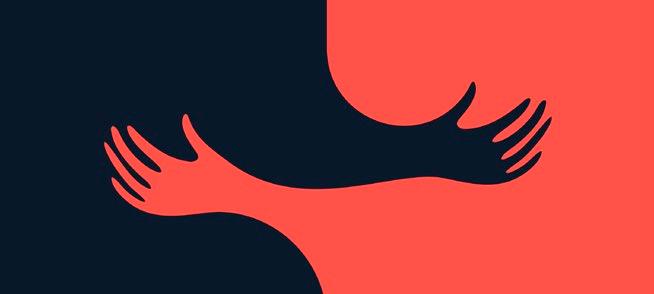
this is actually one of the most important aspects for development as a child. Is it any wonder that, when we are upset, distressed and vulnerable as adults, we seek out the same thing?
The value of touch was demonstrated by a series of disturbing experiments on rhesus monkeys back in the 1950s by Harry Harlow, an American psychologist. His work showed the incredible drive for warmth and intimacy that we all have. In his experiments, he took young monkeys and placed them in different enclosures. When given a choice between a surrogate “mother” to cling to made of wire mesh that had a ready supply of milk or a warm, soft mother that did not provide any food, they chose, to everyone’s astonishment, the comfort over food. This flew in the face of what was expected, as until then it had always been assumed that food was the main motivator for living creatures. Yet this
WHEN PEOPLE WHO ARE CLOSE TO ONE ANOTHER HOLD HANDS, THEIR BODIES
SYNCHRONISE THEIR HEART RATE
appeared to show that it was not food, but being comforted and intimate, that was the most important thing. Those monkeys who were not given a soft surrogate mother to cling to froze in fear and cried, crouched down or sucked their thumbs. He described these experiments as a study of love and they showed for the first time how vital the feeling of being loved is to us. His conclusion that love and support are essential factors to normal development has been supported by countless further scientific studies.
Personally I find this all incredibly comforting. For me, this really speaks of the power of love. n
JANUARY 2023 • 55
The Doctor Is In
Dr Max Pemberton
Q: Dear Dr Max, in recent months I have noticed small urine stains on my bedsheets. It seems I am leaking urine at night. I already do pelvic floor exercises—is there anything else I can do to stop this from happening?
- Tom
A: Dear Tom, I’m really pleased you’ve written to me. Incontinence—which is what you’re experiencing—is very common, particularly as people get older, yet it’s one of those things that all too often people don’t want to worry their doctor about. Even a small amount or occasional episodes can have a big impact on people’s lives, affecting the things they do, where they go and their self-confidence.
There are lots of treatments available, depending on the cause, and specialist “continence clinics” set up specifically to help. So, I want to say to anyone else reading this who is experiencing similar problems to go to see their doctor. Don’t put it off. Now, back to you. There are a number of things that can cause people to have difficulties with
continence, from neurological problems through to things like Type I and II diabetes. With women it’s often related to the pelvic floor. This is less common in men. You don’t mention your age but assuming you’re over the age of 50, this may be something to do with your prostate. This is a small gland that encircles the urethra—the tube that urine passes through. As men get older, their prostate has a tendency to enlarge and this can cause a number of problems. Men can sometimes find it difficult to pass urine, or the stream is not as strong as before. This can mean the bladder doesn’t empty properly. Urine then leaks out a bit, especially when someone’s asleep.
If it is an enlarged prostate then there’s medication to improve the flow of urine, ensuring the bladder fully empties. But incontinence like this can also be down to more serious conditions such as prostate or bladder cancer, so do prioritise going to see the doctor. n

Got a health question for our resident doctor?
Email it confidentially to askdrmax@readersdigest.co.uk
HEALTH
illustration by Javier Muñoz 56 • JANUARY 2023

Just Cycle And fold away
There’s no excuse not to get on your bike this Winter. Get your indoor cycling fix and feel the benefits.
Great for general cardio fitness, exercise bikes can be a brilliant way of training at home. However, choosing the right bike is incredibly important, which is something that Roger Black and his team recognised when creating the Roger Black Folding Exercise Bike.
“Best Present EVER are the words from my 77-year old father who received his Roger Black fitness bike for his birthday. He said it is so simple and easy to use, with no complicated gadgets. The seat is VERY comfortable, so using it everyday is a pleasure. It folds away neatly so it can be stored behind a door if need be” Anna, Farnham

Roger Black is o ering a 10% discount on the full www.rogerblackfitness.com range of home fitness equipment for all Reader’s Digest readers. Please use discount code DIGEST10 at checkout. Standard T&Cs apply.
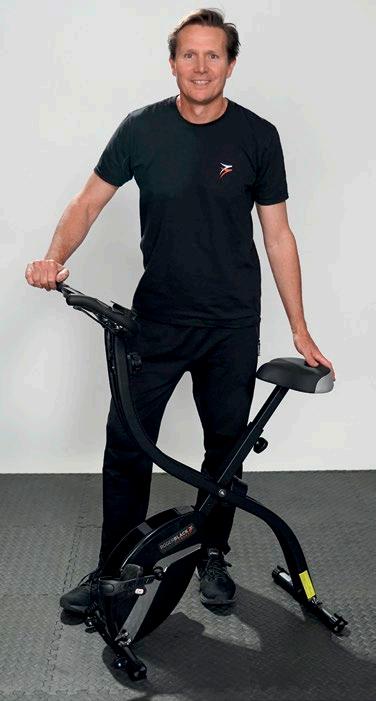

Get Lost–And Get Learning!
You’ll boost your brainpower if you brave the unknown, says our memory expert, Jonathan Hancock
There’s a lot to cope with when you go off to university, and the academic work is just the start. There are new friends to meet, new opportunities to choose between, new responsibilities to accept… and, for most students, a completely new city to explore.
We recently drove our daughter Evie 150 miles to start life as a fresher. It was a struggle to find the car park, let alone navigate the maze of corridors that led to her room.
Before we left that evening, we’d taken her to the local supermarket, and we knew that she had flatmates and phone apps to get her orientated. But the scale of the challenge ahead was clear—to find her way in an unfamiliar world.
The good news for Evie—and learners everywhere—is that exploring new habitats is hugely beneficial for memory. In a recent study, volunteers walked around a simulated forest environment. Then some of them took the same walk again, while others explored a different forest. And that second group
performed significantly better in memory tests straight after. According to the researchers, that was because navigating the new environment stimulated their dopamine system— setting up their brains for learning.
So leaving home to study for a degree makes perfect sense. What’s more, young minds seem to gain most from being in strange surroundings. But we may all be able to reap some of the benefits, even if it’s just by stimulating our senses and challenging our thinking skills. Here are three things to try:
• Go somewhere new to tackle an upcoming learning task—like memorising a speech in the library, or revising for an exam on a park bench—and take an unfamiliar route to get there.
• Play video games that get you moving through new landscapes. Then see whether it improves your success with other learning tasks, like practising a dance or mastering phrases for a foreign trip.
• Get lost in your imagination! To warm yourself up for learning, picture a city you know well, but imagine you’re stranded in a part of it that you’ve never visited. Then try to visualise exactly how you’ll get out.
58 • JANUARY 2023 HEALTH
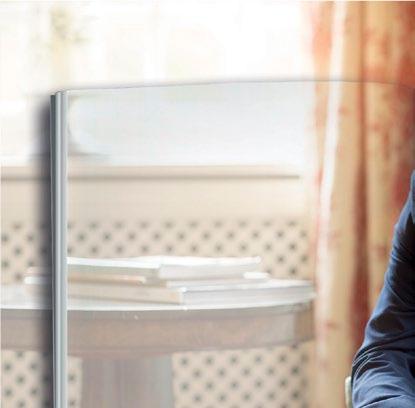


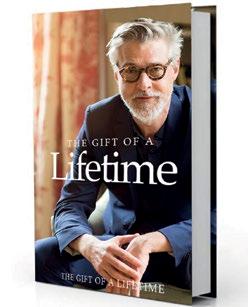



HEALTH
Coma To Be In A What It’s Like
The twilight zone between life and death is a mystery that doctors can solve
WBy Lauren Cahn
hen T Renee Garner was 32 weeks pregnant with her son, she was rushed to the hospital with extremely high blood pressure, her foetus in distress. Intravenous medication lowered her blood pressure, and her baby was delivered safely before being taken to the neonatal intensive care unit. But when Garner went to visit him there the next day, she still wasn’t well, and she began experiencing leg cramping so severe it left her weeping in the hospital. Then everything went black—for three days.
Doctors determined that Garner’s coma was the result of a severe electrolyte imbalance—her sodium had dropped precipitously—caused by the
IllustratioN by
James Steinberg
JANUARY 2023 • 61
IV medication she’d received. Garner says that while she was in the coma, she heard a siren and then the words it died, which she took to mean that she had died (it was actually a battery on a monitor that had died). She also recounts having horrible dreams. “I can’t remember them, but

COMA PATIENTS SAY THEY REMEMBER WHEN DOCTORS AND NURSES CAME INTO THE ROOM
I know they tormented me,” she says. “Every dream I had during my coma was a nightmare.”
Zaida Khaze was 19 when she was riding in a car that was hit by a drunk driver. Her head injury was so severe that she lost the ability to walk, speak and swallow, and she lapsed into a coma that lasted ten days. When she started to fully awaken in the rehab hospital to which she had been transferred, she remembered none of it: not the accident nor the aftermath. The only thing she did remember was having her entire family gathered around her. But, in fact, they were never all there at the same time.
What an individual patient will experience during a coma remains a
mystery to doctors. Even the medical definition is vague. The Mayo Clinic in the US calls it “a state of prolonged unconsciousness that can be caused by a variety of problems.” Technically, someone in a coma is unresponsive to light, sound, touch and verbal communication, but that doesn’t necessarily mean the patient isn’t aware, says Dr J Javier Provencio, professor in neurology and director of the Nerancy Neuroscience Intensive Care Unit at the University of Virginia.
Dr Provencio has had patients tell him they remember when doctors and nurses came into the room and pinched their big toe so hard it hurt, though they didn’t respond at the time and were completely unconscious (the pinch is a way for doctors to see whether people in a coma will respond to the pain or even wake up from it).
“Some remember nothing; some remember a great deal of feelings, but nothing specific. Some people hallucinate that people came to visit them who never actually did,” he says.
On the other hand, there are people like Jennifer Beaver. On a Saturday night in June 2017, she was riding in a golf cart with her husband and two friends. When she turned to talk to one of them, she slipped and fell off the moving cart, landing on her head. She suffered a massive brain bleed and was immediately rushed to the nearest
62 • JANUARY 2023 WHAT’S IT LIKE TO BE IN A COMA
trauma hospital, whisked into emergency surgery, and then put into a medically induced coma for a week to allow her brain to heal. The doctors told Beaver’s husband that she was unlikely to survive the injury and that if she did, she might be severely disabled.

THE HUMAN BRAIN
IS A LOT MORE RESILIENT THAN DOCTORS ONCE THOUGHT
And yet, when doctors gradually brought her out of the coma, Beaver was not only relatively healthy but could also recall pieces of discussions she’d overheard. “I remember friends and family in the room, and one friend who flew in from Los Angeles to see me,” she says. “Later on, I texted the friend and asked her if she had been in the room because I was certain I’d heard her voice, although I couldn’t recall seeing her.” The friend had, in fact, been there.
Even with brain imaging and other tests, doctors can never be certain whether a specific patient will emerge from a coma or how they will recover. But hearing the stories of patients who have come
out of their comas and recovered can help doctors learn more about this strange phenomenon. One of the most important lessons: the human brain is a lot more resilient than they once thought.
“For a long time we were vastly underestimating the brain’s potential for recovery,” says Dr Stephan A Mayer, a specialist in neurocritical care and emergency neurology at Westchester Medical Centre Health Network in Valhalla, New York. Many patients whom doctors thought had no hope of waking up have come out of their comas. “After about ten years of doing this, I realised I knew less about prognosis than ever,” Dr Mayer admits.
Becoming clearer about which are the best treatments for coma patients—and about how to better predict recovery prospects— are thriving areas of study. Dr Provencio is one of the founders of the Curing Coma Campaign, a group of neurocritical care specialists from all over the world who are developing improved coma treatment strategies. The Curing Coma campaign website (curingcoma.org) provides valuable information for patients, families and healthcare providers.
“We’re really looking for people who have been affected by coma to help us learn about their experiences before, during and after,” says Dr Provencio. n
JANUARY 2023 • 63 READER’S DIGEST
Can Sex Really Prevent Dementia?
You don’t need to be a scientist to know that sex makes you feel good. But thanks to a growing body of research, we’ve now got proof that sex is good for you, too.
One of the most exciting findings from the past few years is that sex is linked to better cognitive function— that is, how well our brain can process and make sense of information.
This has been widely interpreted to mean that sex can help prevent dementia. Staving off brain disease by having fun in the bedroom? It sounds too good to be true.

Monica Karpinski is a writer and editor focused on women’s health, sex, and relationships. She is the founder of women’s health media platform The Femedic
But is it? Well, yes and no.
The paper responsible for much of this buzz was written in 2016 by Hayley Wright and Rebecca Jenks from Coventry University. From survey responses of 6,833 adults aged 50-89 years, they found that sexually active folks scored higher on number sequencing (inputting the number that’s missing in a sequence) and memory recall tests than those who weren’t.
Interestingly, among those who did have sex men scored higher on both tests, whereas women only had better scores when it came to memory. Per the study authors, this could be because different bodies respond to chemicals released during pleasure in particular ways, but we can’t say for sure.
These tests are measures of cognitive function. When this dips, there’s an increased risk of dementia developing at some point.
A year later, the same researchers (plus their colleague Nele Demeyere) replicated the results by surveying 73 people aged 50-83. This time, they
64 • JANUARY 2023 DATING & RELATIONSHIPS
looked more closely at how often people were having sex, and found that those getting frisky on a weekly basis scored the highest on cognitive tests. Folks having sex monthly were next, while people who never had sex scored the lowest.
OK, so this tells us that people who have regular sex are more likely to have better cognitive function. And because in itself this can reduce the risk of dementia, people (but not the researchers) have drawn the conclusion that frequent sex can also keep the disease at bay.
Those getting frisky on a weekly basis scored the highest on cognitive tests
When we experience pleasure, chemicals are released that have a positive effect on our brains—like the feelgood neurotransmitter dopamine, which increases when we orgasm and promotes cognitive function.
Plus, when we get that warm, fuzzy feeling that comes with intimacy, we release the hormone oxytocin, which can enhance memory.
Now comes the part where we must tread carefully. We’ve got evidence to support a link between sex and improved cognition, but not that one causes the other.
We don’t know whether it’s the act of sex, rather than other effects that come with it, that’s having this impact on our brains.
For example, sex is a form of moderate exercise, comparable to brisk walking. Physical activity can improve memory and brain cell function, and so lower the risk of cognitive decline.
So, is it sex or the exercise it requires that we’re benefitting from? Scientists are still trying to figure this out, note the 2017 study authors.
But while sex can be a great way to boost these chemicals, we also get them elsewhere. Being praised at work and enjoying our hobbies will do the trick in triggering dopamine; oxytocin can rise from hugging or simply feeling cared for.
So what does this mean for our sex lives?
That we should do what makes us happy. After all, a lot of the brain benefits that come from sex are due to pleasure, so they’ll only happen if you’re having a good time.
If you like sex, having the sex life you want can contribute to better brain health—which theoretically could reduce your risk of dementia.
But if you don’t like sex, you aren’t “missing out”. It’s not the only way to be kind to your brain. n
JANUARY 2023 • 65
Relationship Advice
Monica Karpinski
Q: I am 59 and physically active. I’ve been independent and single for over 25 years but sometimes I miss having a mate; a friend who can help, lead and care. How do I begin, where do I start?
- Agnes
A: Making friends as an adult can be tough, but it isn’t impossible. Unfortunately though, there’s no way around the time and effort it takes.
According to psychologist and friendship expert Dr Marisa G Franco, there are two necessary ingredients for sparking a friendship: continuous unplanned interactions (being in the same place and the same time, again and again) and being vulnerable with each other. When we’re younger and at school or university, this is much easier as we’re automatically placed within a wide network of people who are all going through the same thing.
But as we get older, our lives fill up with different responsibilities and we have less time to just hang out. Unless we make the effort to put ourselves in situations where we’ll be among others—say, sports clubs or interest groups—we probably won’t meet anyone new. So, your first step
should be going to places where you can meet people.
It’s not enough to just be in the room with these folks, though. You also have to make the effort to engage with them. Introduce yourself and try to strike up a conversation. Sometimes it will go well, sometimes it won’t. This is fine: just keep at it until you find someone that you click with.
Interestingly, a study by Cornell University found that most people underestimate how much people like them when they meet new people. So even if you feel a bit awkward, the chances are that other people won’t see you in this way.
Once you’ve built up a friendly rapport with someone, you need to give that relationship time to develop. Keep showing up and be intentional about the effort you put in with that person, while having enough confidence in the relationship to not be too demanding of them. Over time, your shared experiences will bring the two of you closer together. n
Got a question for our resident sex and relationships expert? Email it confidentially to thelovedoctor@readersdigest.co.uk
66 • JANUARY 2023 DATING & RELATIONSHIPS

Win Theatre Tokens
Christmas and the New Year are a perfect time to see a show, so we’re giving you the chance to win a £350 Theatre Token Gift Card or eGift to treat your family to a show this Winter.
Maybe you’ll see your favourite panto, a West End musical or take a trip to a venue you’ve not visited before – winter is the perfect time to escape the cold and make memories at the theatre.

If you’re looking to tick off the final few names on your Christmas list, you could pay it forward as Theatre Tokens make the perfect present. They have no expiry date, and they can be used at more than 270 theatres including all of London’s West End. Run by Society of London Theatre, a not-for-profit organization, Theatre Tokens are a gift that gives back.
Enter now for your chance to win a £350 Theatre Tokens Gift Card or eGift whether you treat yourself or give to a loved one .


A. At more than 270 theatres including all of London’s West End B. 10 theatres
C. 20 theatres
Simply answer A, B or C on the entry form or enter online. See page 151.
COMPETITIONS 67 • JANUARY 2023
www . theatretokens . com
ANSWER THE QUESTION CORRECTLY TO BE IN WITH YOUR CHANCE TO WIN. Where can Theatre Tokens be used?
SIMPLY
Theatre Tokens WIN!
If I Ruled
The World
Clive Mantle
Clive Mantle is an actor known for his starring roles in TV shows like Casualty, Robin of Sherwood and Game of Thrones
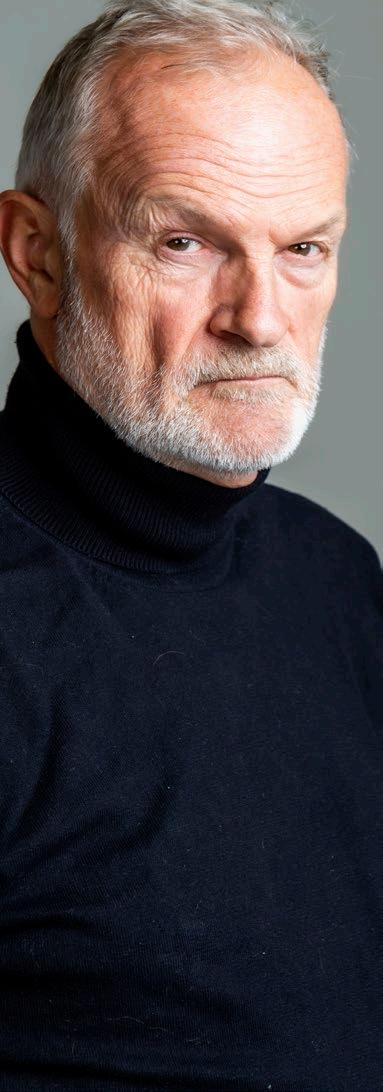
By law, property developers would incorporate energy efficiency into new builds
All new homes should be built with air source heat pumps, solar panels and a domestic wind turbine. It doesn’t matter if it’s rich executive development homes or mass new homes on the outskirts of towns, they should be as energy-friendly as possible. All energy saving devices should be incorporated right from the word go in the design. There should be competition for design to harness this power, which is all around us everyday and goes completely unused.
Hospitals would be moved outside inner cities
Brand new hospitals, where possible, should be built in between major towns and cities, which would be designed in conjunction with the people who work there day to day and have experience of what they need from the building. These great new hospitals will be state of the art and completely practical, rather than the ramshackle old hospital sites we have all over the country, which are completely impractical. They would take the place of our inner city hospitals, which will then be converted gradually into very good A&E departments and facilities for the elderly, where they’re still among their friends and family who could visit them regularly.
68
Schools would teach life-saving first aid
Every couple of months at school, the first lesson on a Monday morning ought to be about the ABC of resuscitation. Children at school should be taught how to keep each other alive, how to keep their parents alive. It’s very easy. It takes two hours to teach someone the ABC of resuscitation. I was taught when I was on the TV series Casualty. I was so embarrassed about how little I knew that I made the cast go on a lifesaver course, and I still remember it to this day. It’s vital to keep blood and oxygen circulating through the veins and the major organs in order for someone to have the best chance of survival.
Healthy food would be cheaper I think that healthy products should be emphatically promoted, and if necessary, subsidised. Unhealthy products—fast, sugary, easy food— should be taxed far more highly to pay for the changes. It should be an attractive option to buy better food. At the moment it’s a luxury for those who have the time and income.
The state would look after the most vulnerable first
The most afflicted in society should be given subsidies from the state first and foremost, before the able-bodied and mentally and physically fit, who are perfectly strong enough to look
after themselves. If you are fit and able-bodied, you really do not have too many excuses in life not to at least try to get a job and look after yourself and those around you, but the poor people who have not been given a choice in life through no fault of their own, who have been dealt a terrible card, should receive the greatest support, love and care from society.
We would get tough on climate change Climate change has to be addressed. It seems to me an absolute crime, people denying the fact that climate change is affecting our planet. I think that people who have gone public denying that climate change is happening should be under prosecution for misleading great swathes of the public, because it really is happening and it’s really going to endanger the future of our children and our children’s children. Far greater emphasis has to be placed on peaceful negotiations with the hostile regimes around the world, which are now threatening the very existence of a peaceful planet, as we’ve seen with the war in Ukraine. Economic sanctions are really a wonderful start. n
AS TOLD TO BECCA INGLIS
Clive Mantle will be starring in Wish You Were Dead, a brand new stage adaptation of the bestselling Peter James crime novel, which tours the UK from February 16. Tour dates and tickets can be found at peterjames.com
JANUARY 2023 • 69 INSPIRE


Reader’s Digest and Mirthy Book Club! Love the Love reading? JOIN MIRTHY FOR FREE TODAY. Simply visit www.mirthy.co.uk/rd for more information. We hope to see you at an event soon! JOIN TODAY Find out why Mirthy are loved by over 45,000 people ✚ 100+ live online events each month ✚ Winner of the Mental Wellness Social Enterprise of the year 2022 at the SME News UK Enterprise Awards PARTNERSHIP PROMOTION
I particularly enjoy the Mirthy book group because I have met people from all over the world and exchanged ideas about more than books

Reader’s Digest is pleased to announce that they are now Mirthy’s Book Club partner!
Bringing you fantastic author talks, engaging reads, book recommendations and more - all to enjoy from the comfort of your home, and all for free.
And if books aren’t quite enough, Mirthy offer over 100 online events per month to try. So whether you have a desire to get fitter, to try your hand at a new skill, or simply wish to sit back and relax with a virtual tour whilst being part of a friendly online community, signing up for classes and events with Mirthy could be just what you have been looking for.
As a Reader’s Digest reader, you get to enjoy any 4 events every month, for free!
Simply sign-up at mirthy.co.uk/rd and then choose which class to join (or join each class if you’re up for it!). If you can’t make the live event, Mirthy will even send you an email with a recording for you to enjoy at a convenient time.
Mirthy’s events are enjoyed by over 45,000 people - find out why by joining for free today.
Here are a few upcoming events to look forward to:
• Dare to Be’ series of inspirational talks
• Ukelele Beginners Course
• Archeology and Art History series
• Jazz, Barre and Afrobics dance classes
• Plus regular Early-morning stretch, Tai-Chi and Pilates classes
CHEDDAR GORGE My Britain:
In the heart of Somerset you’ll find a spectacular sight: a limestone gorge almost 400 feet deep and three miles long, dotted with feral goats that seem to defy gravity as they graze on the cliffs. Cheddar Gorge has an ancient history, having formed during the last Ice Age and being the site where Britain’s oldest complete human skeleton, Cheddar Man, was found in 1903.
Today, Cheddar Gorge and the nearby village of Cheddar is home to clifftop walks, underground caves (in which cheddar is matured!) and vibrant local businesses. For a perfect day, you can wander round the village, pick up a cheese sandwich made with what is delightfully referred to on every other shop sign as “genuine cheddar,” and head up the cliffs for a beautiful walk.
We spoke to people who live and work in Cheddar about what makes the Cheddar Gorge so special.
By Alice Gawthrop


INSPIRE 73
PAUL HEMINGTON
Paul, 57, is the Assistant Operations Manager at Cheddar Gorge and Caves cheddargorge.co.uk
Imoved to Somerset mainly for my family. My daughter was getting married and I didn’t want to live six hours away, so we made the move. Once we moved, we were made redundant and it was a mad scramble to get work. I ended up at here at Cheddar Gorge and Caves.
Cheddar Gorge is like nothing else in the UK. It’s a unique phenomenon, because although there are other caves in the country, you don’t have the gorge elsewhere. This is a major geological feature, it’s three miles long and there’s just this natural, raw beauty. I can sit at my desk in guest services and look out at part of the gorge. It’s amazing.
The Cheddar Gorge spirit is strong. You know, not having worked here or heard about the area, you come here and it gets under your skin in the right way. You become part of it, it becomes part of you. I’m very passionate about it. And there’s the amazing wildlife, the geology, the prehistory—Cheddar Man is still one of the greatest finds in the UK.
Every day at Cheddar Gorge and Caves is different. You’ve got the rock sports side of things, the
climbing, the caving. We take people through the caves on tours and we have pre-history, which we do with the museum, whereby we have schools come in and do demonstrations with them. We will dress up as authentically as we can to replicate the time period of the Cheddar Man, which is the Mesolithic period, so 10,000 years ago. We do fire lighting, for example, and hopefully it’s inspiring to the young people! It’s really cool to be in the museum garden and have part of the gorge as the backdrop while you’re doing it, so you can really immerse yourself in that moment.
My favourite spot is when you go past the peak on the walk and you can look back down into the gorge or across to the reservoir. The view is amazing. Yes, you can see pictures of it, but honestly you have to be there to fully appreciate it. You might hear some buzzards or see some sheep or goats while you’re up there, just to enhance the experience!

MY BRITAIN: CHEDDAR GORGE 74 • JANUARY 2023





ICARRIE DANIELS
Carrie, 28, is the Administrative Manager at The Original Cheddar Cheese Company
have lived close to Cheddar Gorge all my life. My parents, grandparents and greatgrandparents all live locally. It has been so lovely to grow up in a village with the most wonderful countryside and the Mendip Hills, an area of outstanding natural beauty, on our doorstep.
I love that Cheddar is a very rural village with a good little high street in the centre. Cheddar town has great access to the cities of Bristol, Bath and Wells. I am proud to be a Cheddar Gorge resident because Cheddar is world famous for its cheese, which is awesome!
Cheddar Gorge has a very unique atmosphere. Daytime erupts with human bustle, and as twilight takes hold the place becomes peaceful and you feel the wildlife come to life.
The Original Cheddar Cheese Company shop has been here since 1870, the first built in the gorge. Cheddar is the birthplace of farmhouse cheddar
cheese and the home of real scrumpy cider. We are proud to be the current custodians, and we safeguard the tradition and heritage of purveying the real farmhouse handmade cheddar here in the store.
What makes us special is the quality of the local produce we have on offer from surrounding farms. Our Café Gorge next door was awarded the Best South West Café/Tearoom in the Taste of the West awards 2022!
My favourite spot is Velvet Bottom, a short walk up the gorge from Café Gorge. I like to sit and watch the wild goats eating all the shrubs and standing right on the edges of the cliff.

originalcheddargorgecheese.co.uk
JANUARY 2023 • 77 READER’S DIGEST
KATHERINE LACOSTE
Katherine, 45, is the owner of Old Rowlands Christmas shop and Christmas Cottage
Holiday Accommodation oldrowlands.com
Ihave lived in Cheddar for four years, having moved from Hampshire to purchase the Old Rowlands Christmas Shop. I had never even visited Somerset until the year my husband and I saw Old Rowlands for sale. I had always wanted to own and run my own shop so we sold up and moved to Cheddar in 2018.
Instantly, we were welcomed by local people and regular visitors to Cheddar. I love the feel of the area! The gorge is spectacular any time of the year and is such a treat to have on our door step. I love walking along the top of the gorge and seeing the spectacular views.
Cheddar has great community spirit and organises many events throughout the year such as the art trail, various food festivals and festive night (late night Christmas shopping in the gorge).
The Christmas shop has evolved over the last four years. We specialise in decorations you are not going to find in your local gift shop or garden centre. Some decorations are

bespoke to us, many we design ourselves. I try not to repeat the same decorations every year so that returning customers always have something new to discover and fall in love with.
I find the most satisfying part of my job is seeing the excitement on people's faces when they enter shop. For many, finding us has made their day, or even their holiday.
This year my husband and I launched Christmas Cottage. Above the shop is a three-bedroom maisonette with a garden built into the gorge. We have themed the accommodation so that people can enjoy the spirit of Christmas any time of the year. We are thrilled it has been very well received and look forward to welcoming many repeat bookings next year.
One of my favourite places to visit in Cheddar is the reservoir. On a sunny day it really feels like you are on holiday. The Mendip Hills are in the background and paddle boarders on the res is a wonderful sight.
MY BRITAIN: CHEDDAR GORGE 78 • JANUARY 2023


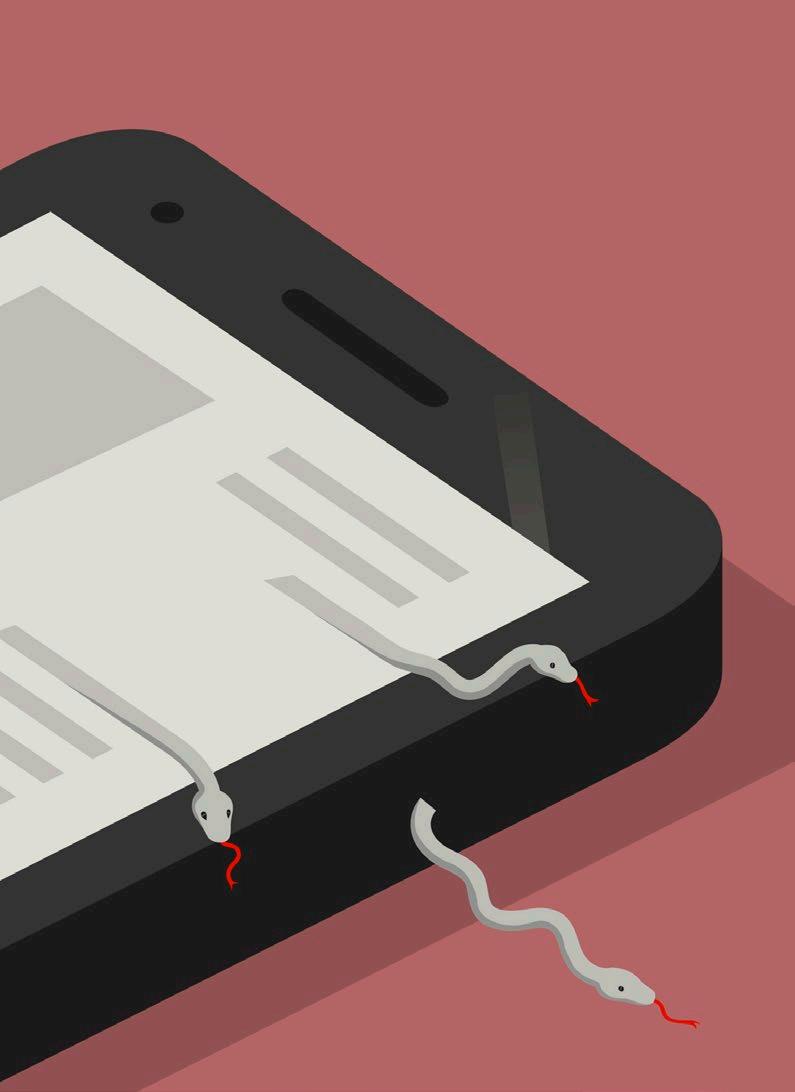
INSPIRATION
From COVID conspiracies to lies about the Ukraine war, traditional fact-checking is no match for the power of the crowd
Fighting Disinformation
By Eliot Higgins From The Guardian
In recent years, the internet has become the venue for a general collapse in trust. Trolling, fake news and “doing your own research” have become such a large part of public discourse, it’s sometimes easy to imagine that the online revolution has only brought us new ways to be confused about the world.
illus T ra T ion: e lia Bar B ieri JANUARY 2023 • 81
Social media has played a major role in the spread of disinformation. Malicious state enterprises such as the notorious Russian “troll farms” are part of this, but there’s a more powerful mechanism: the way social media brings together people, whether flat earthers or anti-vaxxers, who might not meet like-minded folks in the real world.
Today, if you’re convinced our
FACT-CHECKING OUTFITS DO GOOD WORK, BUT THEY ARE MISSING THE POWER OF THE CROWD
planet isn’t round, you don’t have to stand on street corners with a sign, shouting at passersby. Instead, you have access to an online community of tens of thousands of individuals producing content that not only tells you you’re right, but builds a web of pseudo-knowledge you can draw from if you feel your beliefs are being challenged.
The same kinds of “counterfactual communities” arise around any topic that attracts enough general interest. I’ve witnessed this myself over the past decade while looking into war crimes in Syria, COVID-19 disinformation, and now the Russian invasion of Ukraine.
Why do counterfactual communities form? A key factor is distrust in mainstream authority. For some, this is partly a reaction to the UK and US governments’ fabrications in the build-up to the 2003 invasion of Iraq. Sometimes, it stems from a sense of injustice around the IsraelPalestine conflict. These are of course legitimate positions, and are not by themselves indicative of a tendency to believe in conspiracies. But a pervasive sense of distrust can make you more vulnerable to slipping down the rabbit hole.
One way of looking at this is that government deception or hypocrisy has caused a form of moral injury. As with the proverb “once bitten, twice shy,” that injury can result in a kneejerk rejection where anyone can be perceived as being on the side of the establishment.
This creates a problem for traditional approaches to combatting disinformation, such as the topdown fact-check, which might be provided by a mainstream media outlet or other organisation. More often than not, this will be dismissed with: “They would say that, wouldn’t they?” Fact-checking outfits may do good work, but they are missing the power of the crowd. Because, as well as counterfactual communities, we’ve also seen what could be called truthseeking communities emerge around specific issues.
82 • JANUARY 2023 FIGHTING DISINFORMATION

These are the internet users who want to inform themselves while guarding against manipulation by others or being misled by their own preconceptions. Once established, they will not only share fact-checks in a way that lends them credibility, but often conduct the fact-checking themselves.
What’s important about these communities is that they react quickly to information being put out by various actors, including states. In 2017 the Russian ministry of defence published images on social media that it claimed showed evidence of US forces assisting the Islamic State in the Middle East. Huge, if true—except it was instantly debunked when
social media users realised within seconds that the Russian ministry of defence had used screenshots from a computer game.
I would go as far as to say that internet users who are heavily engaged with particular topics are our strongest defence against disinformation. At Bellingcat, a collective of researchers, investigators, and citizen journalists I founded in 2014, we’ve seen this play out in real time during the Russian invasion of Ukraine. Our investigation of the downing in July 2014 of Malaysia Airlines flight MH17 over eastern Ukraine helped create a community focused on the conflict there that uses
JANUARY 2023 • 83 READER’S DIGEST
Alex Navalny’s attempted assassins
In December 2020, Bellingcat published an investigation that implicated Russia’s Federal Security Service in the poisoning of opposition leader, Alex Navalny. Telecoms and travel data (uncovered by Bellingcat and The Insider, in cooperation with Der Spiegel and CNN) showed that at least three FSB operatives shadowed Navalny on more than 30 flights for several years, before finally poisoning him with the nerve agent, Novachok, in Tomsk. The 2022 documentary Navalny follows the investigation.
UK weapons arming US police
Bellingcat discovered that UK-made anti-riot gear was used by US police to suppress BLM protests in 2020, including to strike press members covering events on the ground. This contradicted the British government’s report, which was assessing whether the UK should keep giving equipment to the US. The UK follows rules that prevent it from exporting gear for “internal repression”.
Christchurch attack motives
As journalists hunted for a motive for the Christchurch mosque attacks, Bellingcat published an analysis of the shooter’s manifesto that identified several red herrings. The report warned against falling for “s**tposting”, where ironic content is posted to provoke a reaction from internet users not in on the joke, and showed how its meme humour was designed to appeal to 8chan users.
THE ANSWER LIES IN CREATING A SOCIETY THAT’S RESILIENT AGAINST DISINFORMATION
open-source techniques to examine, verify and debunk information.
In the weeks before the invasion, we gathered videos and photos of Russian troop movements that forewarned of the planned attack, and we debunked disinformation spread by separatists—including images of a supposed IED attack posed with bodies that, as we discovered, had been autopsied before they even arrived at the scene.
After the invasion started, many of the same people collected and geolocated images, including those of potential war crimes, that Bellingcat and its partners have been verifying and archiving for possible use in future accountability processes.
But
how do you grow and nurture what are essentially decentralised, self-organised, ad hoc groups like this? Bellingcat’s approach has been to engage with them, creating links from their useful social media posts to our publications (all thoroughly factchecked by our team), and crediting them for their efforts. We also create guides and case studies so that
84 • JANUARY 2023 FIGHTING DISINFORMATION
anyone inspired to give it a go has the opportunity to learn how to do it.
But there’s more to do than simply waiting for crowds of investigators to emerge and hoping they’re interested in the same things we are. The answer lies in creating a society that’s not only resilient against disinformation, but has the tools to contribute to efforts towards transparency and accountability.
For example, the digital media literacy charity The Student View in the UK has been going into schools and showing 16- to 18-year-olds how to use investigation techniques to look into issues affecting them. In one case, students in the city of Bradford used freedom of information requests to uncover the unusually large number of highspeed police chases in their areas.
Teaching young people how to engage positively with issues they face and then expanding this work into online investigation is not only empowering; it gives them skills they can use throughout their lives.
This is not about turning every 16to 18-year-old into a journalist, police officer, or human rights investigator, but rather giving them tools they can use to contribute, in however small a way, to the fight against disinformation. In their home towns, in conflicts such as Ukraine, and in the wider world, they really can make a difference. n
Eliot Higgins is founder of the Netherlandsbased Bellingcat investigative journalism network and author of We Are Bellingcat: An Intelligence Agency for the People. He lives in the UK
Fungi Friends
Humans share nearly 50 per cent of our DNA with fungi, making fungi closer to us genetically than they are to plants
The largest living thing on Earth is a fungus, which is bigger than a blue whale and spans an area as large as 1,665 football fields in Oregon’s Blue Mountains
Like us, mushrooms breathe in oxygen and exhale carbon dioxide, and they release more CO2 when temperatures go up. But mushrooms can still help tackle greenhouse gases in the atmosphere by releasing nutrients into the soil, which plants feed on
Source: wbur.org, scientificamerican.com, phys.org
Copyri G h T Guardian n ews & m edia lT d. 2022 JANUARY 2023 • 85 READER’S DIGEST
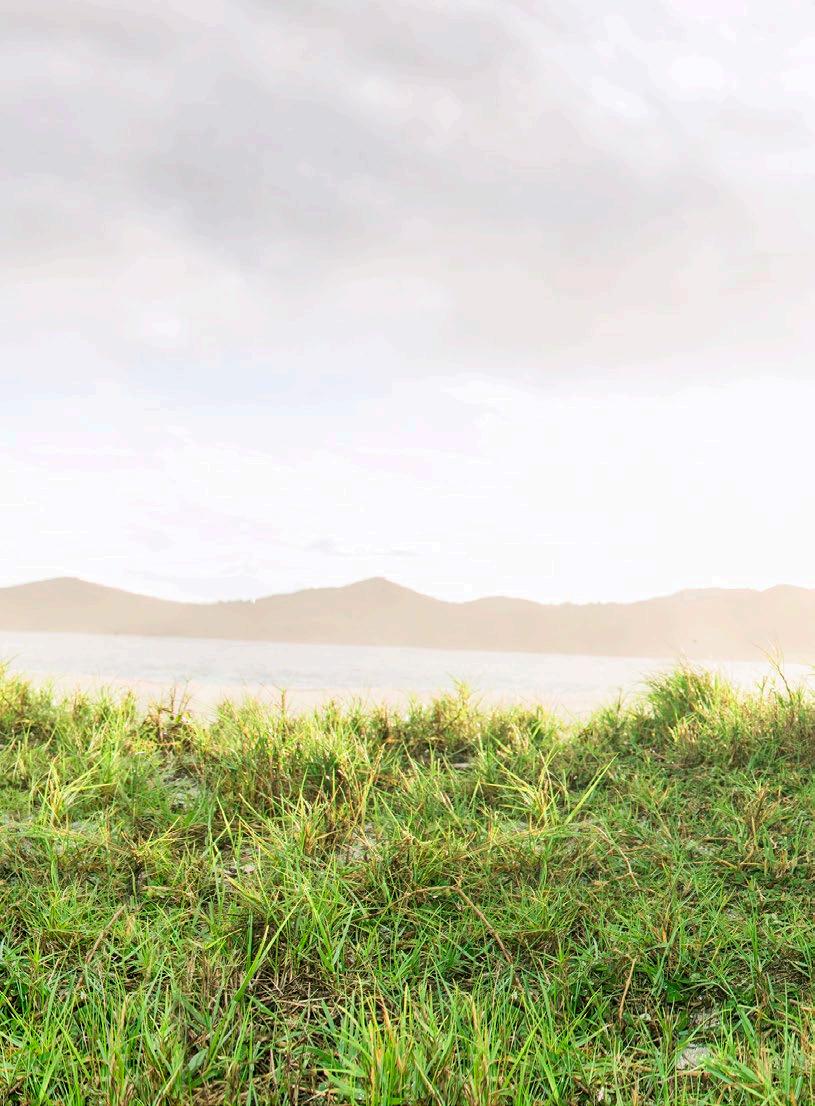 By Markham Heid
By Markham Heid
86 • JANUARY 2023
From elemental.medium.com SO YOU’VE HAD IT ROUGH? GOOD! HOW WE APPROACH HARDSHIP COULD TELL US HOW LONG WE’LL LIVE INSPIRATION
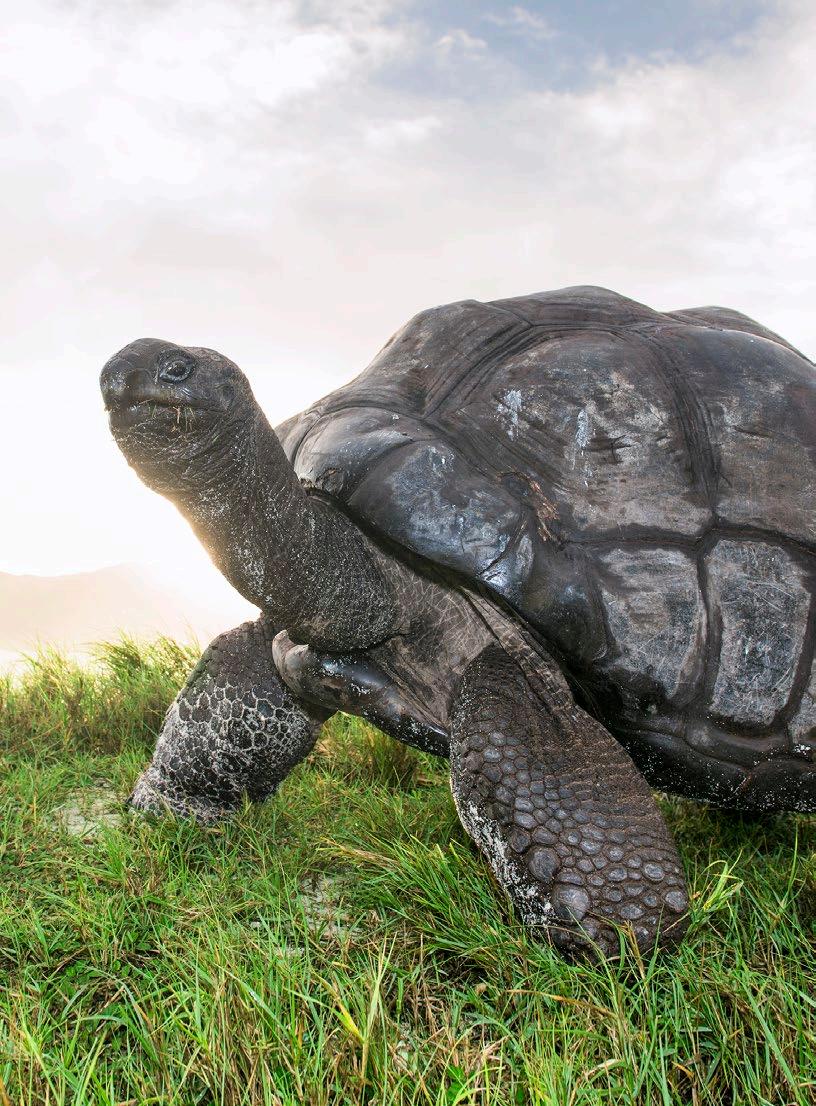
PH oto : ©James War W ick/Getty i ma G es
DURING THE SECOND
World War, an American woman named Shelley Smith Mydans reported on the conflict for Life magazine. Along with her husband, the photographer Carl Mydans, Shelley documented battles in both Europe and the Pacific.
Midway through the war, the couple was captured in the Philippines. The Japanese held them in camps in Manila and Shanghai. But despite spending two years as prisoners of war, both Mydanses survived and went on to live long and productive lives. Shelley lived to 86, while Carl made it all the way to 97.
Many who survived the war were not so fortunate. A US serviceman named Philip was also in the Pacific theatre during the Second World War. Even before the war, Philip was prone to anxiety and “catastrophising”—always predicting the worst. After he returned home, these traits intensified. Philip drank heavily and separated from his wife. Frustrated and resentful about his time overseas, blaming it for his failed marriage, Philip escalated his drinking. He tended not to exercise, and he was occasionally depressed. He died at age 64 of a heart attack.
The Mydanses’ and Philip’s very different stories were recounted in The Longevity Project, a book
that summarises an 80-year study based on interviews and health data collected from approximately 1,500 people—each followed from youth until death. Its authors came to an unlikely conclusion. “We found that many people who lived through hard times went on to live long lives,” says co-author Leslie Martin, a professor of psychology at California’s La Sierra University.
Unlike Philip, for whom the war seemed to push life onto a selfdestructive path, Martin says that the Mydanses appeared to turn their
THE WAY A PERSON
REACTS TO HARDSHIP
IS AN IMPORTANT FACTOR IN LONGEVITY
wartime experience into a source of motivation. “They didn’t see their stress as meaningless—it seemed to fuel them,” she says. “And this ability to think about the hard things we go through as ultimately beneficial seems to be important.”
Eat right, exercise, avoid stress… These vague directives are often framed as the necessary ingredients
88 • JANUARY 2023 SO YOU’VE HAD IT ROUGH? GOOD!

for a long and healthy life. There is definitely truth to each of them. But those who have studied longevity say these are oversimplifications that tend to prioritise action over attitude. While day-to-day habits and behaviours matter, a person’s approach to life—including, and maybe especially, the way he or she reacts to hardship—is arguably the more important factor in longevity.
Confronted by difficult times, a lot of people start drinking, smoking, abandoning exercise, cutting ties with friends, or making other unhealthy choices. These new habits can be hard to kick once the problematic period has passed. However, certain qualities seem
to safeguard some people from such pitfalls, and experts say one quality consistently tops the list. In terms of personality characteristics, conscientiousness was the strongest predictor of a long life, according to Martin.
Conscientiousness refers to someone who is organised, prudent, and persistent in their pursuits.
“Conscientious people are planful and responsible, not impulsive,” she says. “When they take on a task, they don’t give up easily.”
This may come as a surprise to those who assume carefree, take-iteasy types are best insulated against life’s many injuries and injustices.
“We actually found the most cheerful
PH oto: ©Busà P H oto G ra PH y/Getty i ma G es JANUARY 2023 • 89
and optimistic people lived shorter lives,” Martin says. “Being worried or anxious all the time is a problem, but a little worrying—when you’re thinking ahead and working through scenarios—can help you to be better prepared.” Conscientious worriers tend to put their fretting to good use: they make choices or changes in response to their concerns. Their worrying is productive, not pointless. While conscientious people are not totally risk-averse, they’re judicious about the risks they’re willing to take. They tend to wear their seat belts, eschew heavy drinking or drugs, and avoid other sources of undue risk. Conscientious people also tend to
adopt and stick with healthy habits, and their awareness and diligence leads them into healthy relationships and jobs. All these tendencies promote a long and healthy life.
Peter Martin, a professor of gerontology at Iowa State University, makes it clear that “anyone who has lived to 100 has faced many difficult situations.” He echoes many of the above sentiments and mentions a few other characteristics that the long-lived seem to share. “They’re not uptight or neurotic,” he says. While not blasé about life’s challenges, people who live a long time usually don’t catastrophise— that is, they don’t assume the worst,
HOW TO LIVE A CONSCIENTIOUS LIFE Experts share transformative tips
Hard times can set off all sorts of bad choices: drinking, smoking, cutting ties with loved ones. These decisions and consequences often far outlive the trials that spawned them in the first place—a drinking habit escalates or lost friends are never replaced. But
there is good news: “It is certainly possible to change your personality, and it happens pretty quickly,” says Gary Small, former director of the University of California, Los Angeles, Longevity Centre. Here are four things that conscientious people do
automatically, but others can teach themselves to do too:
1
Look for a mentor
“Spend time with people who are diligent, organised and who have other admirable qualities,” says Leslie Martin, a psychology
professor at California’s La Sierra University. “Being with people who demonstrate these behaviours can make habitforming easier, as their tendencies influence us.”
2
Form deep relationships
Don’t worry if
90 • JANUARY 2023 SO YOU’VE HAD IT ROUGH? GOOD!
which is a habit that can lead a person to make choices that get him or her into trouble, such as prematurely abandoning a healthy routine or a promising enterprise.
“A LITTLE WORRYING CAN HELP YOU TO BE BETTER PREPARED”
Additionally, he says, those who live a long time tend not to engage in “upward comparisons.” They don’t spend a lot of time comparing themselves or their circumstances
to those who are more fortunate. Instead, they think about people who have it worse or about past situations they endured that were even more difficult.
Another underappreciated element of longevity is something that Peter Martin refers to as gerotranscendence, which, roughly, is a preference for a cosmic or spiritual worldview rather than a materialistic or strictly rational one. He says many long-lived individuals seem to lean toward the spiritual as they age. “You see a pronounced reliance on religious beliefs—on putting faith in a higher power’s hands,” he says.
you don’t have a lot of friends. When it comes to bonding with others, it’s about having quality relationships over quantity.
“If you are an introvert with a few close relationships with supportive, healthy ties, that can be as good as being an extrovert with many more
ties,” says Friedman.
3
Find
a purpose
Increasing one’s maturity over the years is essential to maintaining good health, according to Howard Friedman, co-author of The Longevity Project. By this he means
spending your life engaging in “meaningful work, and doing good things for family, friends, society.”
4
Stick to it
Trying all of the above is easy; staying with it, not so much. This is why Small says that the core
element of conscientiousness is sticking with a healthy change or ambition once you’ve started it. The more that people push themselves to follow through on their goals—be they easy to achieve or difficult—the more they can build up their “tenacity” muscles.
JANUARY 2023 • 91 READER’S DIGEST
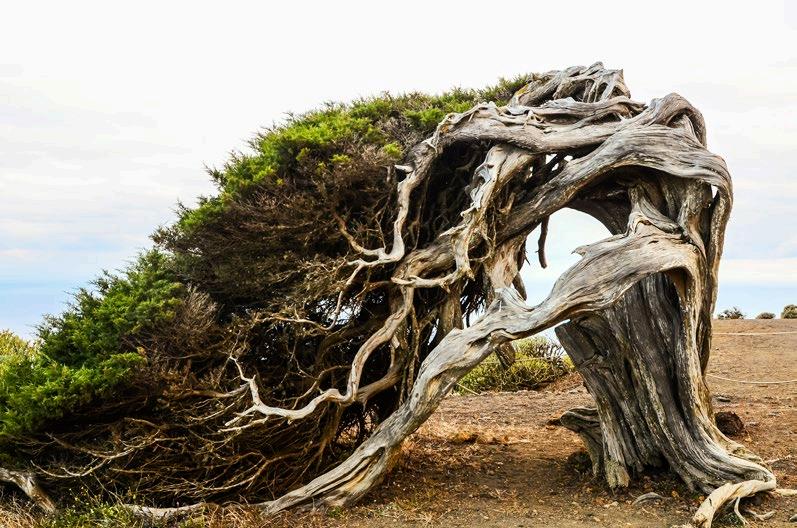
Adopting a more spiritual attitude may allow people to better work through the aspects of life that they find inscrutable or disconcerting. “When you’re able to hand things over to a higher being, that’s a way of letting go,” he says. At a certain point, letting go can reduce anger, frustration and other emotions that push people towards unhealthy thoughts or actions.
Valter Longo is director of the Longevity Institute at the University of Southern California. In 2019, Longo travelled around Italy to speak with centenarians in an effort to uncover patterns that might explain their enviable longevity. He says that two themes emerged.
One was genetic good fortune. “They’d say, ‘My sister made it to 94, my brother to 98.’ So genes played a big part in it,” he says. “The other story was the person who did not have any long-lived siblings or parents but was in a concentration camp during the Second World War.” In other words, something about living through incredible hardship seemed to bestow longevity on certain survivors. Longo has a couple of theories about what that something could be.
His first is based in nutrition science. Much of his work—in mice and in people—has found that periods of fasting or caloric restriction can help clear away dead or dysfunctional cells in ways that
P H oto: ©under W orld111/Getty i ma G es 92 • JANUARY 2023
may discourage the development of disease and also promote longevity. “If we give mice low levels of protein or calories for a while, then we feed them normally, they live longer than the mice we fed normally the whole time,” he says.
While malnourishment is an extreme and inhumane example of forced deprivation, Longo points out that many places in the world where people tend to live into very old age are also places where people eat a vegetable-centric and meatrestricted diet. Along with clearing away dead or diseased cells, “eating this way could cause epigenetic changes that affect life span,” he says, referring to diet-induced alterations in the way some genes are expressed. His second theory is more of an observation. “One thing all these centenarians had in common is that they all wanted to live—they wanted to go on,” he says. “They didn’t say, ‘I’m ready to die’ or ‘I don’t care anymore.’ They were still interested in life and paying attention to everything.” While most people are passionate and engaged when they’re young, a great many lose these attributes as life wears on. And this loss seems to matter.
Returning to the story of Philip, the heavy-drinking Second World War veteran who died young of a heart attack, Leslie Martin’s book says that he found his job merely “tolerable”
and that he was looking forward to retirement—though he didn’t know how he would fill his time or whether he would enjoy himself. Even in his early sixties, he wasn't involved in activities that gave his life passion or purpose.
Though some, like Philip, regard tough times as a sign that life is unfair or unpleasant, others emerge from a struggle with a greater sense of gratitude and a newfound resolve to commit their time and efforts to things that matter—to close friendships, to family bonds, or to hobbies or work for which they are passionate. Despite their two years in captivity, Carl Mydans and Shelley Smith Mydans gladly returned to Japan when Carl was tasked with leading Time-Life’s Tokyo bureau, and the two continued to be engaged, writing and photographing until the end.
While everyone is entitled to a period of adjustment during difficult times, those who endure will not let those difficulties knock their lives or attitudes off course for good.
“If you dwell on the negative, you’re not going to do well,” warns Gary Small, former director of the University of California, Los Angeles, Longevity Centre. “But if you can see a challenge as something to rise to, it can be very gratifying to get to the other side.” n
elemental.medium.com
© 2020 B y m edium
( m ay 11, 2020), c o P yri GH t
JANUARY 2023 • 93 READER’S DIGEST

WIN A LUXURY BREAK
Does a stay in a Butcombe Inn sound like the idyllic getaway for 2023? Start the New Year off the right way.
WIN a 2-night stay in one of our awardwinning Butcombe Inns of your choice, with breakfast, dinner and a bottle of Prosecco included.
THINKING ABOUT BOOKING YOUR NEXT STAYCATION?
Whether you are looking to explore the rugged Jurassic Coast or planning a romantic weekend in the Cotswold Countryside, Butcombe Pubs and Inns have the perfect accommodation for you, whatever your plans. With AA Five and Four star rated boutique inns located across the South West and South of England.
Relax in front of the fire after walking in the Mendips or enjoy a glass of bubbly in your room after sightseeing in Bath,
whatever the occasion, our inns have everything you need. From stunning ensuites to breakfast hampers on request, our rooms are full of cosy charm and personal touches.
Our guests can also enjoy award winning food in our restaurants; try unique and seasonal dishes created with local produce and to finish off your evening, a cheeky tipple from the bar. We offer an exciting range, from award-winning Butcombe beers to local cider, fine wines and classic cocktails. With dog-friendly, family-friendly and accessible options available, there is something for everyone when staying at a Butcombe Inn.
Book your stay with us today and use the code digest20 to receive a 20% discount.
Visit butcombe.com/hotels to plan your next adventure with us.



SIMPLY ANSWER THE QUESTION CORRECTLY TO BE IN WITH YOUR CHANCE TO WIN.
Where are the AA Five and Four star rated Butcombe boutique inns located across the UK? A. Scotland B. Wales
C. South West and South of England
Simply answer A, B or C on the entry form or enter online. See page 151.
T’s & C’s: The prize draw we are offering is for any inn or hotel across the Butcombe Estate. Offer is subject to availability. Valid for 6 months. Exclusions can apply. Bottle of Prosecco. Dinner up to value of £100. £50 towards lunch on one day. Breakfast included each morning of your two night stay
COMPETITIONS
94 • JANUARY 2023
www.butcombe.com/hotels






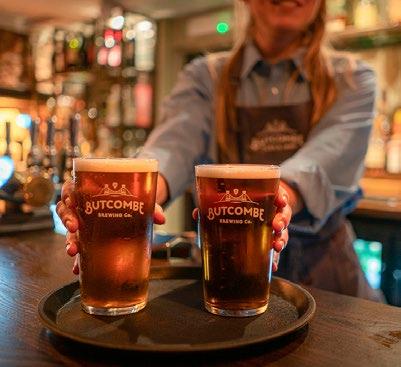
A Luxury Break WIN!

Salvatore Bumbello stages daily shows at the Antonio Pasqualino International Puppet Museum
96
Strings The Of
Pulling History
By Anna Staropoli
TRAVEL & ADVENTURE 97
alive
Sicily’s puppeteers are finding novel ways to keep their art form
From AtlAs obscurA
PH oto by r oselen A rA mistell A
Deep in the historic heart of the Sicilian capital of Palermo, a dragon stirs. A drumbeat thuds through the darkened room as the creature takes flight. The dragon lurches towards our armour-clad hero, Orlando, but it is no match for the knight. Orlando’s sword slices through the beast and its body falls to the ground. Its bloodied head dangles by a string above the stage. A burst of fun-house music from a barrel organ closes out the scene.
Here at the Antonio Pasqualino International Puppet Museum, housed in a grand building that was once home to the 18th-century Hotel de France in Palermo, slaying dragons is a family affair. Salvatore Bumbello stages daily live puppet shows in the museum’s theatre, often with the help of his ten-year-old

daughter, Martina, and her older brothers, Luciano and Francesco (during the dragon show, Martina cranks the handle of the theatre’s barrel organ, while both her brothers work backstage).
The productions follow traditional storylines from the Renaissance and earlier, in particular the tales of Orlando and Rinaldo, two legendary knights, or paladins, of Charlemagne’s court. The pair take on dragons, demons, and other foes—staple fare for this distinctive style of Sicilian puppetry, which began in the early 19th century.
Weathering war and economic turmoil, the Opera dei Pupi has been performed without interruption for more than 200 years. COVID-19 threatened that run, forcing Palermo’s puppeteers to tweak the very elements that set their tradition apart—or risk losing it altogether.
Palermo had dozens of puppet theatres before 1950, when interest in the art form began to decline. Today, there are only four left, each employing the handmade marionettes that stand nearly a metre tall and weigh nine kilograms.
Puppetry inspired by regional tales crops up across cultures, from ancient India’s Ramayana and Mahabharata to Japan’s Tale of the
98 • JANUARY 2023 PULLING THE STRINGS OF HISTORY

(Above) Martina Bumbello plays the barrel organ during a performance at the Antonio Pasqualino Museum; (Opposite) Three of the museum’s thousands of marionettes the elaborate puppets for his shows as well as for other puppeteers. Some of his marionettes can be found in the museum’s extensive collection— with thousands of Opera dei Pupi puppets, it’s the largest of its kind in the world.
Heike. But, says Jo Ann Cavallo, chair of the Italian Department at Columbia University in New York, “only Sicilian Opera dei Pupi stages epic stories with intricately structured and painted wooden puppets, in elaborate metal armour, and with swords and shields made to withstand heavy fighting.” Cavallo has studied Opera dei Pupi extensively in her research on Renaissance literature and how it is dramatised in Italy.
Sicilian puppet theatres are often family-run. Salvatore Bumbello learned the art from his late father, beginning when he was Martina’s age. Today, he designs and creates
In addition to the Sicilian marionettes, the museum houses rare water puppets from Vietnam and enormous, human-sized puppets designed for a show written by Italian fairy tale author, Italo Calvino. Too large to be operated using strings, the puppets had to be strapped to the backs of puppeteers. They were retired after a single performance and now occupy an entire room in the museum, serving,
JANUARY 2023 • 99
PH oto s by r oselen A rA mistell A X2

perhaps, as a warning of the risks of abandoning deeply established conventions—something Palermo’s puppeteers have long avoided.
“We have not changed anything,” Bumbello says when asked to compare his productions with those of his father. Even the special effects he uses—such as pull-apart puppets that can be dismembered or beheaded, including the doomed dragon in his current production— have existed for centuries.
Since the start of the pandemic, however, change has been unavoidable for Palermo’s puppeteers. The theatres closed temporarily in March 2020, which Bumbello says jeopardised their
status, recognised by UNESCO’s Intangible Cultural Heritage of Humanity list, as the only uninterrupted puppetry tradition of its kind.
“The pandemic devastated the world of puppetry,” he says. “We could not act out our stories and consequently could not have an audience.” Rather than shut down completely, the museum took to the internet, allowing viewers to livestream performances until inperson shows returned in October 2021. Streaming shows helped to keep the tradition going—but for some of Palermo’s puppeteers, the evolution of their art form has been ongoing for years. Third-generation
100 • JANUARY 2023
Luciano and Francesco Bumbello help their father during a performance
oto by r oselen A rA mistell A
PH
puparo Vincenzo Argento, who runs Teatro Famiglia Argento with his son Nicolò, started experimenting with new approaches to Opera dei Pupi to keep his business alive long before the pandemic hit.
Hunched over a desk in his workshop, Argento chisels fragments of metal that will form the helmet of a puppet destined for sale in his shop beside feathered, puppet-shaped wine corks and other items intended to appeal to tourists. Setting aside traditional stories, he and Nicolò have written original scripts and added more daring special effects to their shows. “[Other puppeteers] don’t always accept these changes,” Argento says, his eyes intent on his handiwork. “When we began, it was much simpler.”
Today’s Opera dei Pupi shows often depict knights fighting their way through one battle after another and emerging victorious before the curtain falls. As local audiences shrank in the second half of the 20th century and were replaced by tourists without knowledge of the Italian language or the stories that the productions were based on, the shows became more action-heavy and disconnected from their literary inspiration.
Some see the challenges created by the pandemic as an opportunity for Opera dei Pupi puppeteers to experiment with technology and update traditional themes. Several
storylines still performed today include the Christian knights killing villainous Saracens and end with puppet corpses piled on the stage, reflecting centuries-old hostilities toward Muslim conquerors. However, Cavallo says, such scenes are gradually evolving.
“Today, we can find plays that actively question confrontations based on provenance or religion and instead seek to promote understanding across borders, encouraging compassion for those who suffer regardless of their origin,” she says.
Expanding to online performances has also allowed Sicilian puppeteers to try out new, more modern stories and to stage plays that haven’t been performed in decades. The Antonio Pasqualino Museum has taken this new digital direction even further by incorporating augmented reality into its puppetry, creating an interactive component for virtual visitors.
Back at the museum, Martina cranks the barrel organ as the show comes to an end. Before the curtain closes, three final characters make an appearance. Bumbello, Luciano and Francesco crouch down, visible at last in front of the wooden set, and wave at their audience.
“The art was handed down to me, and I will hand it down to my children, as they will do with theirs,” says Salvatore Bumbello. “This way, tradition will not be lost.” n
JANUARY 2023 • 101 READER’S DIGEST

102 TRAVEL & ADVENTURE

There’s more than punch and sandy beaches to this idyllic Caribbean island, discovers Anna Walker
Drunk On Life In Antigua
I take a moment to slow my breath, quickened from a hike in the fierce Caribbean sun, as I crouch down, hushed with my companions. We’re gathered around an unassuming cavity in the ground, many of us cameras out, paparazzi-style, hoping to catch a glimpse of an unlikely holiday photo star— the tarantula.
The bravest of our group, Kathy, is gently probing this unwitting spider’s home with a long piece of grass. The plant’s feathery tips, our guide assures us, imitate a spider’s legs. Kathy’s engaged in a tug of war, not entirely sure whether she wants to win the struggle that will bring this slumberdisturbed creature to the surface. Perhaps this isn’t the scene you imagine when you think of a trip to the Sandals Grande Antigua resort. A couple’s paradise, certainly. Long colourful cocktails sipped on longer white sand beaches. Endless days stretched out in front of the waves. Lingering warm nights enjoying food in one of the 11 restaurants. But if there’s one thing the resort provides in abundance in my week-long stay, it’s surprises.
The hike in question is perhaps the biggest surprise of all. We soon discover that “beginner” means something quite different in Antigua to back home in the UK as we scramble over rocks, hop foot around spiky cacti and duck under lush, low-hanging branches to take in the
stunning scenery of the Pillars of Hercules Hiking Adventure, provided by local tour company Island Routes (islandroutes.com). Starting from 118 USD per person, our guides are fun, but know when to push their amateur hikers, encouraging us to reach that photo-perfect ledge, scale this rock, taste that neon-pink cactus fruit.
It’s one of countless tours and excursions available from the resort. Another day we take a hair-whipping, seafoam-scrambling speed boat out to kayak around mangroves with Antiguan Adventure Tours (antiguanaturetours.com). We marvel at the site of a deep-sea cucumber, thick as an aubergine and slimy as a toad. Beneath us, giant stingrays dance ethereally. Another tour offers the chance to swim alongside them, and from the beaming faces of returning guests, there’s no doubt this outing is a winner.
With our kayaking tour complete, our charismatic driver welcomes us back on the speedboat, bumping so hard over waves it almost feels like we’re white-water rafting out to the idyllic Great Bird Island. This
104 • JANUARY 2023
DRUNK ON LIFE IN ANTIGUA




20-acre islet is visited by some 20,000 tourists every year and is the pictureperfect “desert island” experience. It’s carefully guarded by a mysterious “island warden” who charges for tourists daring enough to perch on the pretty blue picnic tables, or who wish to fully explore this almost-untouched paradise. It’s surely worth the toll, alive with colourful lizards, lush greenery and surrounding coral reefs.
Famished from our excursions, it’s a welcome sight to see our guides filling cups from large plastic containers of coral-red rum punch, and it’s not long before our group is tipsy on the strong stuff. Deliciously sweet and spiced, it makes the

bumps of the return journey feel more like a funfair than the whiteknuckle ride we encountered earlier.
STEEL DRUMS, REGGAE CLASSICS AND SUMPTUOUS COOKING ARE THE ORDER OF THE EVENING
Later, we set off to take in the other side of Sandals. We’re visiting GARD, a centre funded by the Sandals Foundation providing vocational training and business advice to vulnerable young people. Endeavours supported by the Foundation aim to preserve the environment and build stronger and healthier communities and better education opportunities on the island. We meet the centre’s beekeeper Jamal, an endless fountain of knowledge on all things bees, chatting as his busy hives buzz industriously behind us.
Jamal’s introduction to bees came as a teenager when a hive took over his bedroom. So interested was he in his new roommates, that the beekeeper who had come to remove them offered him an apprenticeship. Enjoying small talk as he plies us with fresh Antiguan honey straight from
DRUNK ON LIFE IN ANTIGUA

the honeycomb, we’re amazed to learn that he’s also a medical student and a mechanic. A volunteer we met growing crops was also a midwife and a nurse. Communities here are as industrious as Jamal’s beehives, and the impact of COVID has only deepened the sense of commitment to protecting the wellbeing of the 90,000 that call Antigua home.
Another point of Antiguan community pride is the island’s world-famous nightlife, and a visit wouldn’t be complete without an evening at Shirley Heights (shirleyheightslookout.com).
Offering spectacular views over
one of the most beautiful vistas on the island, we arrive early to this former military lookout to take in the panorama before darkness descends, bringing with it an unparalleled nightlife atmosphere.
Billed as the “biggest and best party” in Antigua and Barbuda, steel drums, reggae classics and sumptuous Caribbean cooking are the order of the evening. I opt for traditional jerk chicken and potato salad and tuck in, grateful that we arrived early enough to nab one of the prime tables by the dance floor— this is people watching heaven.
Bats swoop low over the evening’s proceedings, lit belly-up by countless
JANUARY 2023 • 107
Shirley Heights is famous for its weekly parties
fairy lights, as the band slides coolly into a cover of Shaggy’s “Angel”. Children are sold colourful maracas, which they shake chaotically to the music. Women light their beautiful jewellery stalls with the torch of their phones, shells glinting in the artificial glow. Across from us a fellow Brit clutches tightly to a straw basket, clearly purchased moments before the music began, as he flings his arms about and wiggles his hips intently. His joy is contagious—what better place to let go of your troubles and dance like nobody’s watching? Even if several people are…

Later, an elderly local man takes to the floor to school the congregation in real island moves. His slinking hips and broad smile don’t let up until the music stops, despite being old enough to earn a prime seat on the bus.

Nightlife back at the resort is equally pleasurable. From hearty Italian food (the chocolate lava cake must be tried to be believed) at Mario’s, to authentic Caribbean cuisine at Eleanor’s (an unrivalled spot for breakfast) and beachlethargy-inducing burgers at Barefoot (where you can sink your toes into the white sand of Dickinson Bay as you eat) there are endless opportunities to feast.
I hadn’t realised until the moment I stepped onto the resort, with its blue ocean and the impeccable white sands of Dickenson Bay, how much I needed to disconnect. Antigua had much to teach me, reconnecting me to a world beyond screens and emails. I had spent the first 20 minutes of my trip on the phone to housekeeping, confused by the loud alarms sounding outside my room. I soon realised, red faced, that the relentless noise wasn’t a cacophony of sirens at all, but the vast chorus of thousands of birds
DRUNK ON LIFE IN ANTIGUA
and bugs, sounding their song for the evening.
At home, leaving for dinner might mean walking down the street texting, my mind buzzing with upcoming projects, unfinished chores. Here, as I ventured through Sandals’ carefully manicured lawns, countless tiny lizards scurried to clear my path and duck into the undergrowth, each seemingly a more beautiful pattern than the last.
The hotel’s adorable cats (cared
I HADN’T REALISED UNTIL THE MOMENT I STEPPED ONTO THE RESORT, HOW MUCH I NEEDED TO DISCONNECT
TRAVEL TIPS
A seven-night stay for two people at Sandals Grande Antigua Resort & Spa staying in a Caribbean Deluxe Room costs from £2,059 per person. Price includes Luxury Included® (allinclusive) accommodation, return economy class flights with British Airways from London Gatwick Airport and resort transfers. Price is date-specific and valid for travel on September 17, 2023. Prices are correct as of September 30, 2022. All pricing is subject to availability and change.
To book through Sandals Resorts’ UK tour operator, Unique Caribbean Holidays Ltd (UCHL), visit sandals. co.uk or call 0800 597 0002. Head to visitantiguabarbuda.com for more information about the island.
for in miniature “cat cafes” that provide them with hearty leftover meals from the many restaurants) shadowed my walk home each night, escorting me to my door like a fluffy security detail. Here, a bird more remarkable than any I’d seen before. There, an ornate snail the size of my fist. Frequently a cocktail would pass that I’d eye with envy and order from one of the resort’s seven bars. Sandals Antigua demanded my complete presence. And yet it left me more relaxed than I’ve been in years. n

READER’S DIGEST JANUARY 2023 • 109
Buy a subscription for you or as a gift today
A magazine subscription makes the perfect gift – it’s the gift that keeps on giving the whole year through
Reader's Digest magazine is bursting with stories, news, advice, recipes, reviews, tips, jokes and anecdotes. Each issue is also packed full of puzzles and competitions offering you chances to win some great prizes. Why subscribe to Reader’s Digest?
SUBSCRIBE TODAY FROM AS LITTLE AS £22.99
Claim immediate subscriber benefits including:
Discounted travel club offers with Tripbeat - save up to 60% off 600,000 hotels worldwide, plus preferential rates on flights, car hire, activities and more.
FREE access to online events & classes with Mirthy with access to 80+ events per month, from talks to creative workshops, dance & fitness classes and more. ALL OF THIS FROM ONLY £22.99 - OUR BEST VALUE YET



It’s only £22.99 for a full one-year subscription paid by direct debit. A Saving of over 50% OFF the usual £47.88 retail price - and what’s more, we will deliver it direct to your or gift recipient’s door every month for free!

SUBSCRIPTION OFFER
+
SUBSCRIBE


YES I want to subscribe to Reader’s Digest Magazine for just £22.99 for 12 issues (a saving of £24.89 on the shop price of £47.88). I understand I can cancel my subscription at any time by contacting customer services. If I want to continue to subscribe after my first 12 issues I need do nothing and my subscription will automatically be renewed at the low rate of £24.99 every 12 issues until I decide otherwise.
Name:
Address:

Telephone:
Email:
INSTRUCTIONS TO YOUR BANK OR BUILDING SOCIETY TO PAY BY DIRECT DEBIT. Originators reference: 400162
Please complete direct debit mandate below

Name of Bank ......................................................................
Account Holder
Branch: / /
Account No
Instructions to your bank or Building Society: Pay Reader’s Digest Direct Debits from the account detailed on this instruction subject to the safeguards assured by the Direct Debit Guarantee. I understand that this instruction may remain with Reader’s Digest and if so will be passed electronically to my Bank or Building Society.
Signature .....................................................................
Date ..............................................................................
and
Please tick here if you object
Postcode:
Sort Code
products
to receiving such information Return your completed form to: Reader’s Digest, The Maltings, West Street, Bourne PE10 9PH Or call us today on 0330 333 2220 Quoting code MAGJAN23 Today www.readersdigest.co.uk/subscribe
Data Protection: From time to time Reader’s Digest may contact you with details of its
services.

Unforgettable Uzbekistan My Great Escape:
Our reader Trevor Johnson takes a memorable trip to Uzbekistan
Why did I choose Uzbekistan for my first post-pandemic holiday abroad?
Perhaps, in my mind, I had romantic images of the ancient Silk Road and the great cities along its route, especially Samarkand. Maybe I even entertained forlorn hopes of bumping into Joanna Lumley. Probably, I simply wanted to see a part of the world that was completely unknown to me. I was not to be disappointed.
On my first day in the capital, Tashkent, my wallet bulging with som, I headed for the nearest metro station. With the help of a student keen to practise her English, I reached the Chorsu Bazaar, and was impressed during my journey to see Uzbek youngsters cheerfully give up their seats to elderly passengers.


Located in and around several large domes, the bazaar provided an exciting start to my holiday, the colourful national dress of the local women further enlivening the scene. The stallholders offered a vast range of goods, including meat, fruit, vegetables and car parts for locals and souvenirs, such as ceramics and textiles, for tourists. Haggling was
112 • JANUARY 2023 POWERED BY
Registan Square



expected and was invariably goodnatured, but even I did not quibble at paying 5,000 som (40p) for a bottle of pomegranate juice, squeezed while I waited.
The rest of my time in Uzbekistan was a cavalcade of sights and experiences, as I visited Khiva, Bukhara and Samarkand. Each has its architectural masterpieces—mosques,
minarets and madrassas—but, for me, the most impressive was probably the world-famous Registan Square in Samarkand. With magnificent madrassas on three sides, it is spectacular by day and magical when illuminated by night.
Each journey was varied and interesting; arid desert contrasted with fertile areas where crops, notably cotton, thrived. The weather, however, (it was the first half of October) didn’t vary; it was sunny and warm every day and chilly at night.
For all but vegetarians, the food was another highlight of the holiday. Tapioca pudding at breakfast came as a surprise but the home-produced fresh fruit and vegetables were delicious. The national dish, plov (you might know it as “pilaf”), which is rice-based, is often eaten with flat bread and followed by green tea.
Ten days in Uzbekistan passed too quickly but I will always remember my first visit to this fascinating, friendly country. n
Tell us about your favourite holiday (send a photo too) and if we print it, we’ll pay £50. Email excerpts@readersdigest.co.uk
SUBSCRIBER
BENEFIT:
Exclusive travel discounts with Tripbeat

See page 110 for details
JANUARY 2023 • 113
TRAVEL & ADVENTURE


CHIOGGIA Venetian Lagoon
At the southern end of the Venetian Lagoon is what appears at first to be a miniature version of its famous city. Arranged across five islands, Chioggia, too, is bewitchingly spliced by beautiful canals, full of hopelessly narrow streets and rich in crooked, colonnaded palazzos of various pastel shades.
Look more closely though, and you’ll begin noticing some differences. There’s more salt in the air, and less English on locals’ tongues; unlike Venice, this isn’t a place that revolves around tourism. Fishing vessels replace gondolas.
Even so, there’s ample reason to visit. In terms of sights, you’ve got Torre di Sant’Andrea and its blue watch face, which dates from at least 1386 and might well be the world’s oldest working clock tower, plus the graceful Ponte di Vigo, a white-marble bridge on the square, which tops aperitivo bar and shop-lined main street Corso del Popolo, where there are often market stalls.
The adjoined town of Sottomarina, across a causeway, throws in a six-mile sandy beach whose iodine-rich air is said to be good for thyroids. Further south are more beaches plus empty riversides lovely for cycling—which, unlike Venice, one can do in Chioggia—between radicchio fields.
The 90-minute journey to La Serenissima is long-winded but doable for day-trippers. A ferry sails across the lagoon to rakethin Pellestrina. You then board a bus which motors to this pretty island, joins a car ferry and then skips along Lido island, past beach huts and stilted houses, to its main port—from where vaporetti splash off towards Venice. n
By Richard Mellor
POWERED BY
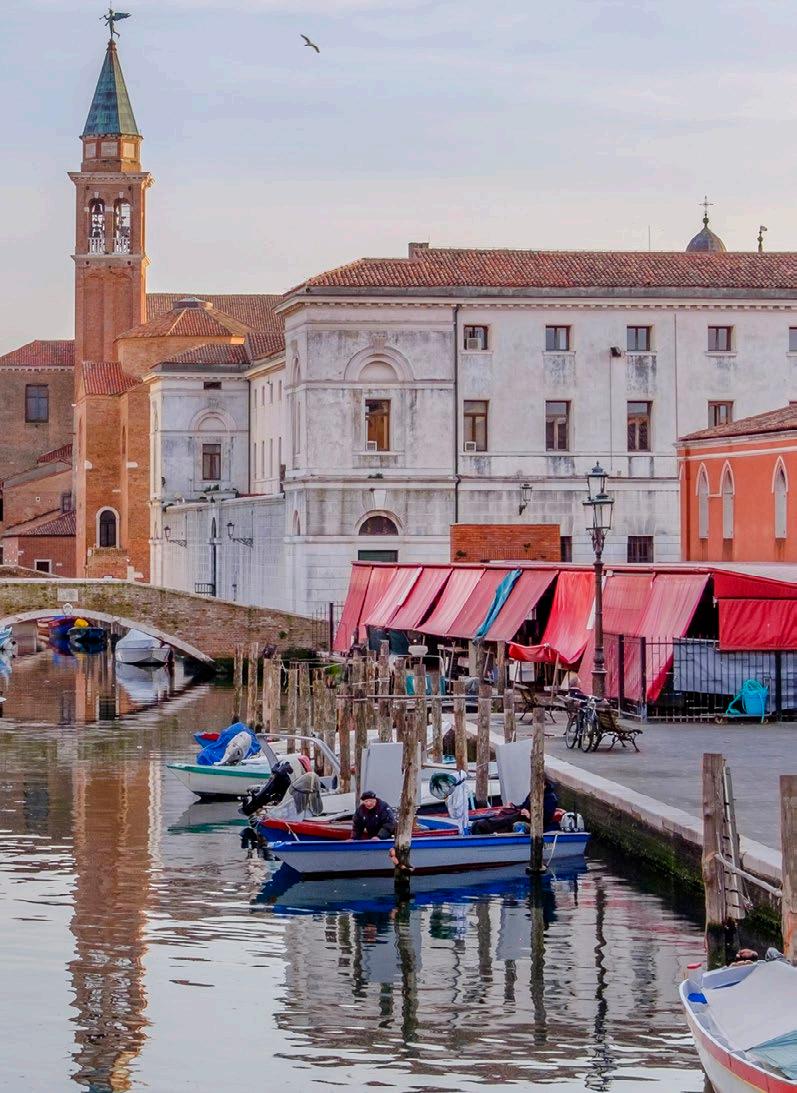

115
Exclusive travel discounts
See
GEMS HIDDEN
SUBSCRIBER BENEFIT:
with Tripbeat
page 110 for details

WIN A LUXURY BREAK
Step into a world of relaxed luxury at Wivenhoe House Hotel with a getaway stay for one night for two people including a three-course meal!
Our Luxury Rooms in the Main House having been lovingly restored to reflect and celebrate the original 18th-century architecture of our beautiful building. From original wooden beams to sash windows, our en-suite bedrooms are all individually styled with traditional furniture.
Wivenhoe House doesn’t just deliver on the hospitality; we’re located in
a prime location on the Essex and Suffolk border. Sitting just a stone’s throw away from many famous Essex attractions, think country walks, buzzing local farmers’ markets, gardens and historical buildings rich with history. Whether you’re looking for somewhere to visit with a friend, or as a couple, there’s a myriad of different areas to visit during your stay.
Wivenhoe House is fully accessible and boasts the Brasserie restaurant with locally sourced seasonal food. www.wivenhoehouse.co.uk.

Simply answer A, B or C on the entry form or enter online. See page 151. T’s & C’s: Based on up to two guests in a luxury room, subject to availability. Not valid on Friday’s & Saturday’s. Not available during key trading periods. Your stay must be taken
-
COMPETITIONS
SIMPLY ANSWER THE QUESTION CORRECTLY TO BE IN WITH YOUR CHANCE TO WIN. Which period is Wivenhoe’s original architecture from? A. 18th Century B. 17th Century C. 19th Century
non-transferable.
full.
between 2nd January 2023
1st June 2023. Three course meal on one evening to the value of £35 per person excludes beverages. No cash alternative and
Any other cost incurred must be paid in
Does not include travel costs.
116 • JANUARY 2023
A Luxury Break WIN! www.wivenhoehouse.co.uk



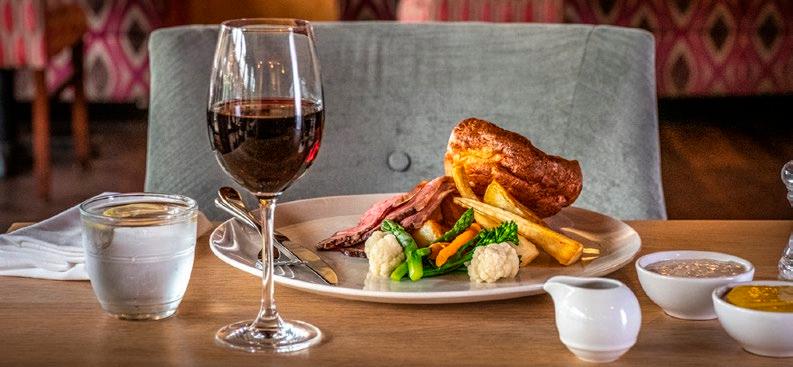

DEBTS
MONEY
Your ON THE MONEY SPECIAL 118
Deal With
Most organisations would celebrate record numbers in January.
Sadly the opposite is true for the UK’s debt charities, who see an influx of people in the new year.
Usually it’s extra Christmas spending that makes people go over the limit, but with the ongoing cost of living crisis, demand for help has been soaring month on month. It means more and more people have been turning to overdrafts, credit cards and loans to get by—but these aren’t sustainable solutions. And they can quickly turn unmanageable, spiralling into problem debts and defaults. But before that happens, these actions could help you take back some control, and prevent things from getting worse.
1. Get the whole picture
Sara Williams, who runs the Debt Camel website, says, “The starting point is to make a list of all your debts, what you owe, the interest rate and the monthly payments so you have all the facts.”

It really is vital to fully understand your situation—so get all the paperwork out as a priority. It might be scary to acknowledge everything, but leaving it too long will end up being even scarier.
Hopefully this step will help you work out what you need to do and you can see a way out.
2. Use your savings
Don’t forget to also take a look at your other accounts. If you have both debts and savings, you’re losing money.
Though savings rates have improved massively, in most cases they will still be dwarfed by the APR on cards and overdrafts. So you’re better off using your savings to clear those debts, or as much of them as you can.
It’s common for people to worry that this will remove an emergency savings buffer. But if an emergency comes along, you can borrow to cover those costs, and until it does, you can begin to build up more savings.
3. Focus on priority debts
Andy Webb is a personal finance journalist and runs the award-winning money blog, Be Clever With Your Cash
Not all debts are equal. Some can have catastrophic consequences if not paid, so it makes sense to get these cleared first. These are things like mortgage or rent (you could be evicted), car finance (your car could be repossessed), gas and
JANUARY 2023 • 119
electricity bills (you could be cut off) and council tax (bailiffs could be sent or you could go to jail).
Though you might not be able to clear them immediately, you can talk to each creditor you owe about the situation to agree how you’ll do it, which can prevent those bad things from happening.

4. Decide which debts to tackle first
After the priority debts are under control, you can begin to bring down any others, but don’t keep paying them off equally. Instead, pay the minimum on all but one, and focus on clearing that remaining debt with higher repayments.
“Some people like to pay off the highest interest rate debts first to save money. Others like to clear the smallest debt first so they see some progress quickly,” says Williams.
There’s no real right or wrong approach as both have advantages. Though the first method (sometimes known as the “avalanche”) cuts the total interest you pay, the second (called “snowballing”) might help you a bit psychologically.
5. Try to find more cash
You’ll want to put as much as you can towards your debts so they go
down faster. That’s likely to be pretty hard, but if there are any ways you can cut back or switch to lower spending that you haven’t already tried, now is the time to do it.
At the same time it’s worth seeing if there are ways for you to earn more, whether through your existing employment, an extra job or a “side hustle”, such as selling unwanted items online. Check if you’re able to claim any benefits too.
6. Transfer credit cards to 0%
If you have any credit card debts with monthly interest charges, see if you can get a 0% balance transfer credit card. This allows you to move the debt from one card to another, except the new card won’t charge any interest for a set period.
The longest ones will come with a transfer fee of around 3%, though this will still be better than continuing to pay around 20% or 25%. If you can manage with a shorter deal, perhaps two years at 0%, then you might be able to avoid the transfer fee completely.
You’ll have to make the minimum repayments every month, but try to pay as much as you can to bring the overall debt down. Ideally you’ll
MONEY 120 • JANUARY 2023
want to clear it before the interestfree offer ends where possible. Shop around via a comparison site to check your eligibility across a number of cards. If you can’t get 0%, even consolidating on a low-rate can always help.
7. Money Transfer for other debts
Sadly, balance transfers only work for credit card debts. But there is another option called a 0% Money Transfer credit card. These give you a lump sum to your current account to use as you wish, which makes them handy for catalogue debts and overdrafts that can often be as high as 40%. These are 0% for much shorter times than balance transfer cards, and you will have to pay a 3-4% fee, and again you’ll need to repay at least the minimum to the card each month.
8. Switch your overdraft
Another option for overdrafts is to move your current account to one with a 0% buffer. There are only a couple of these. Nationwide’s FlexDirect account offers 0% for 12 months, while First Direct has a small £250 buffer.
9. Get free help
If trying some or all of the above isn’t making enough of a difference and you can’t afford the repayments, then it’s wise to seek free and independent debt advice. Some of the leading organisations that can help are Citizens Advice, National Debtline and Step Change. Be very careful of similarly named organisations that might appear at the top of your online search results, and avoid any that charge you for debt solutions. n
A Figure Of Legend


Lieutenant-General Sir Adrian Carton de Wiart was a British Army officer who fought in both World Wars, was shot in the face, head, stomach, ankle, leg, and ear, survived two plane crashes, tunnelled out of a POW camp, and tore off his own fingers when a doctor refused to amputate them. He wrote of the 19141918 conflict: “Frankly, I enjoyed the war”
JANUARY 2023 • 121 READER’S DIGEST

www.readersdigest.co.uk/er2 For more information visit: Or call 0800 029 1233 What could you achieve in 2023 by releasing equity?
The past year may have triggered a lot of uncertainty about what 2023 has in store. Gaining control of your finances in preparation for the year ahead is important and, at Reader’s Digest Equity Release, we are here to help you make that decision, whatever it may be.
Releasing equity could help to set you up for a fulfilling, more comfortable 2023. If you are wondering how this product could help you, here are some of the top reasons people like you have released equity*:
1. HOME IMPROVEMENTS
32.5% of customers have used the value built-up in their homes to fund a variety of home improvements. Whether that’s giving your home some love, redesigning your garden, or making your home more future proof for you and your family.
2. MORTGAGE REPAYMENTS
A further 27.5% of our customers paid off any remaining mortgage that they may have had on their property. Relieving yourself from this financial commitment could free you up to make the most of the little things you have learnt to appreciate more during economically uncertain times.
3. EARLY INHERITANCE
You could also provide some comfort for your loved ones. 6.4% of customers
decided to gift an early inheritance to help provide family members with some extra cash for whatever they need, from weddings or education funding to house deposits.
There are many other ways that releasing equity could benefit you aside form the reasons above. If you’re intrigued by how the value built-up in your home could help you to achieve your goals in 2023, call the friendly, Devon-based Information Team on 0800 029 1233.
The Information Team will be able to answer any initial questions that you may have and provide a personalised estimate of the amount that you could release.
When you are ready, they can also book you a no-obligation appointment with an expert adviser. Your adviser will explain the pros and cons of all of the options available to you, including the fact that releasing equity will reduce the value of your estate and affect your entitlement to means-tested benefits. Get in touch today to find out how we can help.
*Responsible Life Data – 01/01/2022 – 01/11/2022.
Reader’s Digest Equity Release is a trading style of Responsible Life Limited. Only if your case completes will Responsible Life Limited charge an advice fee, currently not exceeding £1,690.
Budget Pet Care
As the cost-of-living crisis continues, it’s good to know there are ways of budgeting for our pet’s care as well as for ourselves
Buy in bulk

Buying food in larger quantities can bring big savings. Cutting out treats is another easy way to cut costs. They really won’t be missed and if your pet is a little overweight, they could even help with weight loss.
Avoid “premium” brands
Any food that is labelled as “complete” and is approved by the Food Standards Agency (FSA) will provide your pet with all they require in a balanced diet. Always provide them with fresh water too.
Use pet food banks
Blue Cross has a growing number of pet food banks, where struggling
owners can get free pet food. Some of our pet food banks have volunteer drivers who can deliver to pet owners who are unable to travel, and we can cater for some special diets. We welcome donations; these help keep pets with their owners.
Keep on top of your pet’s health

Keeping on top of your pet’s health will prevent expensive problems further down the line.
• Keep vaccinations up to date
• Ensure annual health checks
• For dogs, brush their teeth daily
• Keep them exercised
PET CORNER
Blue Cross highly recommends taking out a pet insurance policy from the day you get your pet. If your pet needs emergency veterinary care, and you don’t have insurance, it is worth asking your vet if they can offer a payment plan to stagger the cost.
See what savings your vet can offer
Many vets run pet clubs that charge a small monthly fee to cover pets for things like annual vaccinations, health checks, flea and worm treatment and even discounts for neutering, pet food and dental treatment. It’s certainly worth checking with your local vet to see if
they offer this service. Asking your vet for a prescription that you can use to purchase medicines from an online veterinary pharmacy is another good way of keeping down costs. If treatment is ongoing, ask for a repeatable prescription for even more savings. The one-off cost of the prescription is more than offset by the reduced cost of the medicines from the online pharmacy. n
If you really can’t pay for your pet’s treatment, Blue Cross provides free and reduced-cost vet care to pets whose owners are on certain meanstested benefits. To find out if your pet is eligible for help, visit bluecross. org.uk/veterinary
READER’S DIGEST’S PET OF THE MONTH

Email your pet’s picture to readersletters@readersdigest.co.uk
Age: 2.5
Breed: Miniature
Yorkshire Terrier
Owner: Sandra
Fun Fact: “My daughter took Bella for a walk as it began to snow. Initially she really enjoyed being out in it, but it was quickly too deep for her little legs!”
Bella JANUARY 2023 • 125

Step Right In
Richard O’Connor explains how cleaning your doormat will keep your home fresh and prevent illness
Many of us take great pride in keeping our homes clean, however a significant number of people give little thought to one essential item—the humble doormat. While it may not occur to us to give these mats a little love, experts warn that dirty doormats can leave our homes less than fresh and even harbour germs and viruses passed on from the soles of our shoes. Here, we share some tips on cleaning your doormat to keep your home fresh and your family healthy.
What’s the best kind of doormat?
When it comes to choosing a doormat, many people tend to go for style over substance but, while a
pretty mat with a cute slogan might look great, it may not be the most effective option. When we wipe our feet on a doormat, we’re wiping off a huge amount of dirt and debris which contains a number of icky substances, including faeces, germs and bacteria. Mats with a textured surface are better at scraping dirt and mud from shoes, whereas softer carpeted mats made from cotton are better at soaking up rainwater. Mats made from coconut fibres, known as coir, are incredibly popular thanks to their rustic homely appearance and are also good scrapers, like a sweeping brush for your shoes. These should be placed either on a front porch or directly behind the front door to ensure that shoes can be wiped before entering the house. The bigger your mat, the more dirt and water it can remove from your shoes.
126 • JANUARY 2 023
HOME & GARDEN
All doormats
How to clean a doormat...
Whatever kind of doormat you have, regular vacuuming can help to keep dirt off your carpets or hardwood floors. Get into the habit of vacuuming these every time you clean your living room and other areas of the house or, alternatively, take the mat outside and beat it with a heavy brush to remove dirt particles.
Synthetic doormats
This type of mat usually has a rubber backing topped with dense or plush fibres similar to carpet pile. Many of these mats are machine washable and, if this is the case, this is the most effective way of removing dirt and bacteria. Check the bottom or the side of the mat for a label which will tell you if it’s safe for you to put the item in the washing machine. If your synthetic mat is not machine washable, you can wash it by hand with soapy water and a sponge or brush. Once washed, make sure that you rinse the mat well and then dry thoroughly either on a radiator or with a hairdryer.
Coir doormats
This type of doormat is made from the husks of coconut shells and is widely considered the most effective
type of doormat—particularly for those who live in rural areas and, as such, tend to regularly have muddy shoes. Unsuitable for the washing machine, these mats will always need to be cleaned by hand. As with other types of mats, start by vacuuming to remove any loose dirt and debris. Next, cover the mat liberally with either a dry cleaning product or equal parts baking powder and cornstarch and leave for between 30 minutes and an hour. Finally, vacuum again to remove the powder. Always avoid wet cleaning and detergents such as washing up liquid or other household cleaners as these can discolour your coir mat and leave unsightly marks.
Rope doormats
Like the coir mat, these mats are designed for heavy-duty use rather than for decoration. Made from thick coils of rope, these mats are really effective at scraping dirt from shoes. The good news about rope doormats is that they are resistant to water, mildew and mould so, to clean your mat, simply shake it out to remove loose dirt and then either hose it down outdoors or wipe it down with soap and water. Leave the mat to dry naturally overnight. n
Learn more at FirstMats.co.uk
JANUARY 2 023 • 127

Prize Crossword
A fantastic prize from the people at bridgecoffeeroasters.co.uk. An opal coffee machine and their Pod Blend outstanding coffees from Brazil and Colombia to achieve its distinctive taste. Plus to make recycling easier they’ve thrown in a coffee pod recycler.
Complete the crossword and the letters in the yellow squares can be sorted to reveal a word related to this prize or your Sunday dinner. Write this word on the entry form. See page 151.


Owner of the coat of many colours (6)
Cooking instructions (7)
Evaluate (7)
Defies authority (6
--- K ---, author (6)
“Not my error” indication after a quotation (3)
Ginger (3)
Strengths (6)
(3)
COMPETITIONS 128 • JANUARY 2023
ACROSS 1
5
7
10
DOWN 1
2
3
4
6
8 100
metres
9
They go with outs (3)
square
Exploit (3)
A Coffee Machine WIN! complete the crossword for your chance to win ! 5 10 8

Winter Wordwheel


We’ve teamed up with hamper and general purveyor all things delicious Cartwrightandbutler.co.uk to give away two of their afternoon tea hampers worth over £100 each.
This Selection includes: C&B Cherry & Almond Loaf Cake, C&B Butter Fudge in Carton, C&B Strawberry Preserve, C&B Butter Oat Crumbles, Baron de Beaupre Champagne play the winter wordwheel 2x Afternoon tea hamper WIN!
FIND WORDS OF THREE OR MORE LETTERS, AND ALL MUST CONTAIN THE CENTRAL LETTER.
TARGET:
Excellent: 35 or more words. Good: 20 words. Fair: 15 words.
There is one word relating to a sweet treat which uses all the letters.
Write this word on your entry form or enter online. See page 151.
E L T C H C O A O
JANUARY 2 023 • 129

Boil Water How To
There's more to the subtle art of boiling water than meets the eye
There are as many ideas about how to best boil water as there are about how to cure hiccups. Some people say you must use cold water, explaining that hot water sits in the pipes, daring bacteria to inoculate it; others say to use hot, arguing that only a fool wouldn’t get a head start. Debates rage as to whether olive oil added to water serves any purpose (it only does if you are planning to serve the water as soup, which you may, but it makes sense to wait to add the oil until you decide).
Tamar Adler is a contributing editor to Vogue. Her writing has appeared in the New York Times Magazine, the New York Times Book Review, the NewYorker.com, and other publications

Potatoes should be started in cold water, as should eggs. But sometimes I find myself distractedly adding them to water that’s already boiling, and both turn out fine. Green and leafy vegetables should be dropped at the last second into a bubble as big as your fist. Pasta, similarly, should only be added when a pot is rollicking, and stirred once or twice. Ecclesiastical writers on the subject point out that in the beginning there was water, all life
JANUARY 2023 • 131 FOOD
© AARON-STERN
proceeded from water, there was water in Eden, water when we fell, then the slate got cleaned with it. Water breaks, and out we come.
The point, as far as I can tell, is that water has been at it, oblivious to our observations, for longer than we know. I recommend heating up a great deal of it, covered if you’re in a rush because it will boil faster that way, or uncovered if you need time to figure out what you want to boil.
or your stove, or the spoon you like best for tasting.
Once your water reaches a boil, salt it well. The best comparison I can make is to pleasant seawater. The water needs to be this salty whether it’s going to have pasta cooked in it or the most tender spring peas. It must be salted until it tastes good because what you’re doing isn’t just boiling an ingredient, but cooking one thing that tastes
THE NOODLE WOULD BE NARCISSISTIC TO IMAGINE IT CONTAINED WITHIN ITS CELL WALLS ALL THE PERFECTION IT WOULD EVER NEED
As long as it’s a big pot and the water in it gets hot, whichever technique you choose and however you time your addition of ingredients, the world—which began by some assessments with a lot of water at a rolling boil—will not come to an end.
Julia Child instructs tasting water periodically as it climbs toward 212 degrees to get used to its temperature at each stage. Her advice might be overzealous, but it teaches an invaluable lesson, not about boiling, but about learning to cook: if there is anything that you can learn from what is happening, learn it. You don’t need to know how the properties of water differ at 100 degrees and at 180, but by tasting it at those temperatures you may learn something about your pot
good in another, which requires that they both taste like something. All ingredients need salt. The noodle or tender spring pea would be narcissistic to imagine it already contained within its cell walls all the perfection it would ever need. We too seem to fear that we are failures at being tender and springy if we need to be seasoned. It’s not so; it doesn’t reflect badly on pea or person that either needs help to be most itself.
Add salt by hand so that you start to get a feel for how much savouring takes, and as you do, taste the water repeatedly. This may at first feel ridiculous, and then it will start to seem so useful you’ll stand by the pot feeling quite ingenious. Even though the water is boiling, you can test it with your finger. If it’s well
132 • JANUARY 2023 HOW TO BOIL WATER

seasoned, just tapping the surface will leave enough on your skin for you to taste.
When you find yourself tasting your water, you are doing the most important thing you ever can as a cook: the only way to make anything you’re cooking taste good, whether it’s water or something more substantial, is to make sure all its parts taste good along the way. There are moments in cooking when common sense dictates not to taste—biting into a dirty beet or raw potato—but do taste anything else from a few minutes after you start cooking it until it’s done. You don’t need to know what it’s supposed to taste like; what anything is supposed to taste like, at any point in its cooking, is good. This is as true for water as for other ingredients. n
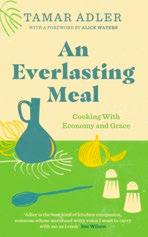
Excerpt from An Everlasting Meal— Cooking with Economy and Grace by Tamar Adler (published by Swift Press)

Wondrous Facts About The West End
For the long-running musical The Phantom of the Opera, it takes a total of two hours to apply the Phantom’s make-up before each show, and 30 minutes to remove it
A number of venues, such as the Palace Theatre and Her Majesty’s Theatre, were built either in their entirety, or partly, around 150-200 years ago
The Savoy Theatre is adjacent to luxury hotel The Savoy Hotel. As a consequence of this, the stage of the theatre is directly located beneath a swimming pool
JANUARY 2023 • 133 READER’S DIGEST
MONTH FILMOFTHE

TÁR
The Australian queen of cinema Cate Blanchett dazzles and terrifies in equal measure as the fictitious conductor Lydia Tár in this noteperfect, moody psychodrama. A former piano prodigy who has won numerous awards, written books and became the first woman conductor of the Berlin Philharmonic, Tár is at the peak of her career. She’s a spiky alpha female whom everyone addresses as “maestro”; she’s a manipulative and evasive partner to her wife, Sharon, yet at the same time, she’s incredibly seductive, whip-smart and wryly hilarious— qualities that many a student of hers has fallen prey to.
As she faces blackmail from one of her former protégés and tries to navigate her fascination with a recent addition to the orchestra—a
charmingly blunt Russian cellist Olga—she grows more and more out of touch with herself.
The film is a wonderfully stylish, ominous affair. Drenched in pale, neutral hues, and featuring the darkly expressive score by Oscar winner Hildur Guðnadóttir (whom Tár mentions as one of her female composer heroes at one point in the film), it’s restrained, sexy, unnerving, and totally absorbed by the intimidating yet utterly fascinating world of classical music it inhabits. It comes as no surprise that Cate Blanchett won the Best Actress prize at last year’s Venice Film Festival for playing this baffling enigma of a person that we’re inclined to dislike, yet can’t help but bask in the steely light of her presence.
Tar is out in UK cinemas on January 20
READERSDIGEST.CO.UK/CULTURE 134 • JANUARY 2023
H H H H H
ALSO OUT THIS MONTH
H H H H
WHAT’S LOVE GOT TO DO WITH IT?
Lily James and Shazad Latif star in what initially seems like a typical rom-com off the assembly line of romcoms: Zoe (played by James) is an aspiring documentary filmmaker looking for her next big project. An independent young woman, she’s constantly dodging her mother Cath’s (Emma Thompson, whose character deserves a spinoff of her own) efforts at playing cupid as well as numerous weird guys she meets on dating apps.
When her childhood friend Kazim (Latif) announces that he’s planning to enter an arranged marriage (or “assisted” as he insists they call it these days), Zoe is gobsmacked. What if they don’t share any interests? What if his Indian bride doesn’t want to move to London? Most importantly, what about love? Despite her reservations, she cajoles Kazim into letting her travel to Lahore for the wedding and document this unusual union.
Light-hearted fare on the surface, What’s Love Got to Do With It? proves to be a multifaceted story that tackles the subject of love and companionship with nuance and

flair, asking all the difficult questions that fairytale love stories tend to suppress with the “happily ever after”. Jemima Khan’s fabulous script is a thorough and compelling labour of love, the product of many years of rewrites and rumination, that deftly balances emotional fragility with impish cheek. The result is a story that elevates and fortifies the romcom genre—just ask the roomful of film critics who left the screening with a tear in their eye.
By Eva Mackevic
FILM
JANUARY 2023 • 135
Given the past year’s events, it’s perhaps unsurprising that TV should start looking East again. Russia 1985-1999: TraumaZone (iPlayer) marks a break from filmmaker Adam Curtis’s usual methodology: no contextualising voiceover, and minimal music; just extracts of the (often very) raw footage that BBC cameramen collected around the former Soviet Union at the end of the last century— footage of which we’d typically see but 15 seconds on the nightly news. Onscreen text pins down places and times, but largely the images speak for themselves. Many howl in rage and sorrow.

state is being divided up, hollowed out and sold off. Famous faces come and go— Gorbachev, Yeltsin, an agonised Mikhail Kalashnikov, inventor of the rifles that accelerated the damage as civil war erupted—but Curtis’s sympathies lie with the ordinary folks at the mercy of murderously coldblooded leadership.
Over seven jawdropping instalments, we witness Russia veering from oppressive organisation to extreme chaos, a whiplash ideological U-turn that benefitted an elite few while scattering the majority to the bears. Empty shelves and breadlines are the tip of the iceberg; everywhere you look, this

Scant surprise, too, that Russians should be returning to TV fiction’s naughty steps. Series two of Slow Horses (Apple TV+) finds our heroes pursuing FSB sleeper agents through a London drowning in filthy lucre; a dirty job, but Gary Oldman’s everdishevelled MI5 outcast Jackson Lamb is the man for it. Oldman remains one of this show’s great pleasures, cherishably precise about Lamb’s sloppiness. Hair hanging lank, tie even lanker, he’s an apt protector of a Britain that seems as careworn as the characters. John le Carré would surely have raised a glass—of scotch, mind, not vodka.
by Mike McCahill
Retro Pick:
The Great Season1/2 (YouTube)
Alternative Russian history, replaying Catherine and Peter the Great’s union as a rude, knockabout battle-of-the-sexes. Elle Fanning and Nicholas Hoult excel upfront
TELEVISION
136 • JANUARY 2023
Album Of The Month:
Mercy by John Cale

The world has taken a distinct dystopian turn in the decade since John Cale last released a solo record of original songs, and it shows. Cale has always pushed his music to strange, unnerving edges—which served The Velvet Underground’s anxious art rock well in the 1960s—but his newest album somehow manages to take his sound to new levels of dread.
Building on his experiments with electronic production on Shifty Adventures in Nookie Wood (2012), Mercy thankfully leaves the questionable autotune behind and concentrates instead on building paranoid soundscapes from eerie bleeps, ambient static and restrained drum loops. All this frames his fraught baritone vocals, which speak to the numerous trials of our times (“The grandeur that was Europe is sinking in the mud,” he sings in “Time Stands Still”, which Sylvan Esso lends her ethereal voice to; “What is the legal status of ice?” he ponders in a later track over a tempest of droning guitars and pounding drums).
The musicianship and production are doubtlessly well honed, but the tempo and vocals remain almost too consistent. One track passes seamlessly into the other—though collaborations with artists like Weyes Blood on “Story of Blood” and Animal Collective on “Everlasting Days” do produce some novel sounds. Cale certainly succeeds in composing a foreboding album to match today’s zeitgeist, but Mercy may not go down as his most memorable creation.
By Becca Inglis
5 Spotify Alternatives
New year, new music discovery routes
1. Shfl
A music discovery labyrinthe curated by humans. Critics and musicians have added their favourite albums, plus written up guides to aid browsing.
2. NPR’s Tiny Desk
A series of unplugged performances hosted behind a literal office desk by NPR.
3. Music-Map
Search for your favourite artist to generate a word cloud of similar musicians.
4. 8tracks
Recently revived internet radio station where playlists are curated by users. Browse by artist, genre, mood or activity.
5. Magic Playlist
Type in the title of a song to auto-generate a playlist. You can import this playlist to Spotify too.
MUSIC 121 JANUARY 2023 • 137
January Fiction
A true crime author digs into a grisly cult in our first book pick of the year
TheMysteriousCaseofthe AlpertonAngels
by Janice Hallett
Viper, £16.99
In recent years, Janice Hallett has been building a reputation not just as a new thriller writer, but, more often, as a writer of a new kind of thriller. By now, you might have thought there wasn’t much more to be done with the genre. Hallett, though, has managed it—by doing away with conventional narrative altogether and instead presenting the raw material in the shape of interview transcripts, text messages and email exchanges.
In theory, this could lead to a rather dry read. In practice, Hallett still provides everything you’d want from a great thriller. Along with an ever-

James Walton is a book reviewer and broadcaster, and has written and presented 17 series of the BBC Radio 4 literary quiz The Write Stuff
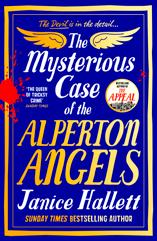
twisting plot, we get a full sense of the characters and a deep plunge into a world normally hidden from the rest of us. And online, of course, it’s even easier for people to not be what they seem…
In this case, the hidden world is that of true crime writing. The protagonist is Amanda Bailey, who lets us into the not-always-honourable tricks of her trade as she attempts to discover what happened two decades ago when a London-based cult persuaded teenage Holly and her boyfriend that their baby was the antichrist who needed to be sacrificed for the good of humanity. In the event, thanks to Holly, the baby survived, causing the cult members to commit suicide.
BOOKS
138 • JANUARY 2023
But was this what really happened? And whatever did, was it a matter of emotional manipulation, the genuinely supernatural or something darker and scarier still?
To find out, Amanda must first find the baby (adopted soon afterwards)— no simple task, given that anybody with any information tends to die suddenly under mysterious circumstances. There’s also the fact that she has a rival baby-seeker—a former journalistic colleague called Oliver.
Not everything about the book quite works. There are, for example, just a few too many plot strands, and even by the standards of hopeless fictional males, Oliver is a somewhat unbelievable pillock. Nevertheless, if you keep your wits about you, the overall result is a richly rewarding, blisteringly clever read that raises questions about human gullibility in all its forms, while still moving forward propulsively. n
Name the character
Can you guess the fictional character from these clues (and, of course, the fewer you need the better)?
1. The two extremely famous books she appeared in were illustrated by John Tenniel.
2. Her creator, who died 125 years ago this month, was an Oxford don.
3. The characters she meets include a mad hatter and a Cheshire cat.
Answer on p142
Paperbacks
Zelensky:ABiographyofUkraine’s WarLeader by Steven Derix and Marina Shelkunova (Canbury, £9.99). From comedian to global hero: the first biography for a Western audience.
GodmershamPark by Gill Hornby (Penguin, £9.99). Novel based on the real-life story of the governess hired by Jane Austen’s brother—and the touching friendship that developed between the two women. A total delight.
WriteItAllDown:HowtoPutYour LifeonthePage by Cathy Rentzenbrink (Bluebird. £9.99). Wise, kindly and practical guide for anybody wanting to write their memoirs.
TheSlowworm’sSong by Andrew Miller (Sceptre, £9.99). An ex-soldier now living quietly in Somerset confronts what he did during the Northern Ireland Troubles in this moving and compassionate novel.
Nellie:TheLifeand LovesofaDiva by Robert Wainwright (Allen & Unwin, £10.99). A gripping, pacy and sometimes gossipy biography of Australian opera singer Dame Nellie Melba.

RECOMMENDED READ:
Island Escape
Travel writer Robert Twigger goes adventuring in the Lake District’s sodden landscape
“Who doesn’t have a thing about islands?” writes Robert Twigger on page one of his terrific new book. The way he sees it, they haunt our imagination as places of opportunity to escape our everyday lives and have new adventures.
In this, as he acknowledges, he has been influenced since boyhood by Arthur Ransome’s Swallows and Amazons novels, where children get away from the adults and find freedom on the islands of the Lake District—all 36 of which he now sets out to visit.

of Britain’s most stunning, and sometimes still unspoiled, scenery.
In the past, Twigger has written acclaimed travelogues about the Himalayas, the Rocky Mountains and the Sahara. With 36 Islands, he brings the same wide-ranging curiosity and intelligence to bear as he walks, paddles and kayaks through some
He also takes full advantage of the “deceleration of time” that comes with mostly solitary journeying to ponder—among many other things—life as he approaches 60, determined not to turn into a curmudgeon (something, happily for the reader, he doesn’t always
BOOKS
140 • JANUARY 2023
achieve). Meanwhile, we learn a lot about Ransome too: one of the few British authors to have played chess with Vladimir Lenin.
Here, Twigger and his occasional travelling companion Mark are going from Ullswater to Windermere—a journey made trickier by Twigger’s plan to walk all the way dragging their stuff in a trolley and avoiding commercial campsites for more rugged spots. Until, that is, after a miserable night under wet canvas, they realise how much trudging still lies ahead…
““The next morning, amid more rain, we packed our cumbersome belongings. There was a campsite marked on the map a mile or two away and we speculated that it might have a bus stop, as it lay on the Kirkstone Pass road to Windermere. A certain desperation raised the idea of a potential bus stop to the level of a mythical water hole in the desert, or a gas station
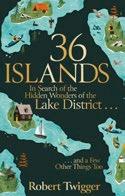
on Route 66 when your tank is showing empty.
This is one of the things I love about such trips as the one Mark and I were making: there were no rules and quite easily you could get into difficulties largely of your own making. It was like putting an adventure filter on modern life. We could have driven from Ullswater to Windermere, we could have taken a taxi. But by insisting on the loopy use of the trolley I’d elevated the journey into one of drama needing resolution.
Wobbling along the rocky track through the campsite, we mocked the sensible campers for paying £10 or more just to pitch their tents and use the toilet block. *Suckers!* We looked at them hoping for some kind of recognition of our superior status, but it was too early and too drizzly; most were loitering inside the open flaps of their tents while brushing their teeth and looking disconsolately out on the Lake District in its most natural state, i.e. sopping wet.
I went into the campsite office and asked if there was a bus stop nearby. There was! Only 100 metres away. And the kind, smiling woman also gave me a BUS TIMETABLE. This was, emotionally speaking, as exciting as getting a lift after nine hours of hitching, or finding that a train you had expected to have left is late and you can easily catch it. Our trip had been elevated into something teetering on the brink
READER’S DIGEST 36Islands:InSearchofthe Wondersofthe LakeDistrictand aFewOther ThingsTooby Robert Twigger is published by Weidenfeld & Nicolson at £20 JANUARY 2023 • 141
of disaster (walking 18 miles while dragging an infernal trolley over a high pass in rain-drenched fog)—a small disaster admittedly, but one we’d just averted by the kind offices of the campsite lady and the bus timetable, which I felt awfully clever for asking for and getting.
At the bus stop: two lads perhaps a third our age, respectful, thoughtful, studenty types, engaged with us in a discussion of the odd fact that the bus stopped at the *same stop* on the *same side* whatever direction it was coming in, the road being so narrow. That they knew the bus routine was very reassuring to me, as every time I catch an unfamiliar bus I’m assailed by the worry that it will drive by and ignore me. Often I will step into the road moments before a bus cruises to a halt—just to add extra weight to my flagging-down gestures.
It’s the same sort of micro-anxiety I get when a train is sitting at a platform and the sign says it is my train—but how do I know for sure?”
”Answer to Name the Character:
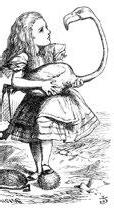
Alice in Alice’s Adventures in Wonderland and Through the Looking Glass by Lewis Carroll. The character was famously based on the real-life girl Alice Liddell, who later married a cricketer and died in 1934 aged 82.
Robert Twigger’s Favourite Lake District Books
PigeonPostby Arthur Ransome (1936). This was my favourite in Ransome’s Swallows and Amazons series, because it involved gold mining and the mysterious “Squashy Hat”—a man based on the early seaplane inventor Oscar Gnosspelius, who crashed one of his first planes on Windermere.
AWalkAroundtheLakes by Hunter Davies (1979). Davies writes so well that you hardly notice he is there. Yet his humour and insight shine out in every page, reflected back in the Lakeland subjects he writes about.
AGuideThroughtheDistrictof theLakes by William Wordsworth (1810, updated 1835). A classic, and still both useful and very readable.
TheWesternFells by Alfred Wainwright (1966). This was the last Lake District pictorial guide by the master and covers some fascinating and overlooked hills.
ThorsteinoftheMere:ASagaof theNorthmeninLakeland by WG Collingwood (1985). A rollicking Viking yarn set in the Lakes that also influenced Tolkien.
BOOKS
142 • JANUARY 2023
Books
THAT CHANGED MY LIFE
C K McDonnell is a former stand-up comedian and TV writer. His new book Love Will Tear Us Apart (part of The Stranger Times series) is released on February 9 (Bantam Press, £16.99)
The
Truth – Terry Pratchett


Picking just one Discworld novel has been a frankly tortuous process, but after much gnashing of teeth I’ve gone for this masterpiece. All of Pratchett’s work combines a deft comedic touch with a searing insight into the human condition. The Truth is him at the absolute peak of his powers, weaving his usual wit and wisdom with a beautifully stated case for the importance of a free press from a former journalist. I started reading him as a kid and his books have been a constant companion ever since. That rarity of a book that works for people of all ages.

The Power of the Dog–Don Winslow
This is a work of fiction that permanently changed my perspective on reality. First off, The Cartel trilogy that it begins is a brilliant sprawling narrative, which ranks up there with The Godfather as a masterpiece of storytelling. It is also researched in such fine detail that it strips bare the fallacy of “the war on drugs” and makes you question everything you thought about it. Finally, the writing—my god, the writing. There’s one scene in an earthquake that is the most visceral prose I’ve ever read. Beyond stunning.

Country
of the Blind –Christopher
Brookmyre
There are many people in publishing who will tell you that comedy and crime don’t mix— those people need to get smacked upside the head with a copy of this book, preferably the hardback. Brookmyre’s irascible cutting wit acts as the perfect seasoning to a seat-ofyour-pants thrill ride of a narrative that’ll have you staying up all night to finish it. Back when I had a proper job (well, I worked in IT, but still) a co-worker noted how I was always off sick the day after a new Chris Brookmyre came out. Guilty, your honour.
FOR MORE, GO TO READERSDIGEST.CO.UK/CULTURE
JANUARY 2023 • 143
James O’Malley on how “deepfakes” ushered in a new generation of digital fakery
Don’t Believe Your Eyes
If you’re a geek like I am, then you’ll remember the dramatic moment at the end of 2016 Star Wars prequel Rogue One when just before the closing credits we catch a brief glimpse of a fresh-faced Princess Leia, looking as though Carrie Fisher had just stepped out of a time machine from 1977.
The digital recreation was a big technical achievement. It was almost perfect, and was clearly the result of thousands of hours of work by the animators and artists working on the film.
But just two years later, a new technology arrived that would render Rogue One almost quaint: the “Deepfake”. Suddenly, instead of requiring skilled artists, digital face-swaps could be created with little more than a bedroom PC. And the technology can be used to put words in the mouth of, well, pretty much anyone.
For example, one famous early deepfake saw a video of President Obama modified to show him calling Donald Trump a “total and complete dips**t." And in 2020, Channel 4 created a similar fake video of the
Queen for its annual Alternative Christmas Message.
The way deepfakes are made is by using the similar clever “deep learning” techniques as the AI facerecognition on your phone. You “train” the deepfake app by showing it some video footage of your target, and it will crunch through the images to spot patterns and identify the person’s facial features and how the face looks when smiling, or when certain sounds are made, and so on. Then you show it a video of another face saying the things you want the fake to say, and it will use that as a template to generate new images that match mouth movements, eyebrows and other facial ticks—making it look as though your target really was saying those shocking things.
Unsurprisingly, the technology has already led to some mischief. There are already countless viral videos where Nicolas Cage has been "deepfaked" to star as Indiana Jones, James Bond and so on. And with grim inevitability, many female celebrities have been deepfaked into much worse.
144 • JANUARY 2023
TECHNOLOGY
Perhaps the area where there is most concern about the new technology though is in politics. What is striking about deepfakes is that almost anyone with a little technical know-how can make them. You can literally download the software to do it for free, and have it running in minutes. And it is easy to imagine how someone with bad intentions could use the technology to cause harm. Imagine a video of President Biden or President Putin announcing that he was launching nuclear missiles… Let’s hope that Washington and Moscow don’t respond in kind too hastily.

UNSURPRISINGLY, THE TECHNOLOGY HAS ALREADY LED TO SOME MISCHIEF
deepfake on tens of millions of images across the web and can generate entirely new images from just a few keywords. For example, an app called “Stable Diffusion”, which like the deepfake app can run on almost any computer, can be fed a cue line, say “Princess Leia in the style of Monet”, and it will generate almost exactly that (image above)—no humans required. However, here’s the strange thing. I’m not actually that worried about deepfakes and AI-art tools being used to spread fraud and misinformation. Why? Because we don’t actually need them.
In fact, both the Obama and Queen videos were designed, in a sense, to warn of the dangers that deepfakes could pose. Because usually we think of “video evidence” as the unimpeachable truth—but now, the worry goes, how can we trust anything we see, if it can, in theory, be faked?
And the scale of the challenge from AI-generated imagery is, if anything, getting even worse. Last year saw an explosion of new AI tools that have been "trained" like a
We’ve all clicked "like" on an image purporting to show the crowd at a protest, even though it’s a photo of people at an entirely different gathering. And we’ve all shared a made-up news story, just because it is unflattering to a politician we don’t like. So we don’t need sophisticated new technical wizardry to fool ourselves into believing something we really want to believe. Even if deepfakes do become widespread, it won’t make much difference—we’re already too good at tricking ourselves. n
145
JANUARY 2023 •
CHANGELINGS
Each of the three lines of letters below spell the names of Olympic sports, but the letters have been mixed up. Four letters from the first word are now in the third line, four letters from the third word are in the second line and four letters from the second word are in the first line. The remaining letters are in their original place. What are the words?
Go to readersdigest.co.uk/contact-us or facebook.com/readersdigestuk
Our four-year-old grandson came to visit recently. As he had been misbehaving, his granny told him that Father Christmas would not come if he was naughty.
He looked up at the ceiling and said, "There are no cameras!"
STEWART PETHER, Abingdon-on-Thames
My neighbour has three cats. She lives on her own, as her husband died nearly two years ago.
One of the cats likes to jump up on her shoulder, but as she was in the bathroom she did not want him there. She put him out and locked the door.
Unfortunately, she knocked the key, and it slipped out under the door. She was locked in, and she did not have her mobile phone with her, so she was stuck. She did not have a watch on either, so she did not know for how long she was locked in or how she would get out.
She tried to move the key nearer the door, but failed, so she played a
Win £30 for your true, funny stories! You Couldn’t Make It Up 146 • JANUARY 2023
FUN & GAMES AND
TO…
ANSWER TO DECEMBER'S PRIZE QUESTION FRIENDS Each can have the prefix UNDER- to form a new word THE FIRST CORRECT ANSWER WE PICK WINS £50!* Email excerpts@readersdigest.co.uk
THE £50 GOES
JOHN HORTON, Oldham £50 PRIZE QUESTION
GOLMESBCLL EYTNAHTINS PVNLATYLOA
game with the cat and a stick. The cat moved the key nearer the door so she could reach it.
“Bingo!” She was rescued by the cat. “Talk of a get-out claws!”
IDA LEE, Cork
My husband and I are both in our seventies but enjoy being quite fit with reasonable health. I do have some food intolerances, so I have to watch what I eat. From time to time something I have eaten will make me quite unwell.
I had just had a particularly difficult afternoon with this problem, but was beginning to improve, when our daughter messaged to see what we were up to. As usual she also asked how we were.
I started to say we were OK, but felt I should maybe admit that I had been unwell. I did not want it to sound too depressing, so I decided to try and sound upbeat about it. In my reply I said we were OK, but that I had had a very lively afternoon with my old gut. I also said that things were now calming down, and for good measure added a “Phew!” at the end.
Unfortunately I only noticed after I had sent the message that the corrective text on my phone had changed my word “gut” to “guy!”
MORAG HAY, Shetland
My daughter was driving my threeyear-old granddaughter Evie to nursery. "There is a new girl starting

at nursery soon," Jacqui told Evie. "Her name is Evie too. If there are two Evies in your class would you like to be known as Evie, Evelyn, Eve or Ev?"
Evie thought about it for a little while, and then triumphantly announced, "John!"
PAT COURT, Oxfordshire
I was surprised to find my friend had brought back a large packet of washing powder from a luxury holiday in the Bahamas. He explained that this was the brand his hotel used and the smell brought back wonderful memories of his trip.
After spending a cold winter at home, he booked another holiday but said he was going to ask the hotel to use a different wash powder, because the first one now reminded him of the cold and wet back home.
ANDREW BERRY, Lincoln
JANUARY 2023 • 147
cartoon
Henry Dean-Osgood
by
TRIVIA
By Samantha Rideout
1. What condiment was in short supply last year across France, despite being named after a French city?
2. The UK’s Norland College is known for training elite providers of what service?
3. How many cells do bacteria have?
4. Volunteers receive anesthesia when they donate which of the following: blood, bone marrow or plasma?
5. Who recently became the third person to earn a billion dollars by making films, joining Steven Spielberg and George Lucas?
6. Players in what professional sports league perform such signature celebratory moves as “Ice in My Veins,” “Night Night” and “The Silencer”?
8. Roughly 255 million years ago, India, Africa and Australia were all touching the land that is now which continent?
9. What Canadian Oscar nominee said, “Bullying puts you in a place where, later, you have so much unlearning to do”?
10. What European city suffered a devastating earthquake in 1755?
11. What is the world’s bestselling studio album by a solo female musical artist?

12. What was the ninth-century Japanese Emperor Uda describing when he wrote, “When it lies down, it curls in a circle like a coin”?
13. Zara Rutherford and her brother Mack recently became the youngest woman and the youngest person, respectively, to do what?
15. Billions of the people alive today wouldn’t have food to eat if it weren’t for ammonia, a fertiliser compound made by extracting which element from the air?
14. What tabletop-game franchise of Stranger Things fame will get a new film this year?
7. Which cetaceans recently began attacking small boats, sometimes sinking them? Answers: 1. Dijon mustard. 2. Nannying. 3. One cell each. 4. Bone marrow. 5. Peter Jackson. 6. The NBA. 7. Orcas. Scientists don’t fully understand this behaviour, but it may be a playful “fad.” 8. Antarctica. 9. Elliot Page. 10. Lisbon. 11. Shania Twain’s Come on Over 12. A cat. 13. Fly solo around the world. 14. Dungeons & .Dragons 15. Nitrogen.
photo: ©getty images
148 • JANUARY 2023
Word Power
Language can capture the outdoors just as vividly as a point-and-shoot camera. Here are some words to help you zoom in on every detail of the natural world
BY ROB LUTES
1. gloam—A: twilight. B: cold, treeless area. C: flat-topped rock.
2. pea-souper—A: algae-laden body of water. B: dark, moonless night. C: thick, yellow fog.
3. dingle—A: small wooded valley. B: raccoon nest. C: feral dog.
4. slatch—A: patch of forest blackened by fire. B: area of quiet water between two breaking waves. C: narrow channel in a river.
5. copse—A: thicket of small trees or shrubs. B: narrow cave in a rock face. C: rodent burrow.
6. moonbow—A: crescent-shaped white flower. B: rainbow made by moonlight. C: semi-translucent long-horned beetle.
7. estuary—A: area where a river flows into the sea. B: small islet that serves as a stopover for migrating birds. C: open area in a forest left after a mature tree has fallen.
8. derecho—A: sandbar connecting two islands. B: natural hot spring. C: fast-moving windstorms.
9. sylva—A: forest trees of a particular region. B: luminous phytoplankton. C: white crystals found in sandy soil.
10. ventifact—A: swampy area. B: stone polished by windblown sand. C: windy outcropping.
11. whitewash—A: stains from bird excrement. B: vegetation beneath a forest’s canopy. C: certain kind of fungi.
12. snag—A: edible roots of certain water plants. B: dead tree that’s still standing. C: noise of wind through the trees.
13. tarn—A: mountain lake or pool. B: unfrozen patch of ground. C: narrow inlet.
14. deciduous—A: shedding leaves annually. B: blooming every other year. C: desert-like.
15. erratics—A: habitat for laying eggs on land. B: glacier-transported boulders that differ from local bedrock. C: particular weave of spiderweb.
JANUARY 2023 • 149 FUN AND GAMES
IT PAYS TO INCREASE YOUR
Answers
1. gloam—[A] twilight; Ricardo loved to watch the bats in the gloam of a summer evening.
2. pea-souper—[C] thick, yellow fog; It was a typical day in the old port city, right down to the peasouper smothering the skyline.
3. dingle—[A] small wooded valley; Cecile tramped to the bottom of the dingle to dangle her feet in the stream, as she had done as a child.
4. slatch—[B] area of quiet water between two breaking waves; With winds churning the ocean, we carefully launched the boat in a slatch and quickly began paddling to the island.
5. copse—[A] thicket of small trees or shrubs; They followed the deer to the edge of a copse at the far end of the property, where the creature disappeared from sight.
6. moonbow—[B] rainbow made by moonlight; When the clouds cleared around midnight, Gina spotted a moonbow—a shimmering white arc in the sky.
7. estuary —[A] area where a river flows into the sea; Rich in nutrients, the estuary is usually densely packed with shellfish.
8. derecho—[C] fast-moving windstorms; Jerry’s video captured
the derecho as it cut a path of destruction across several farms.
9. sylva—[A] forest trees of a particular region; Not historically part of the sylva, the mountain ash was visible for miles.
10. ventifact—[B] stone polished by windblown sand; I spotted a ventifact in the shape of a pyramid.
11. whitewash—[A] stains from bird excrement; Fresh whitewash near last year’s nest told us that the owl was back.
12. snag—[B] dead tree that’s still standing; In the wild, Mihka explained, snags provide safe nesting sites for a wide variety of species.
13. tarn—[A] mountain lake or pool; The coldest tarn Levi ever swam in was in Kananaskis, Alta.
14. deciduous—[A] shedding leaves annually; With 14 deciduous trees in his backyard, Hugo spends a week each fall just raking.
15. erratics—[B] glacier-transported boulders that differ from local bedrock; The white and pink erratics at Chimney Bay, NL, look like dinosaur eggs.
VOCABULARY RATINGS
7–10: fair 11–12: good 13–15: excellent
WORD POWER
150 • JANUARY 2023
Reader’s Digest Competitions
–
Enter today for your chance to win!

You will find this photograph somewhere inside this issue of the Reader’s Digest magazine, but can you find it? Once you have, simply write the page number on your entry form, or enter online.
Competitions – How to enter
Enter By Post Or Online – January 2023 closing date for entries: 16 January 2023
Online: readersdigest.co.uk/magazine-competitions
By Post:
Complete the entry form and send via post to Reader’s Digest Competitions, Warners Group Publications, West Street, Bourne, PE10 9PH
COMPETITION ENTRY RULES
Competitions are open to residents of the UK, Eire and BFPOs, aged 18 or over, except Reader’s Digest employees and any associated partners or affiliated companies. No purchase necessary. Entries can be made via post or online. There is no cash alternative and prizes are not transferable. Only one entry per person. Winning entries will be chosen at random and winners will be notified by email or post. Winners must agree to publication of their name, age and photo. Your information will only be used in accordance with our privacy policy. Entry implies acceptance of these rules. Full terms can be viewed online at readersdigest.co.uk/ competition-rules.
Fill in all your answers below: January 2023 Entry Form
(enter as many as you like – one entry per competition per person)
Page 67 Theatre Tokens
Page 94 Butcombe Inn Break
Page 116 Wivenhoe House Break
Page 126 Prize Crossword
Page 127 Winter Wordwheel
Page 151 Photo Finder
Name:
Address:
Postcode:
Telephone:
Email:
n * I opt-in to receive the reader’s digest email newsletter for offers and competitions
n * I opt-in to be contacted by third party competition promoters about future offers and promotions (*please tick)
COMPETITIONS
WIN! 3 X £50
Photo Finder
BRAINTEASERS
Black-and-White Maze
Easy In this maze, start on the black square in the topleft corner and end on the one in the lower-right corner as you follow these rules:
1. Move from cell to adjacent cell up, down or sideways, but never diagonally.
2. The cell you move to must contain the same shape (square or circle), the same shading (black or white), or both the same shape and the same shading as the one you’re currently on. Eg, if you’re on a white circle, you can move to an adjacent cell with a white circle, a black circle or a white square. Can you find the path?
Do the Math
Difficult Use five mathematical symbols (+, -, x, ÷, and √) to complete the equation. Use each symbol only once, and ignore the standard order of operations. ? 25 ? 5 ? 9 ? 32
152 • JANUARY 2023 FUN & GAMES
BLACK-AND-WHITE MAZE (FRASER SIMPSON ). do the math (marcel danesi).
Happy Campers
Easy Family camping trips usually involve some sort of practical joke and, this year, the prank is on you. Your family has hidden your sleeping bag in one of four tents. Outside each they put a sign, but only one sign is truthful. Can you determine which sign that is, and which tent your sleeping bag is in?
It’s not in here. It’s not in the blue tent.
It’s in the yellow tent.
Wheel of Profit
MEDiuM You must bet £10 to spin the wheel, and if the wheel spins to the colour you bet on, you win £10 multiplied by the number shown. If you always bet on green and your friend always bets on red, who is more likely to have made a bigger profit after six spins?
Symbolism
It’s not in here.
Difficult Which symbol (A, B, C, or D) is missing from the grid below?
For answers, turn to page 155
JANUARY 2023 • 153
happy campers (emily goodman). wheel of profit (sue dohrin). symbolism (marcel danesi)
x10 x3 x4 x3 x3 x4
? A B C D
CROSSWISE
Test your general knowledge. Answers on p158
ACROSS
8 Smallest state down under (8)
9 You can’t get out this way (2,4)
10 Sultanate in Borneo (6)
11 Kind of ale (3,5)
12 Switch positions (2,3,3)
13 Victorious Second World War force at Midway (1,1,4)
14 Broad appeal (7,8)
18 Knight cap? (6)
20 Or go West, badly weakened (3,5)
23 Old Scratch (3,5)
24 Hanseatic port on the Weser (6)
25 They are acquired on marriage (2-4)
26 Author of The Rivals (8) DOWN 1 Sterile (6) 2 Lofty place (8) 3 Dark blue powder (6) 4 An enlarger (10,5) 5 Coach (8) 6 Impulse transmitter (6) 7 Delivery professionals (8)
15 Type of seal (8) 16 Efforts to change society (8)
17 Appeared with Nyasaland on stamps, once (8)
19 Dividing line in a triangle (6)
21 Turn these to gain an advantage (6) 22 Oscillate (3-3)
154 • JANUARY 2023 BRAINTEASERS
ANSWERS
Black and White Maze
SUDOKU
By Jeff Widderich
Do the Math
√25 + 5 - 9 x 32 ÷ 8 = 4 or √25 - 5 x 9 + 32 ÷ 8 = 4
Happy Campers
The sign outside the red tent is the only one that can be true without creating contradictions, so the blue tent is correct.
Wheel of Profit
Your friend can expect to win once after six spins (for £100); you can expect to win three times (£90).
Symbolism
A. The symbols on the top line are in reverse order on the bottom line; those on the second line down are in reverse order on the second line from the bottom; and so on. 1
6 8
6
3 9
To Solve This Puzzle
Put a number from 1 to 9 in each empty square so that: ✦ every horizontal row and vertical column contains all nine numbers (1-9) without repeating any of them;
✦ each of the outlined 3 x 3 boxes has all nine numbers, none repeated.
SOLUTION
JANUARY 2023 • 155 READER’S DIGEST
8
2 4
4
2 3 4 7
6 4 3 7 1 4 8 9 7 4 2 1 4 9 7 6 3 2 5 8 7 6 5 8 2 4 1 3 9 8 3 2 9 1 5 4 6 7 6 5 8 1 4 7 9 2 3 2 1 4 3 9 6 7 8 5 3 9 7 2 5 8 6 1 4 9 8 3 6 7 2 5 4 1 5 2 1 4 8 9 3 7 6 4 7 6 5 3 1 8 9 2
1 1
8
Laugh!
WIN
£30 for every reader’s joke we publish!
Go to readersdigest.co.uk/contact-us or facebook.com/readersdigestuk
I went out for a coffee but couldn’t find decafe.
MICHAEL GOLDSTONE, Manchester
A traffic policeman stops Maggie and asks to see her driving licence. “Lady, it says here that you should be wearing glasses when driving.”
“Well, officer,” explains Maggie, “I have contacts.”
JENNIE GARDNER, Bath
What do you call a dalmatian who doesn’t know where all her spots are? Dotty!
I went to see a modern-day Johnny Cash tribute show the other day. The performer was called Johnny Credit Card.
DAVID WATTS
I was really looking forward to my new job on Noah’s Ark—until I found out they wanted me to work on the poop deck!
AMANDA
M GRANT, Suffolk
“Lady, I don’t care who you know, you’re still going to get a ticket.”
GILLY HOLLANDS, Hertfordshire
I can’t remember how to write the numbers one, 1000, 51, six or 500 in Roman numerals. I’M LIVID.
JOSEPHINE DRURY, Flintshire
I met a beautiful girl at a European pop music event. I told her, “You’re a vision!”
MARK ATTWOOD, Hampshire
156 • JANUARY 2023
FUN & GAMES
Love books as much as you love laughs?
These bookish jokes are sure to tickle your funny bone
Bibliophile Humour
I’ve just had a new of the Rings kitchen installed. The grill and the oven are great but I really like the hob bit.

When F Scott Fitzgerald got a bad cold, he went to bed with a bottle of whisky and within a couple of hours it had gone.
Although of course he still had a cold.
What happens if you get caught gluing the pages of a biography together? Multiple back-to-back life sentences.
I was driving down the M1 motorway yesterday and saw a man in the outside lane reading a novel while he was overtaking.
I was so angry that I stopped texting and gave him a beep.
I had a really bad day today. I had two volumes of the collected works of Hegel on the back seat of my car and somebody smashed the side window and left two more.
What do you call a bookworm who can’t stop reading about strong female characters? A heroine addict!
I’ve just read a book all about Stockholm Syndrome. It wasn’t much fun at the beginning, but by the time I got to the end I thought it was amazing.
Doctor: You’ve broken your fingers but we’ll be able to sort them out.
Patient: Will I be able to write a book once they’re fixed?
Doctor: Absolutely.
Patient: Excellent, because I couldn’t manage it before.
What do you get if you cross a writer with a deadline? A really clean house.
JANUARY 2023 • 157
Did you know that Aristophanes once wrote a drama all about puns? It was a play on words.
Ben Travers walks into a bar holding a huge script. The barman asks: “Why the long farce?”
Pádraig comes to England and applies for a job on a building site.
To test his knowledge, the foreman asks: “What’s the difference between a joist and a girder?” “Ah, that’s an easy one,” says Pádraig. “The first wrote Ulysses and the other wrote Faust.”
I’ve just begun a speed-reading course. Last night I read Infinite Jest in 15 seconds. I know it’s only two words, but I’m still a beginner.
I couldn’t find the Mills & Boon section at the library so I asked the librarian and she told me I’d been looking for love in all the wrong places.
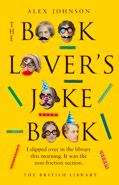
Extracted from The Book Lover’s Joke Book by Alex Johnson, published by British Library Publishing at £9.99
CROSSWORD ANSWERS
I Used To Think…

Twitter users share the funny things they used to think were true
@costco_scoli: …that the sign in stores “Shoplifters will be prosecuted” meant they would be executed. I never thought of stealing after that.
@Luv2Hike_YY: …that the audience laughter you hear on sitcoms was actually people in their homes laughing and I could hear them through the TV. So I would laugh at random times during the show to stand out.
@fvsfan: …that in pictures of KFC’s Colonel Sanders, the bowtie was his arms and legs.
@TammyOfsanik: …My daughter, as a toddler, used to think that prayers ended with an emphatic “Oh man!” instead of Amen.
Across: 8 Tasmania, 9 No exit, 10 Brunei, 11 Nut brown, 12 On and off, 13 U S Navy, 14 General interest, 18 Helmet, 20 Got worse, 23 The Devil, 24 Bremen, 25 In-laws, 26 Sheridan.
Down: 1 Barren, 2 Eminence, 3 Indigo, 4 Magnifying glass, 5 Instruct, 6 Neuron, 7 Midwives, 15 Elephant, 16 Activism, 17 Rhodesia, 19 Median, 21 Tables, 22 See-saw.
LAUGH
158 • JANUARY 2023
Beat the Cartoonist!

Think of a witty caption for this cartoon—the three best suggestions, along with the cartoonist’s original, will be posted on our website in mid-January. If your entry gets the most votes, you’ll win £50. Submit to captions@readersdigest.co.uk by January 7. We’ll announce the winner in our February issue.
NOVEMBER
WINNER

Our cartoonist’s caption, “Blame the cost of living crisis” failed to beat our reader Nicola Richardson this month, who won the vote with her caption, “I know it looks expensive, but it’s actually a realterm price cut.” Congratulations, Nicola!
The beloved astrophysicist superstar looks back on his childhood and career IN THE FEBRUARY ISSUE Neil deGrasse Tyson I REMEMBER…


TRACY-ANN OBERMAN: IF I RULED THE WORLD
The world according to the UK actor and playwright
Social Masking:
People-pleasing behaviour or a sign of something more?
READER’S DIGEST JANUARY 2023 • 159
cartoons by Royston Robertson
GOOD NEWS
from around the World

ONE-OF-A-KIND
ROMAN ROAD
DISCOVERED IN A FIELD IN BRITAIN
If asked to name a place where you might make a once-in-a-lifetime archaeological discovery, your mind may go to the pyramids of Egypt or the peaks of the Andes… not a field in Worcestershire.
But a field in Worcestershire is exactly where workmen recently discovered what is thought to be a Roman road up to 2,000 years old! The road was discovered during routine waterworks maintenance by Severn Trent. Archaeological experts from Wychavon District Council were called to the scene and immediately recognised the finding’s significance.
Wychavon District Council’s archaeology officer, Aidan Smyth said, “When I first saw it, it took my breath away. If proven to be from the first century AD, it would be beyond rare.”
Experts say it is constructed in a traditional Roman technique, with similar roads only being found in Rome and Pompeii. Ruts in the stones show that it was used by carts for a long time. A team from Historic England is expected to investigate further to determine the exact origin of the structure.
This is actually not the first significant historical discovery in Worcestershire. A number of possible forts have been suggested in Worcestershire since the 1950s, and Worcester is thought to have been the site for the Roman town of Vertis.
It is too early to say with 100 per cent certainty that the road is Roman, but even if it is a medieval road it will still be a nationally significant discovery. If it is indeed a first-century Roman road, then it is the only one of its kind in Britain—that we know of, anyway! Who knows what we’ll find next in a field in, say, Lincolnshire?
by Alice GAwthrop
160 • JANUARY 2023
“ I trust Wellman for my health and have relied




















UK’S NO.1 VITAMINS † LIFE CARE FOR A LIFETIME TM SCIENCE OF HEALTHY AGEINGTM 30 nutrients To help maintain health & vitality With zinc to help maintain normal vision, immune & cognitive function From , Superdrug, Holland & Barrett, supermarkets, health stores, pharmacies & WELLMAN.CO.UK
Expert support for 70+
man
white
Martin Bell OBE
Veteran BBC foreign correspondent for over 30 years & former independent MP ‘The
in the
suit’, age 84 years
on it for years” †Nielsen GB ScanTrack UK Total Coverage Value & Unit Retail Sales 52 w/e 8/10/22. To verify contact Vitabiotics Ltd, 1 Apsley Way, London, NW2 7HF. *UK’s No.1 men’s supplement brand. Also available: Wellwoman 70+

20% off PLUS FREE DELIVERY AND RETURNS Use code: RDD22 MORLANDSSHEEPSKIN.CO.UK | 0333 400 9922 OFFER EXPIRES: 21ST DECEMBER 2022 M018 AYR£59 This offer is only valid on full-priced items and cannot be used in conjunction with any other offer. Standard free delivery to UK mainland only. Quality craftsmanship for over 150 years




















 Amie Yardley, Cambridgeshire
Amie Yardley, Cambridgeshire

















































































 By Markham Heid
By Markham Heid













































































































